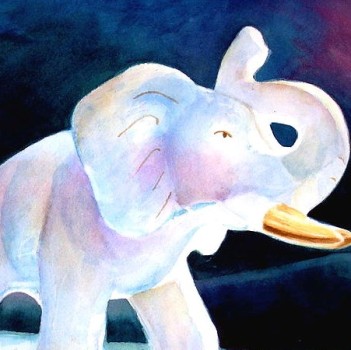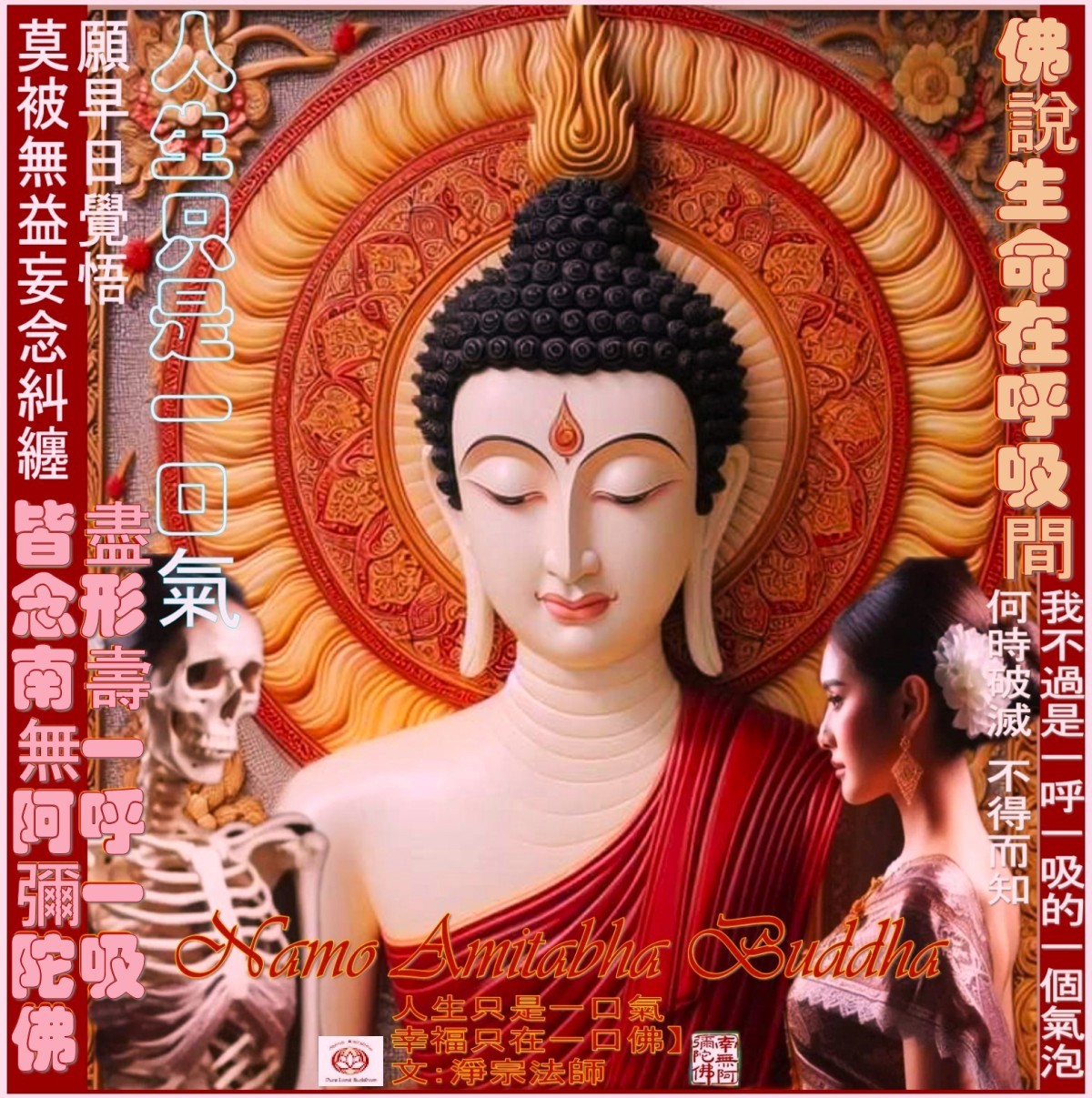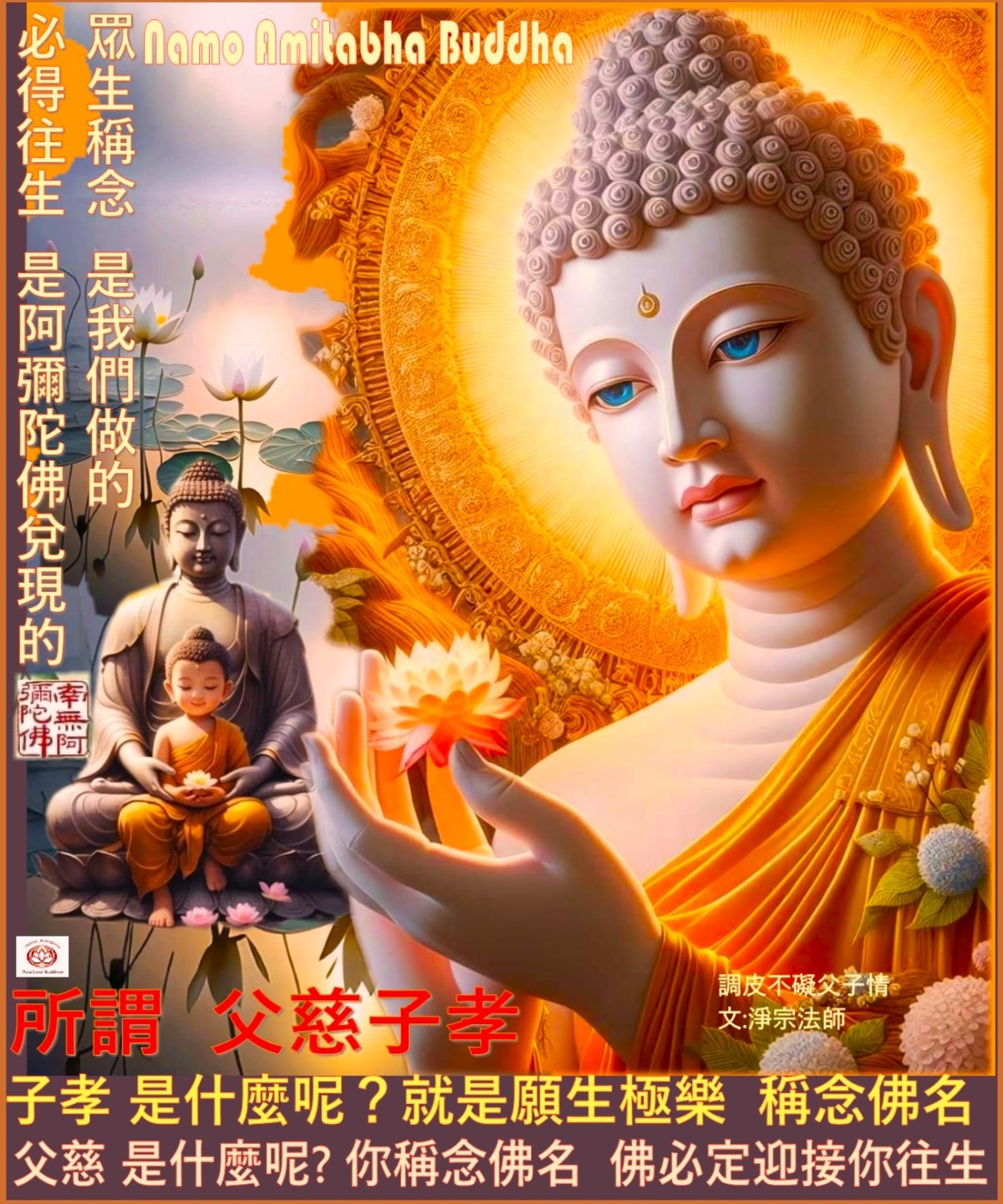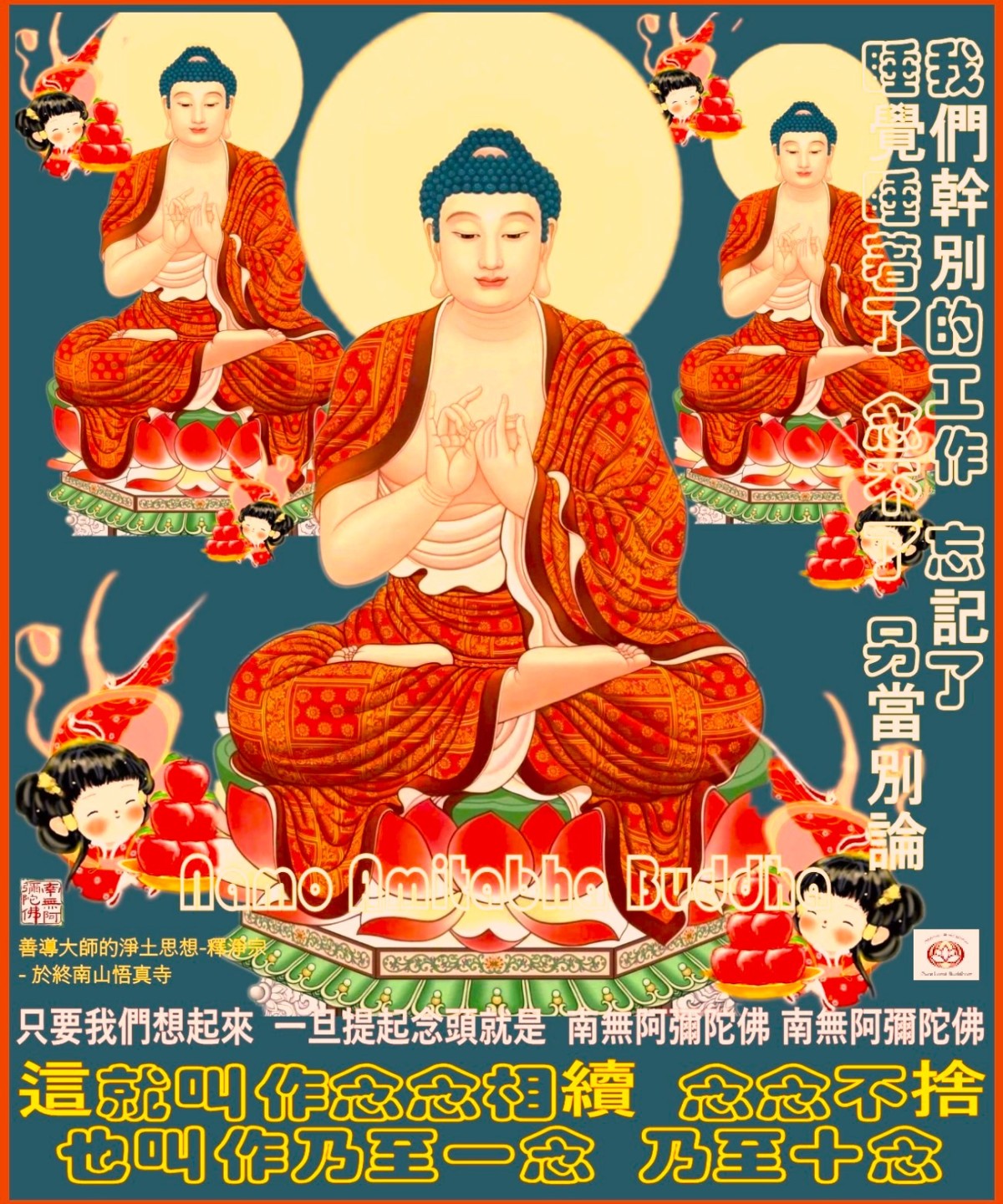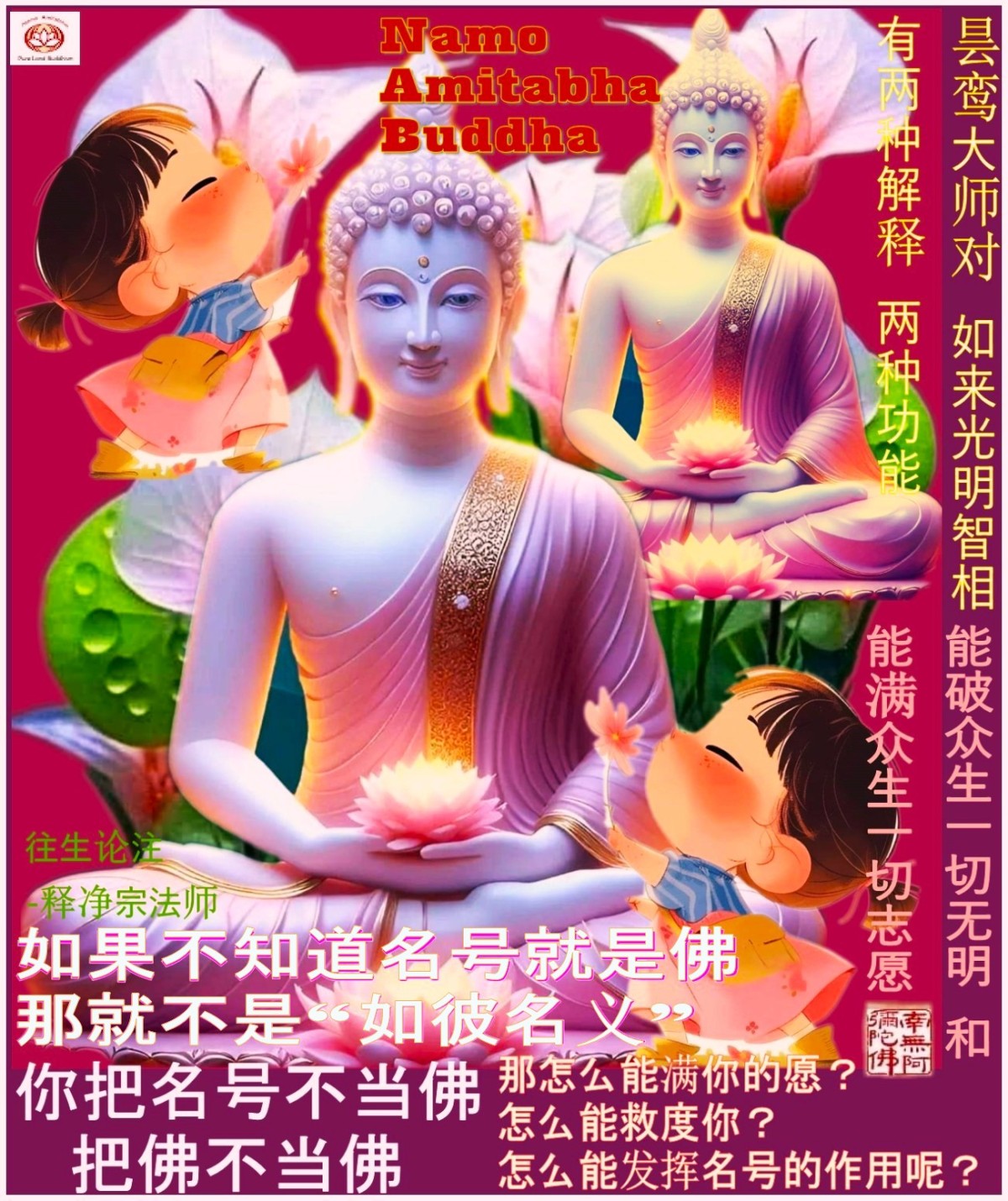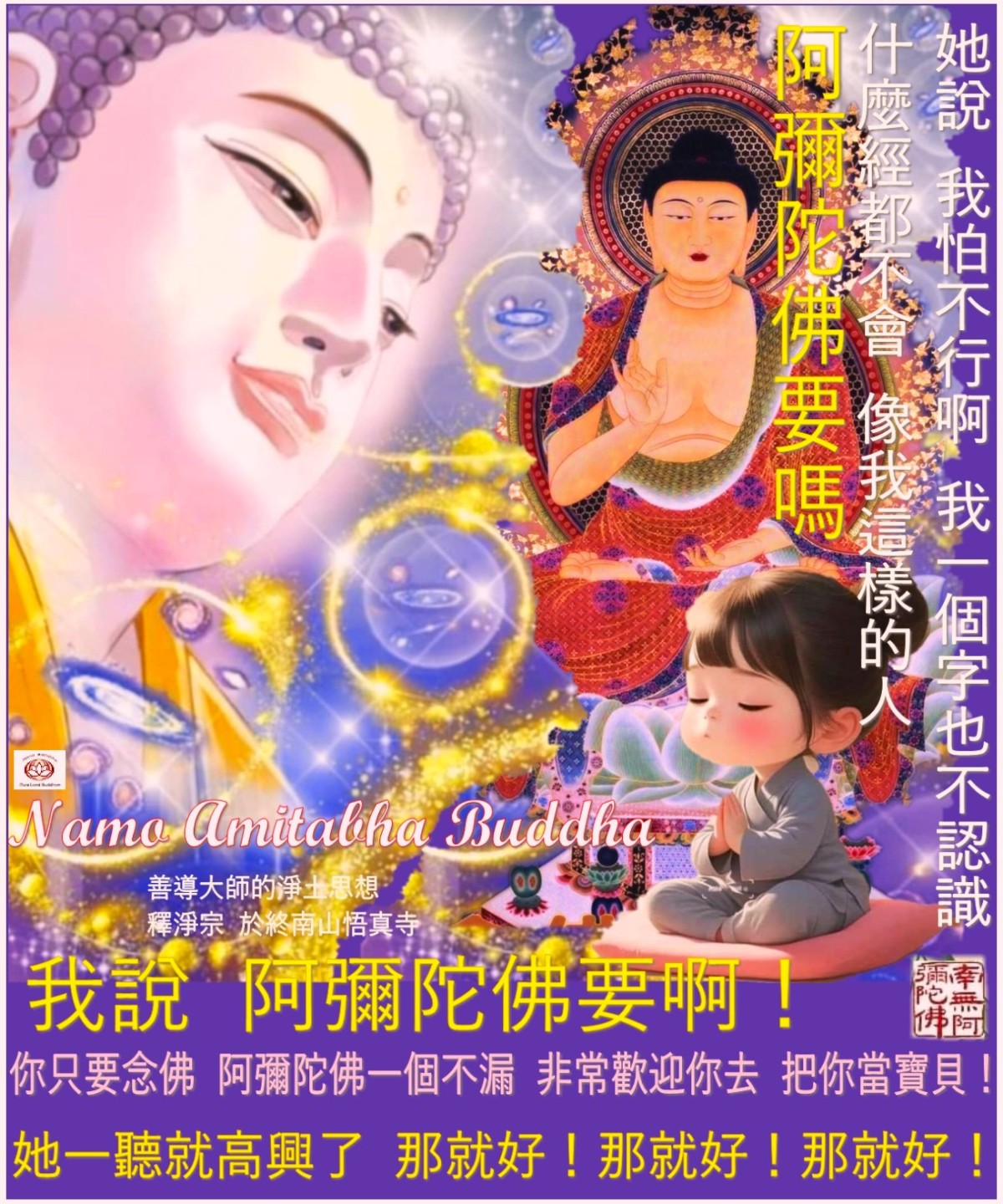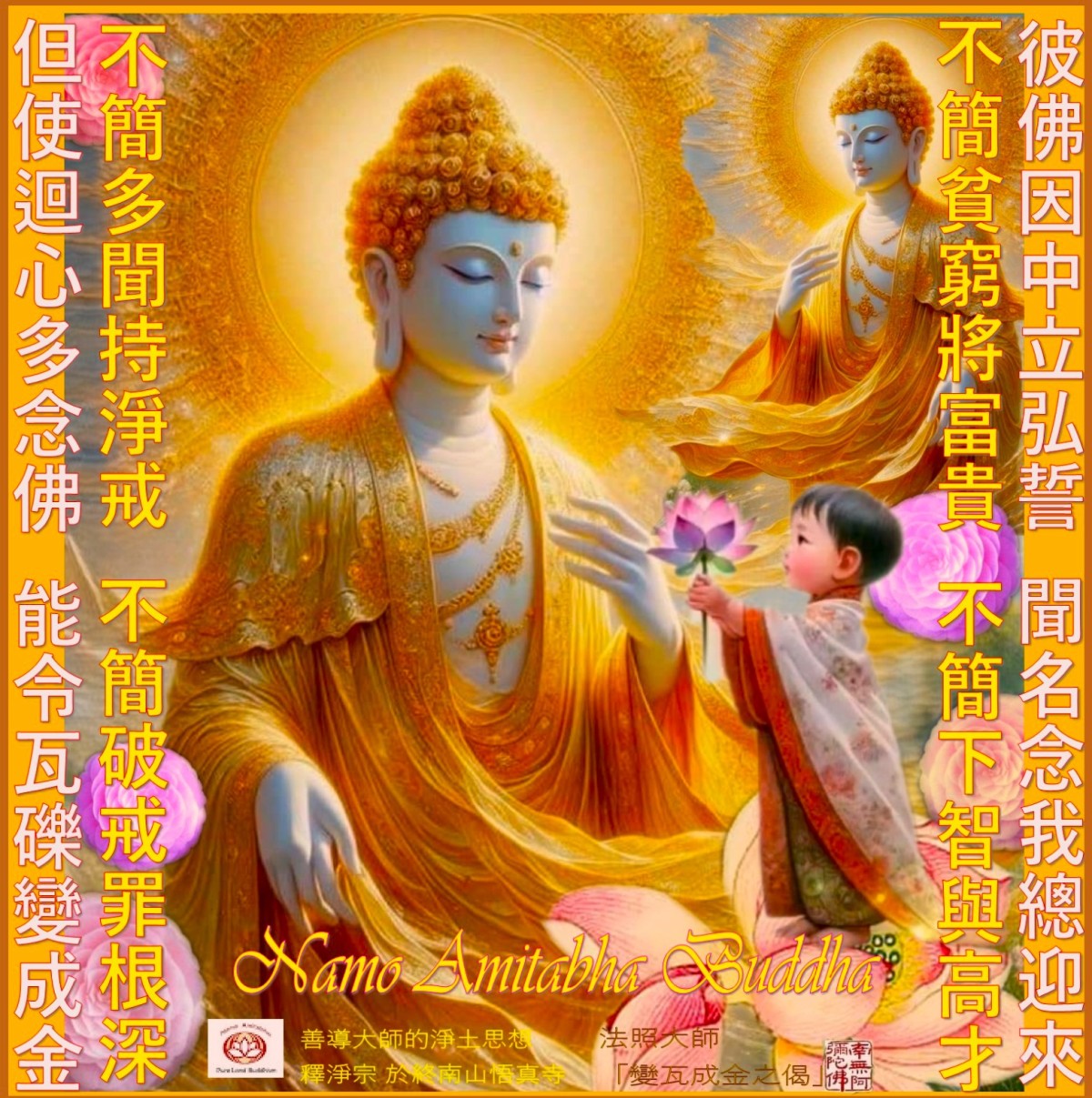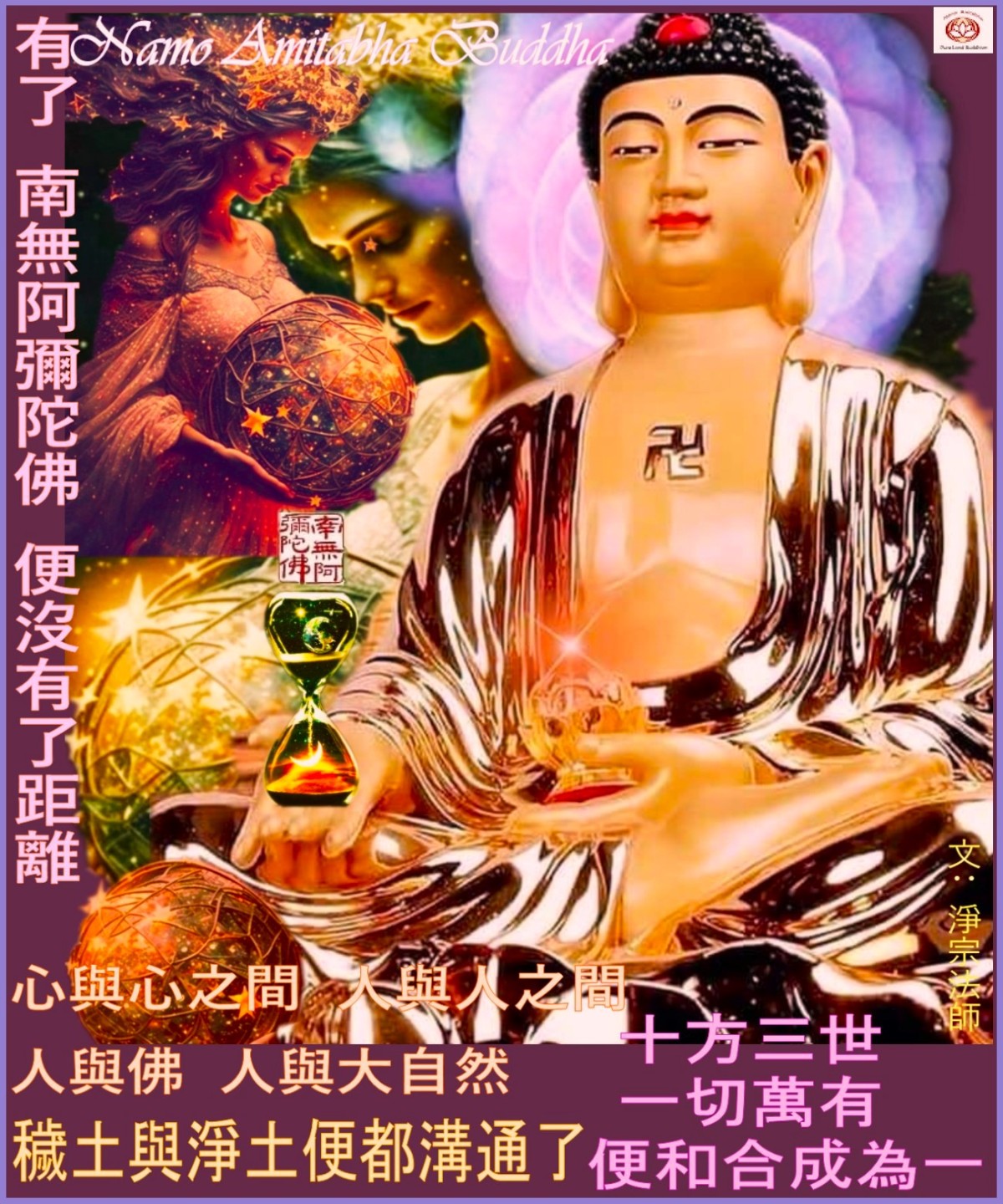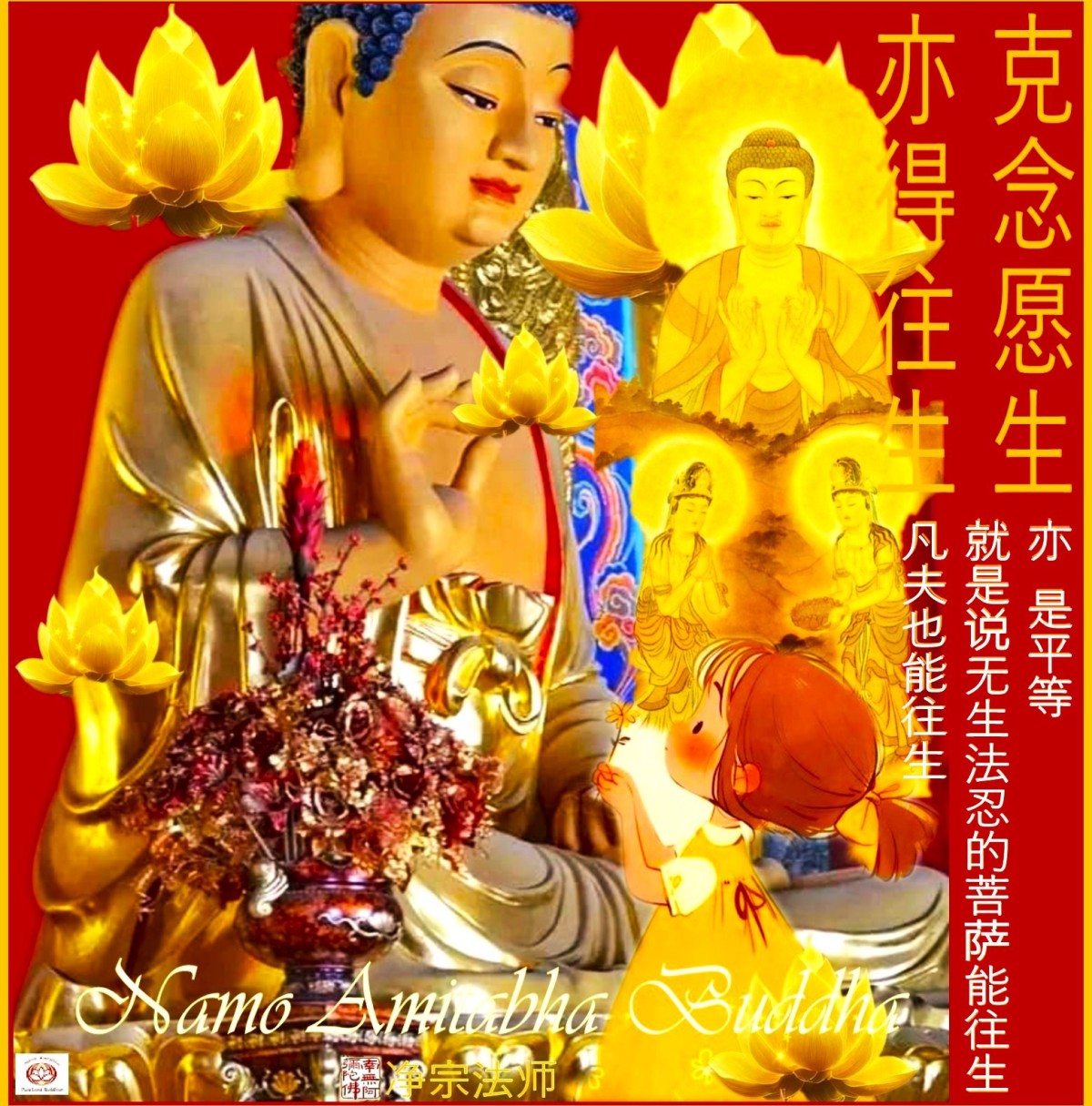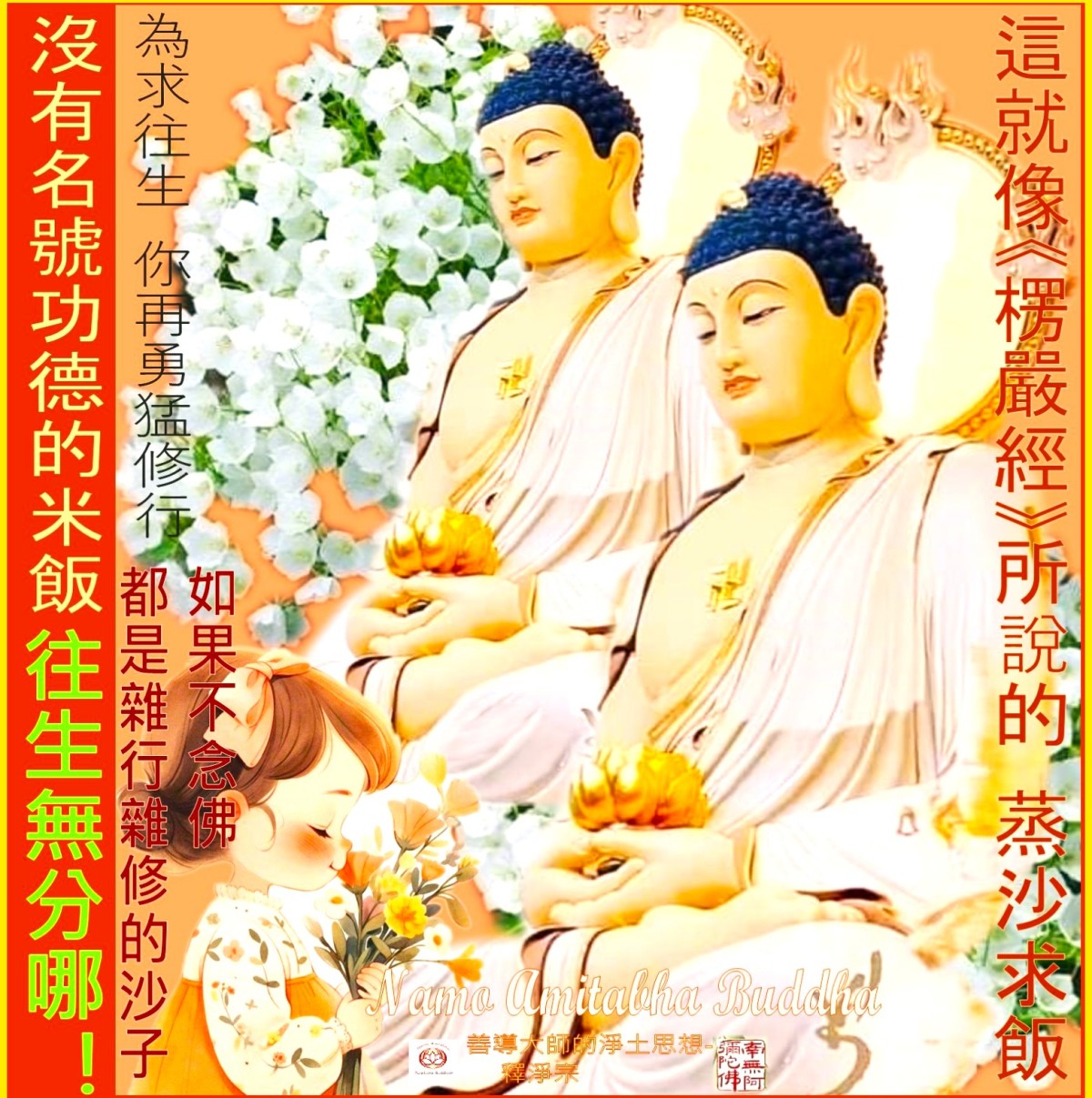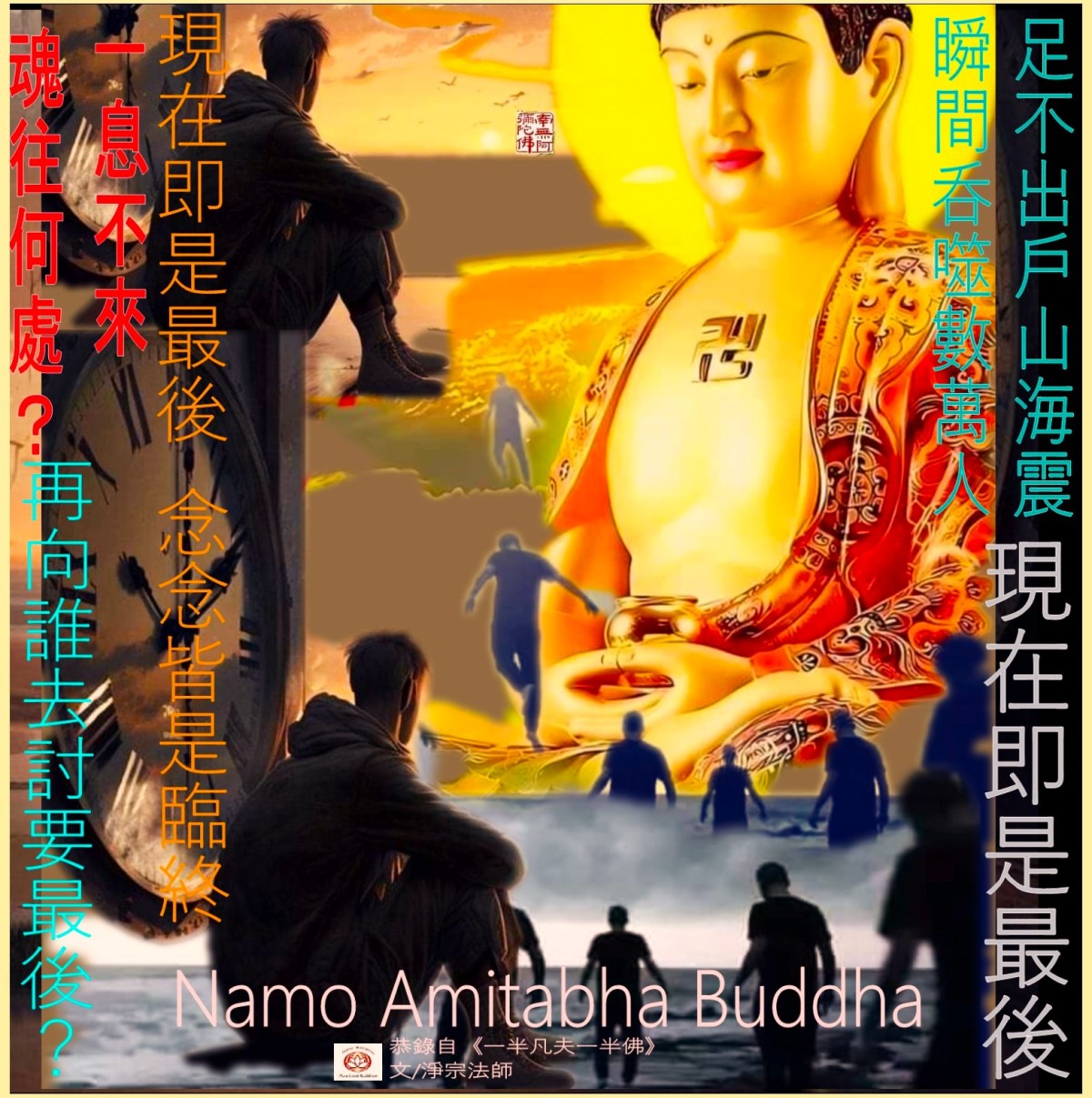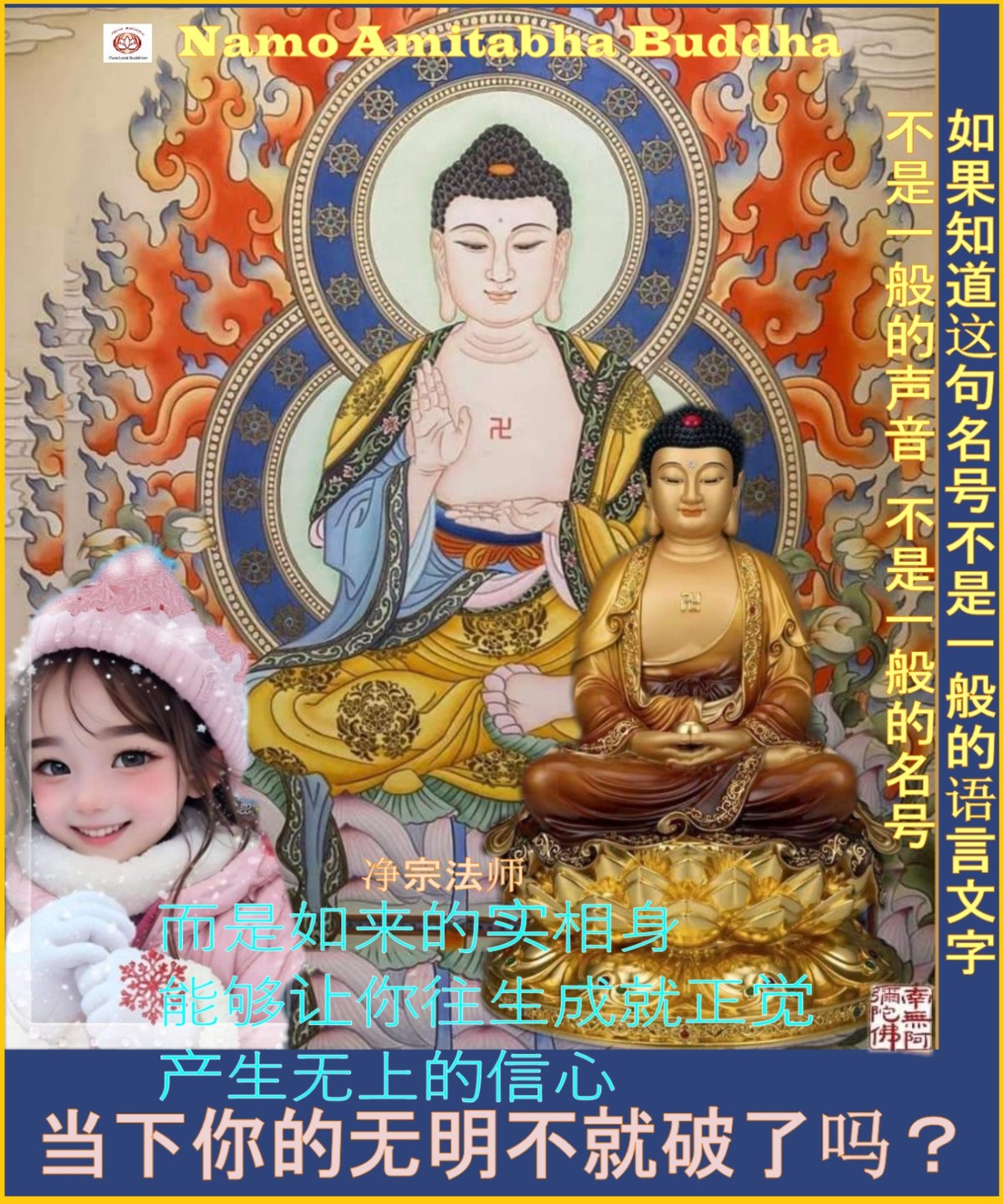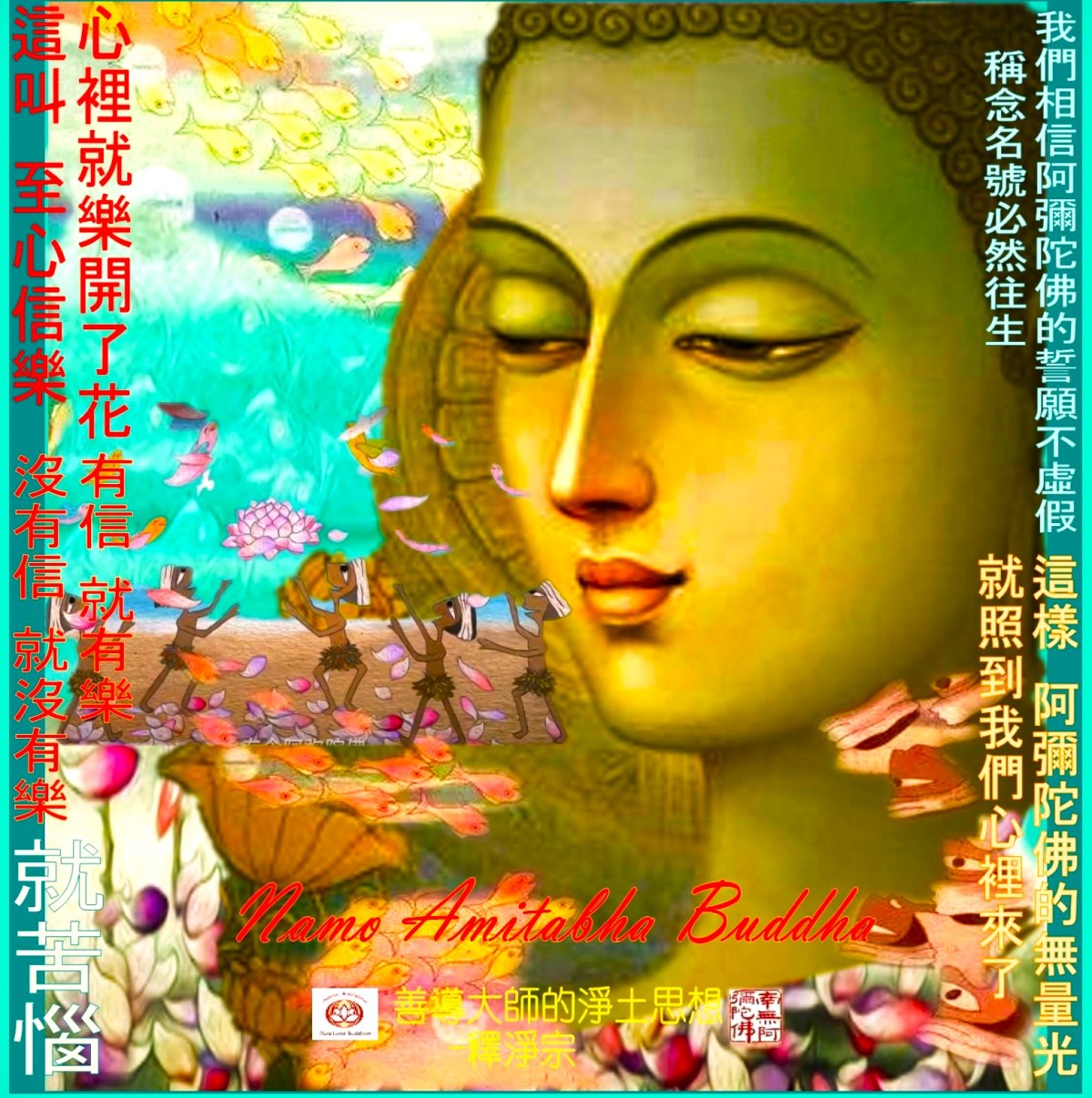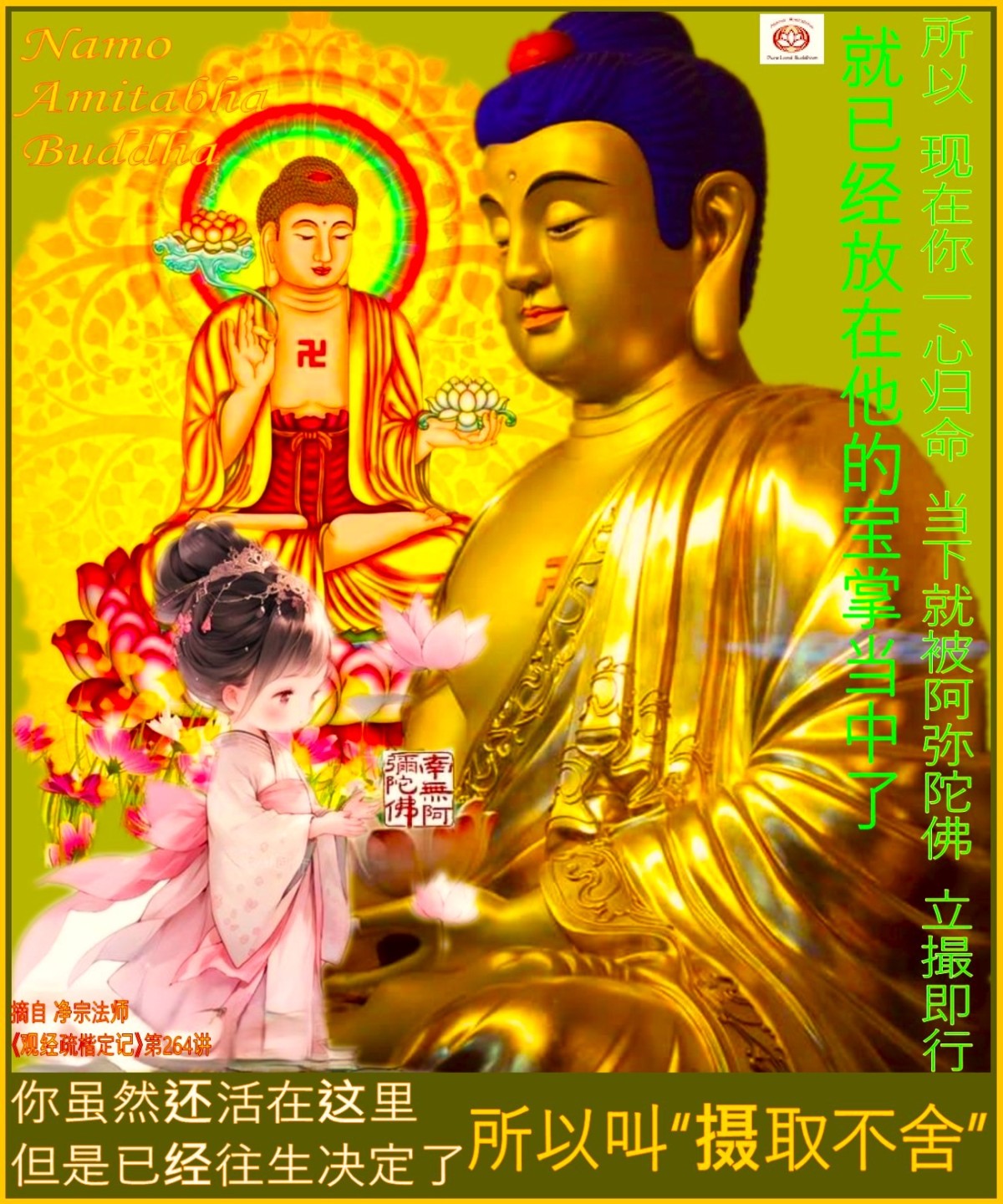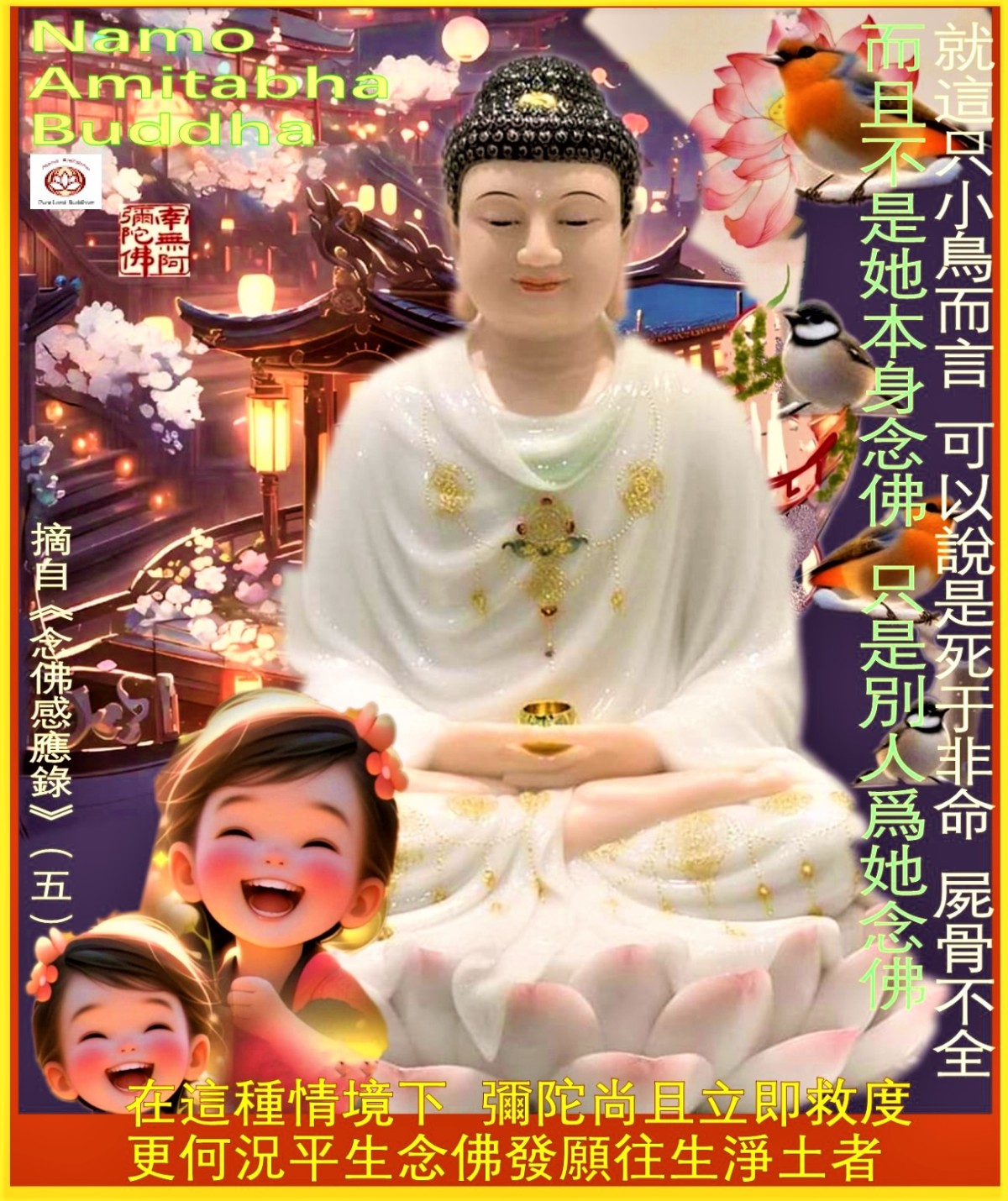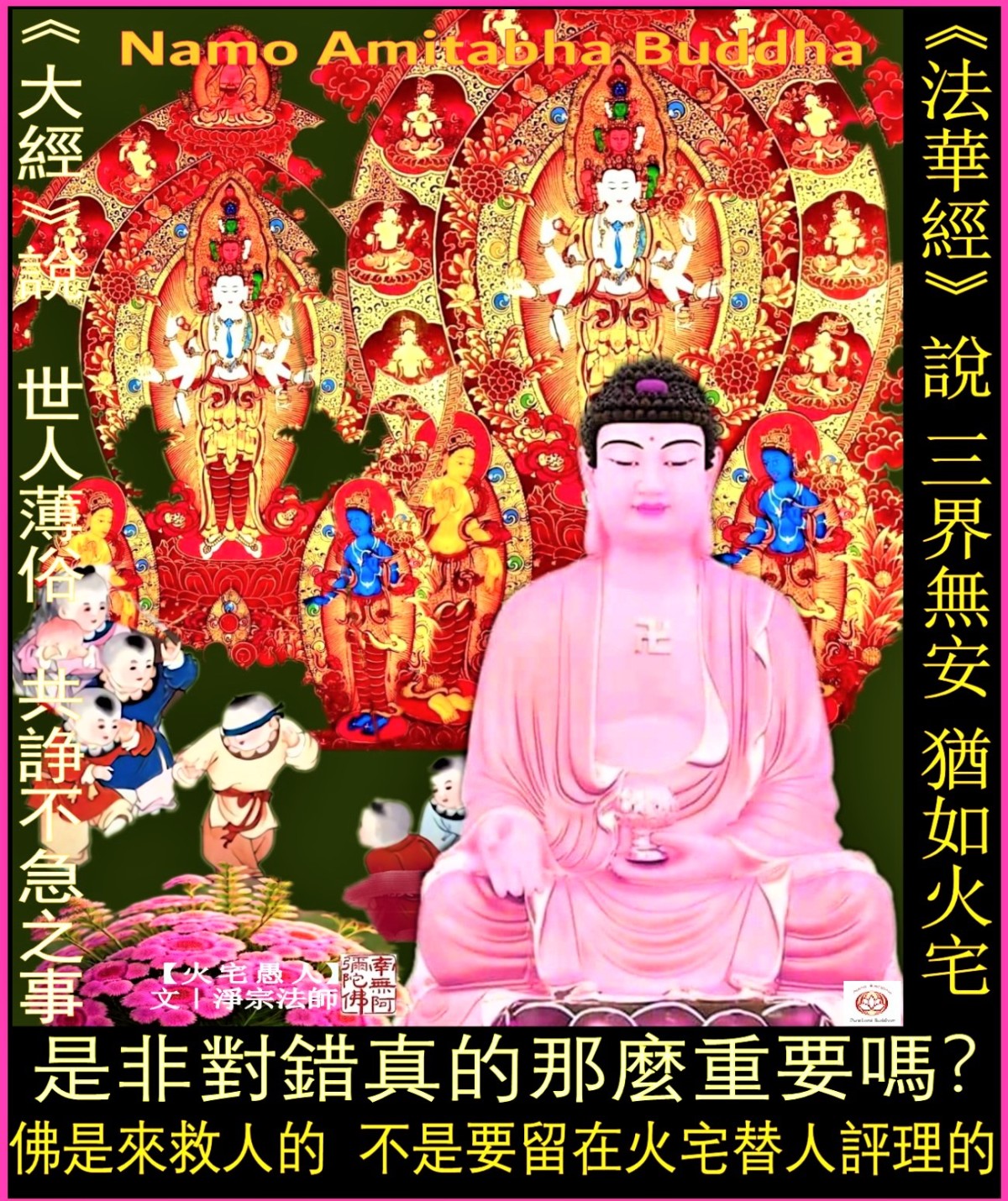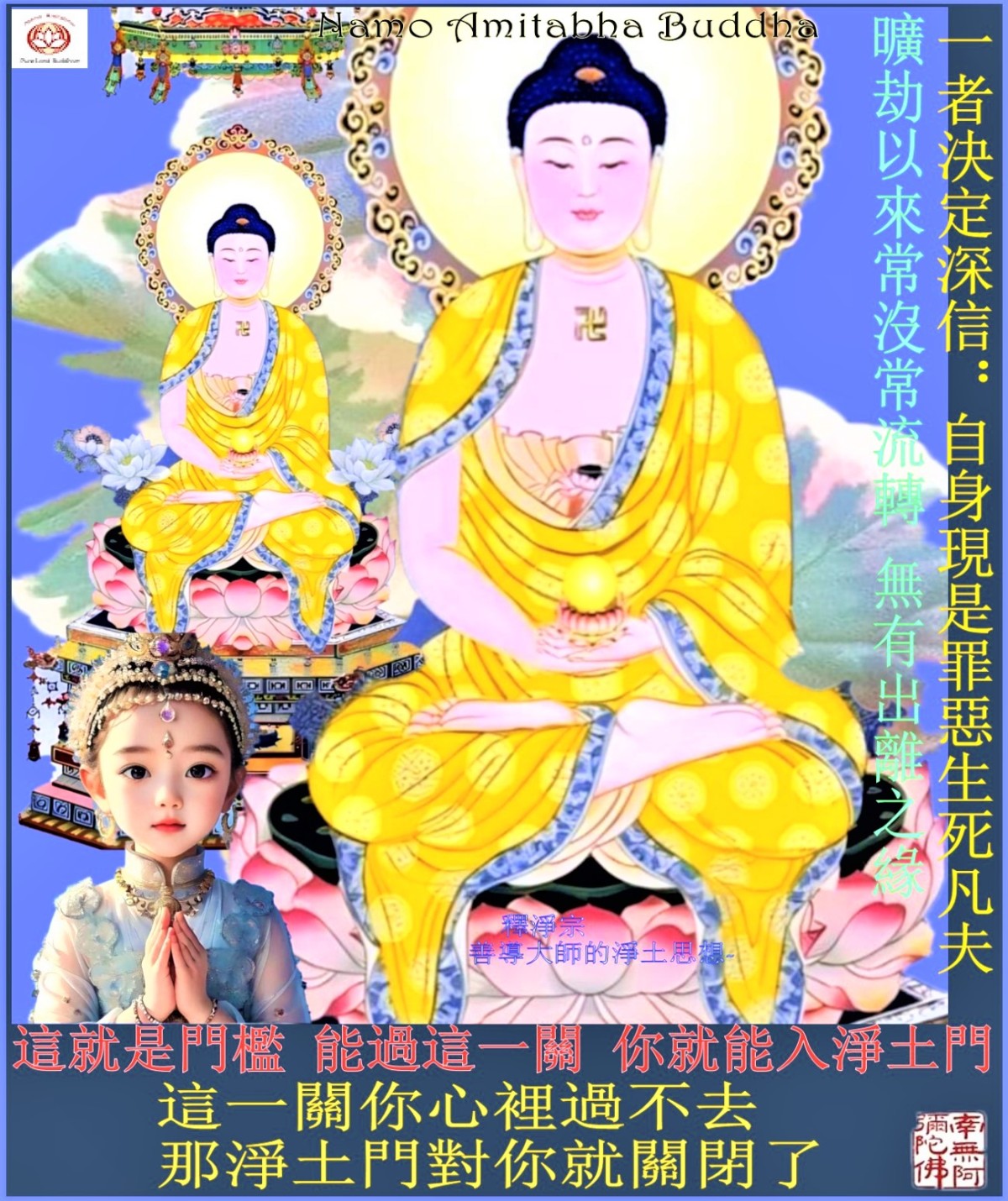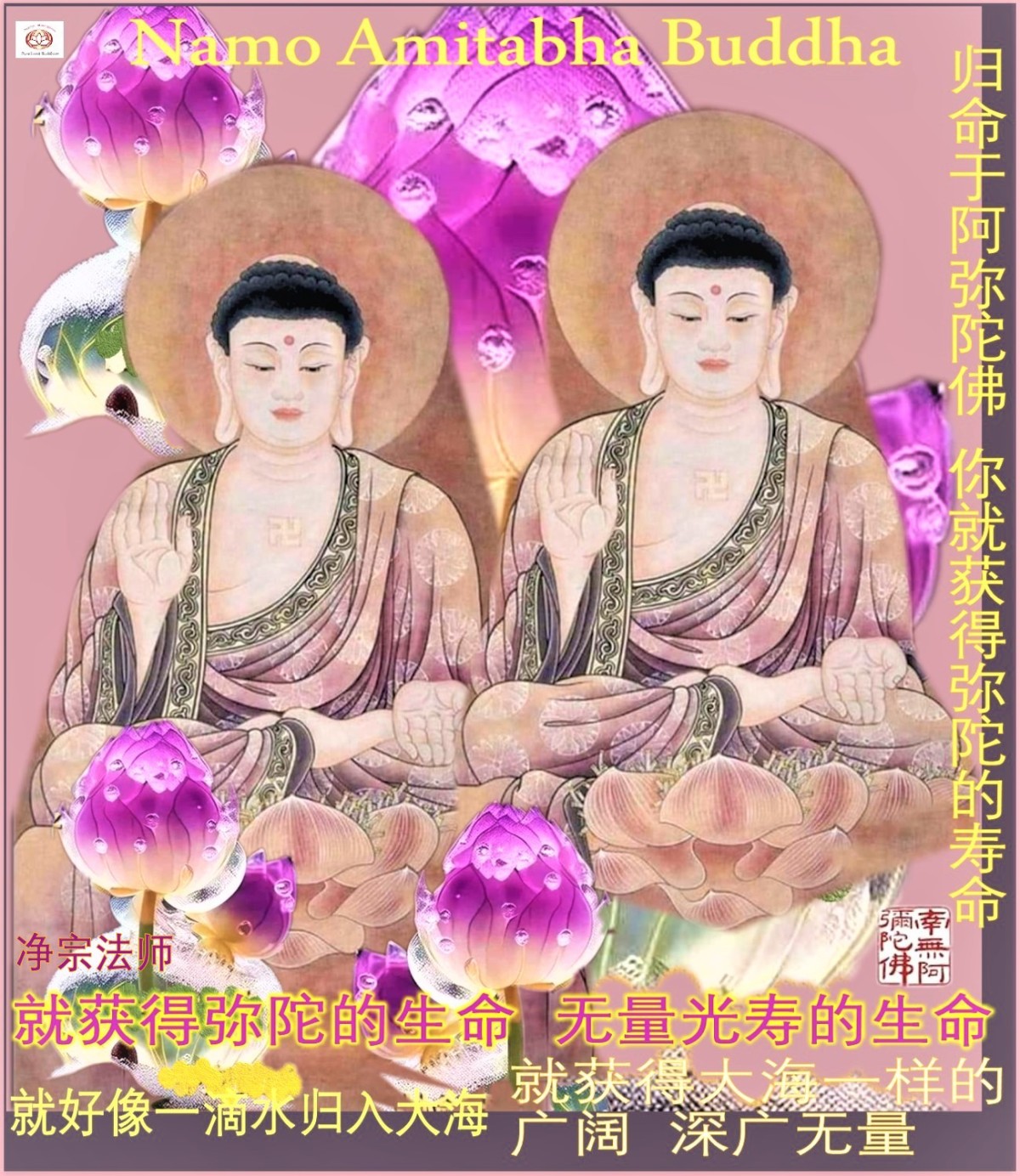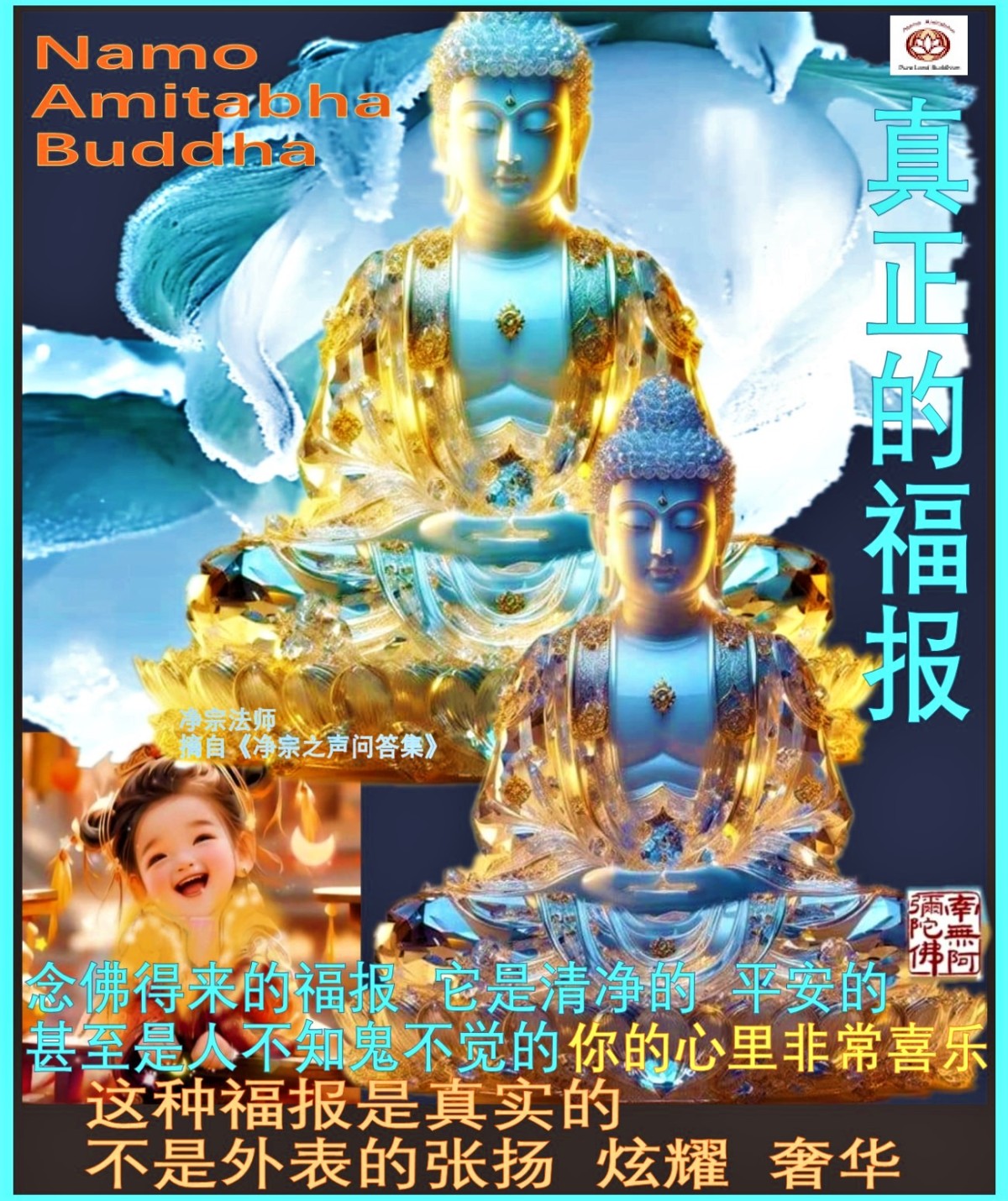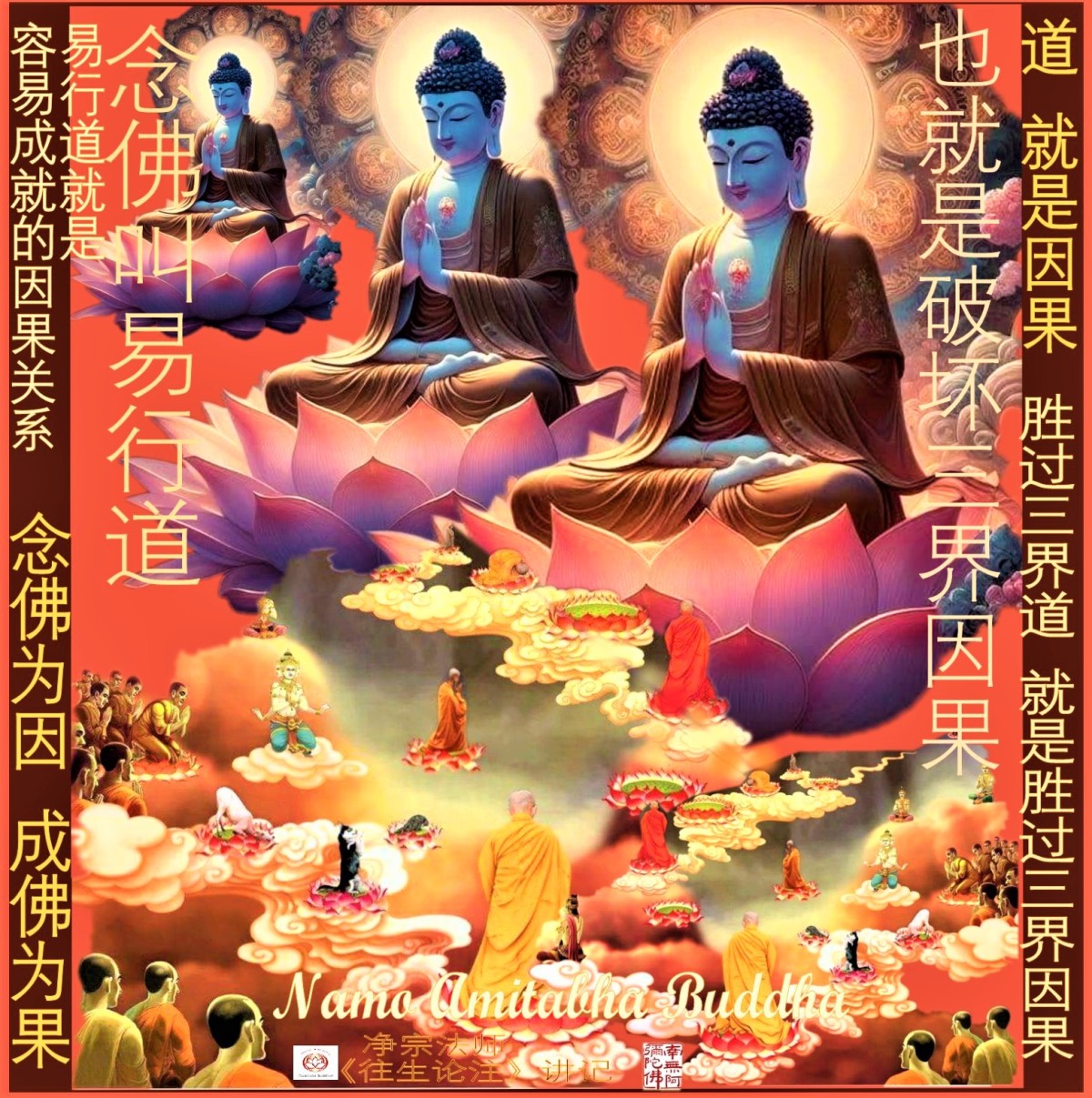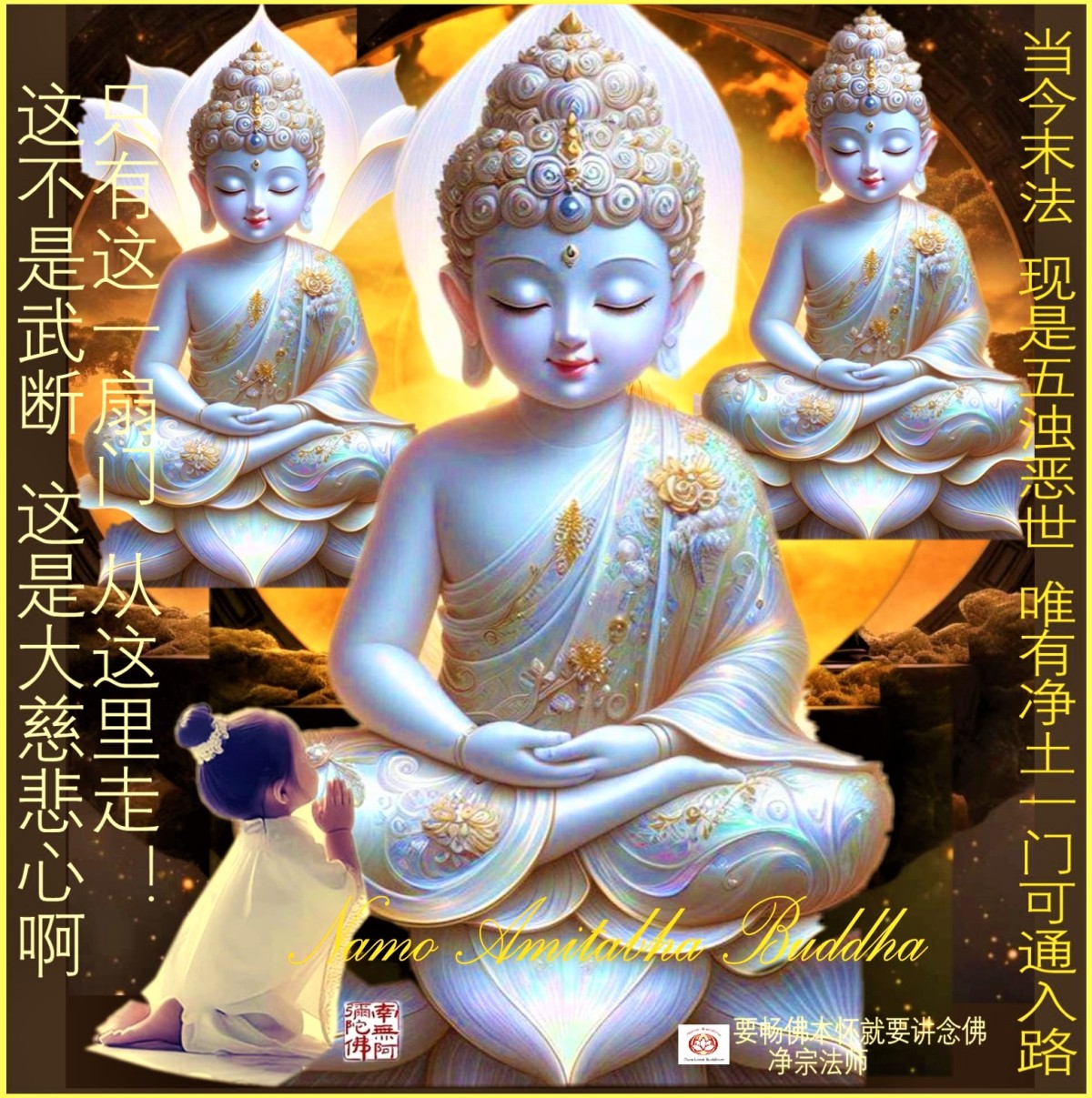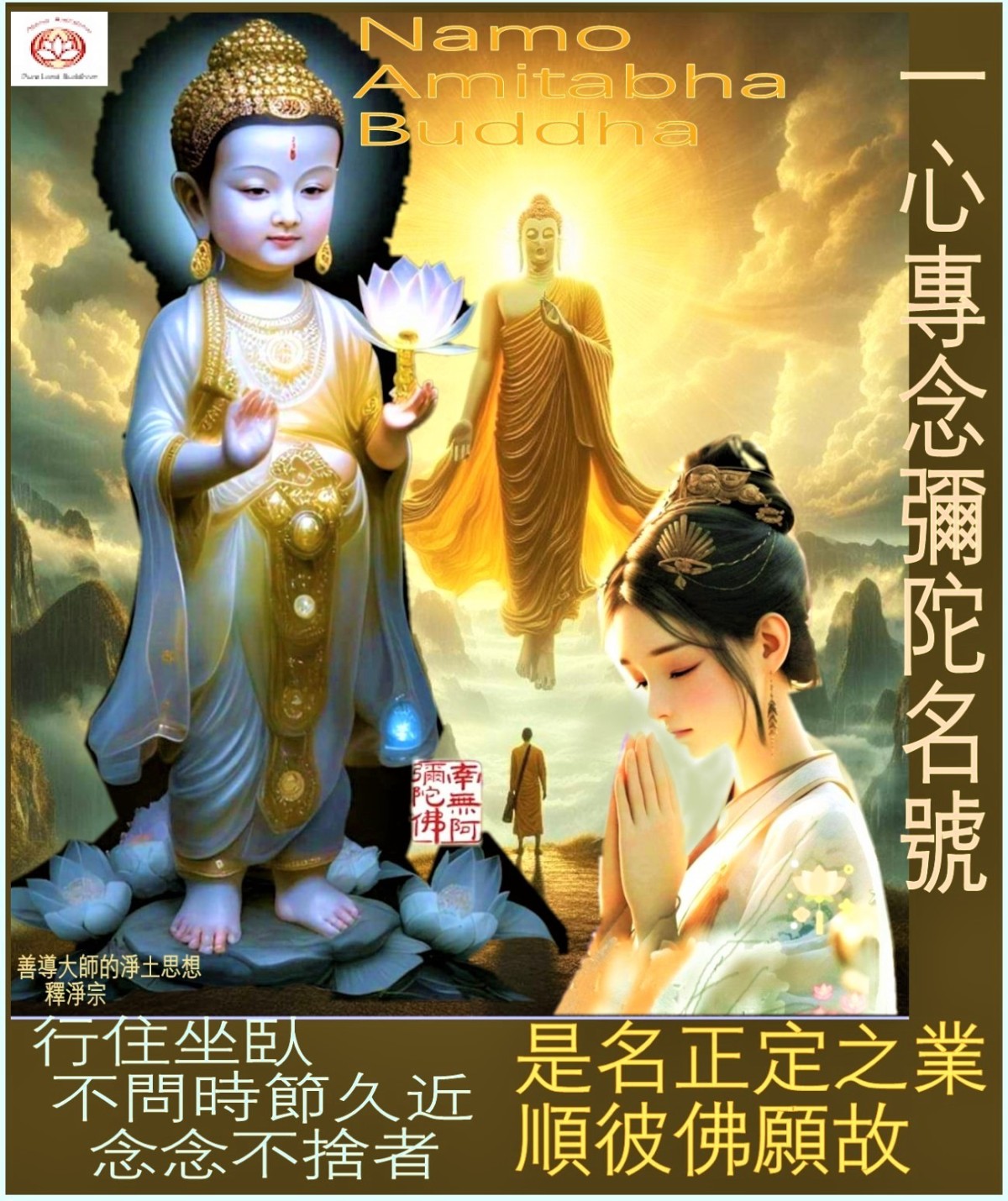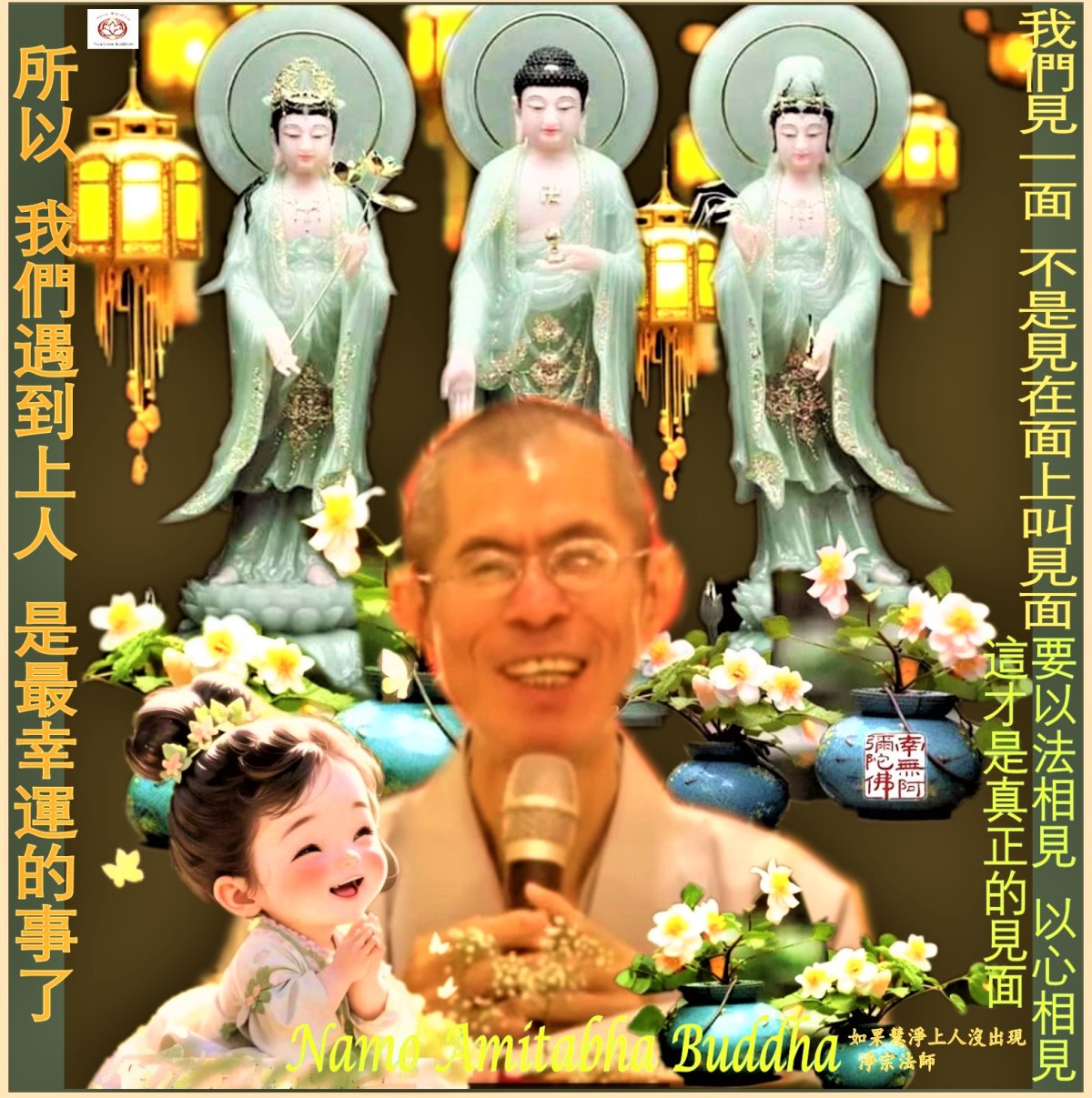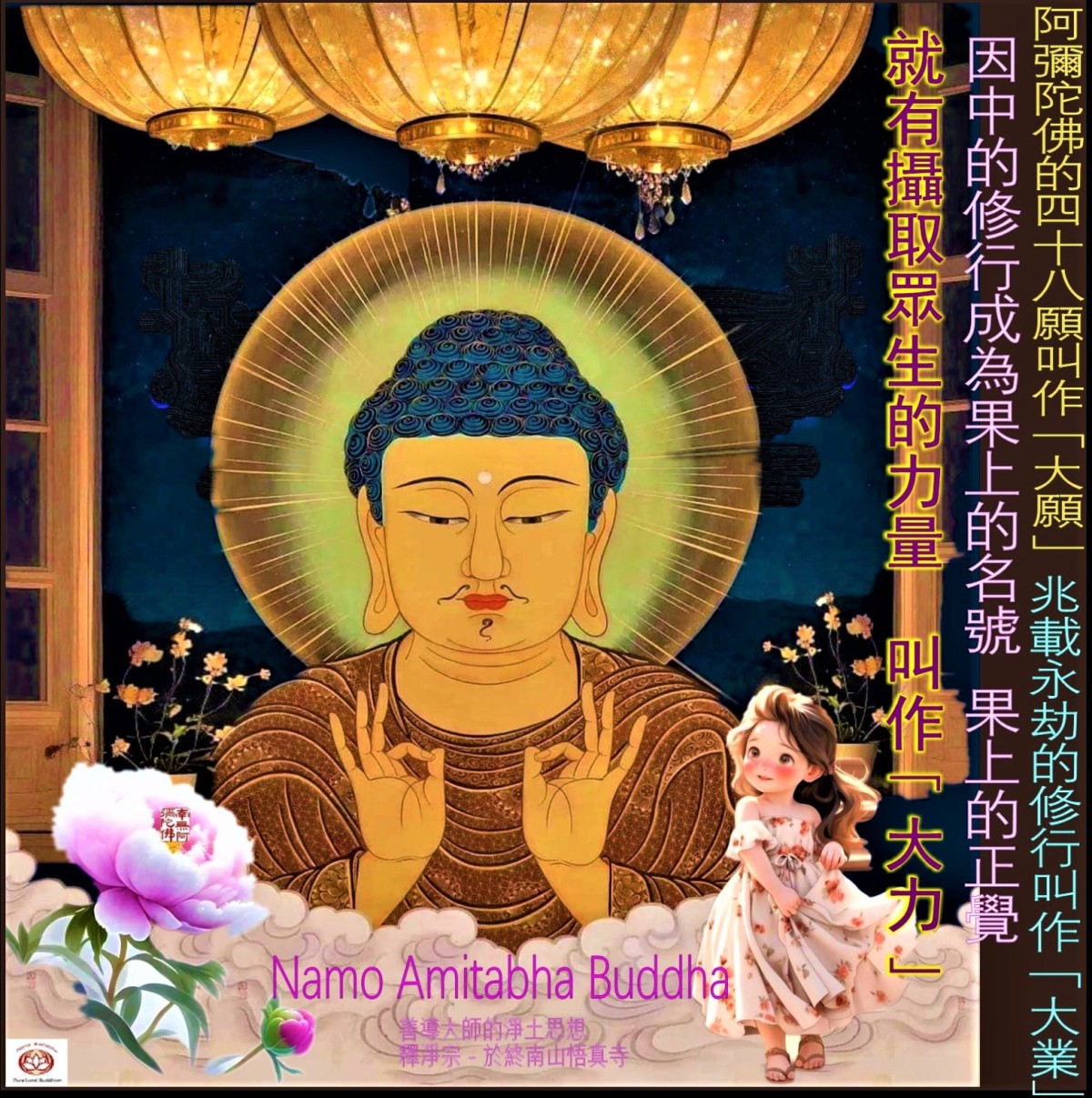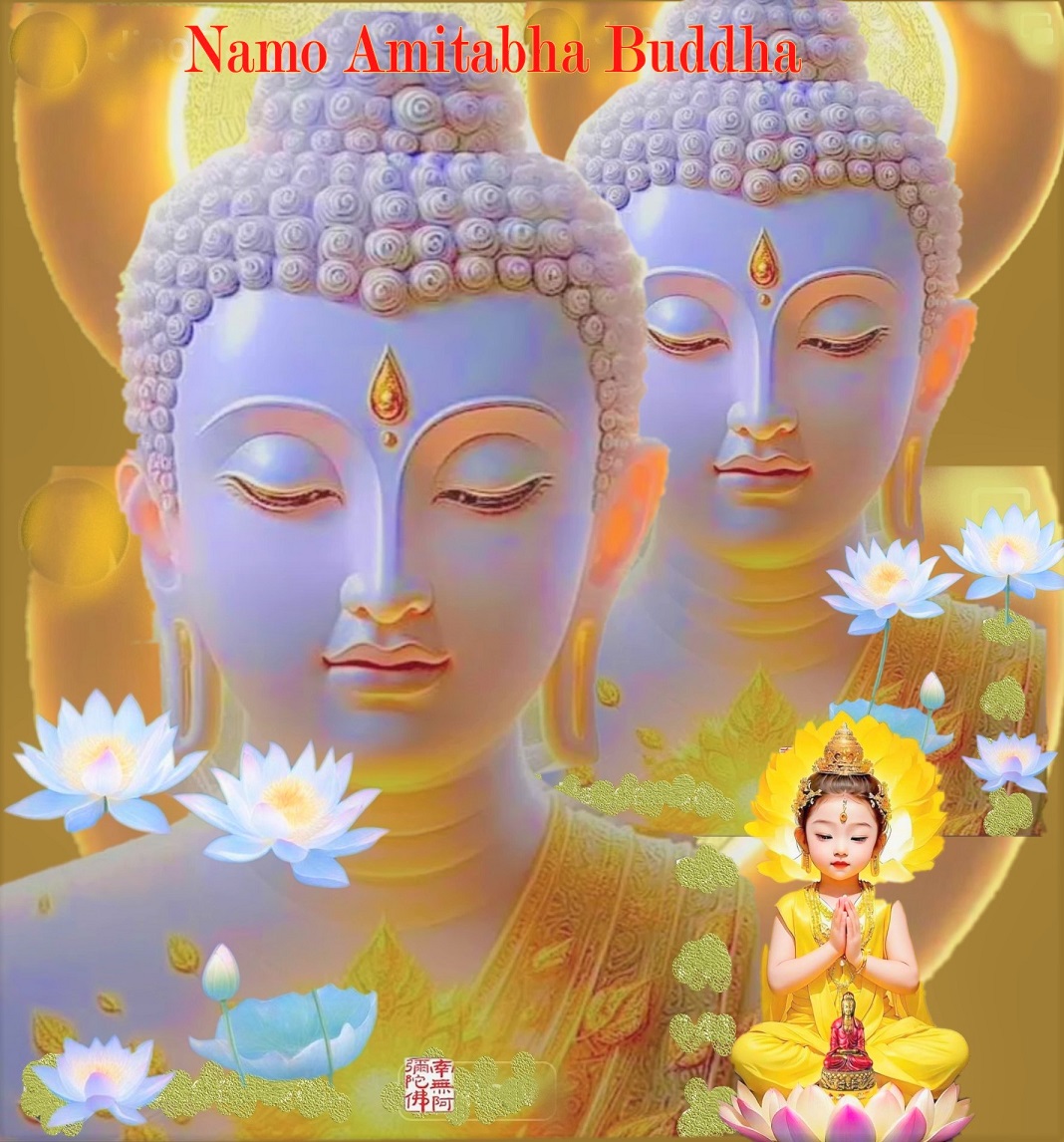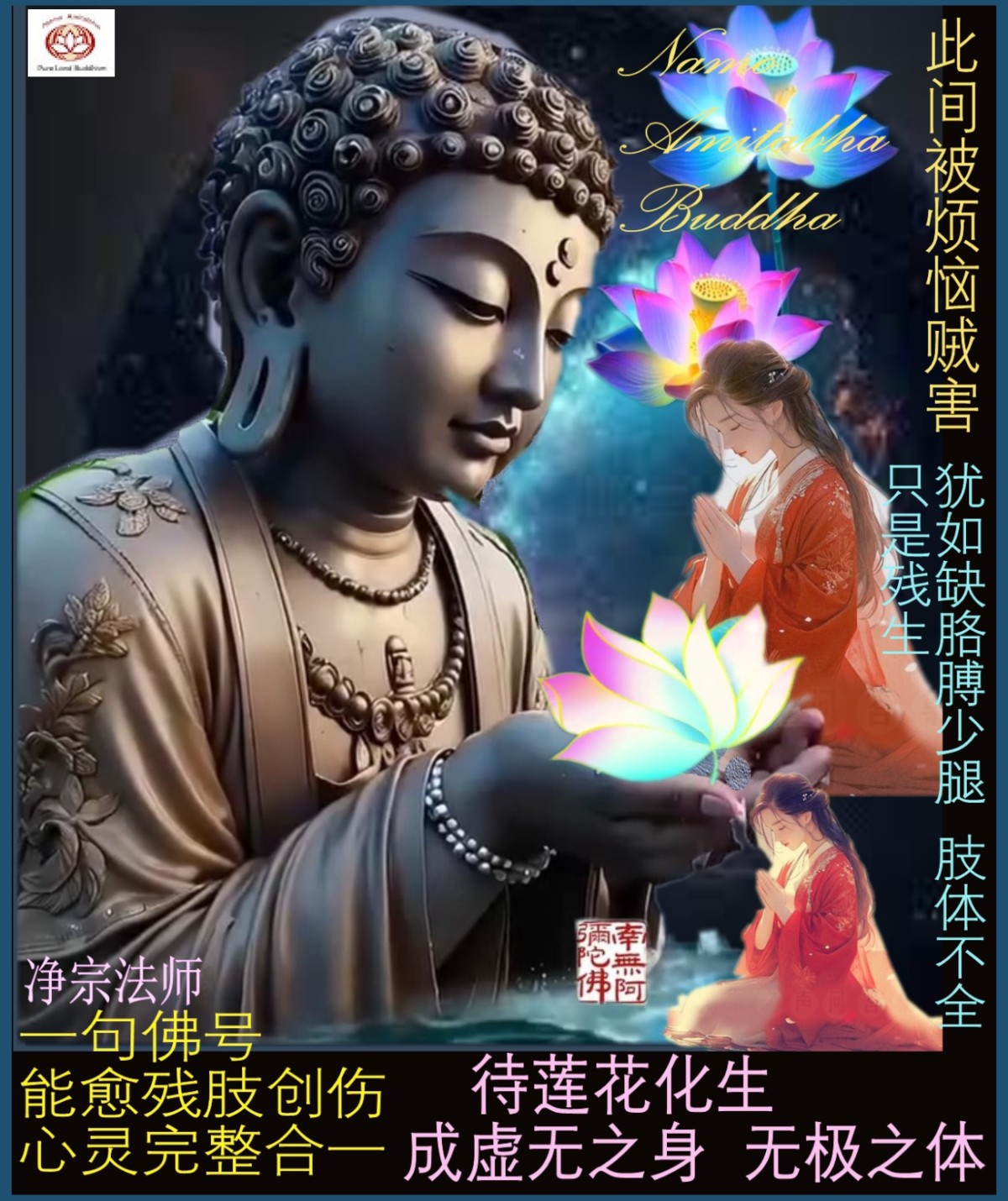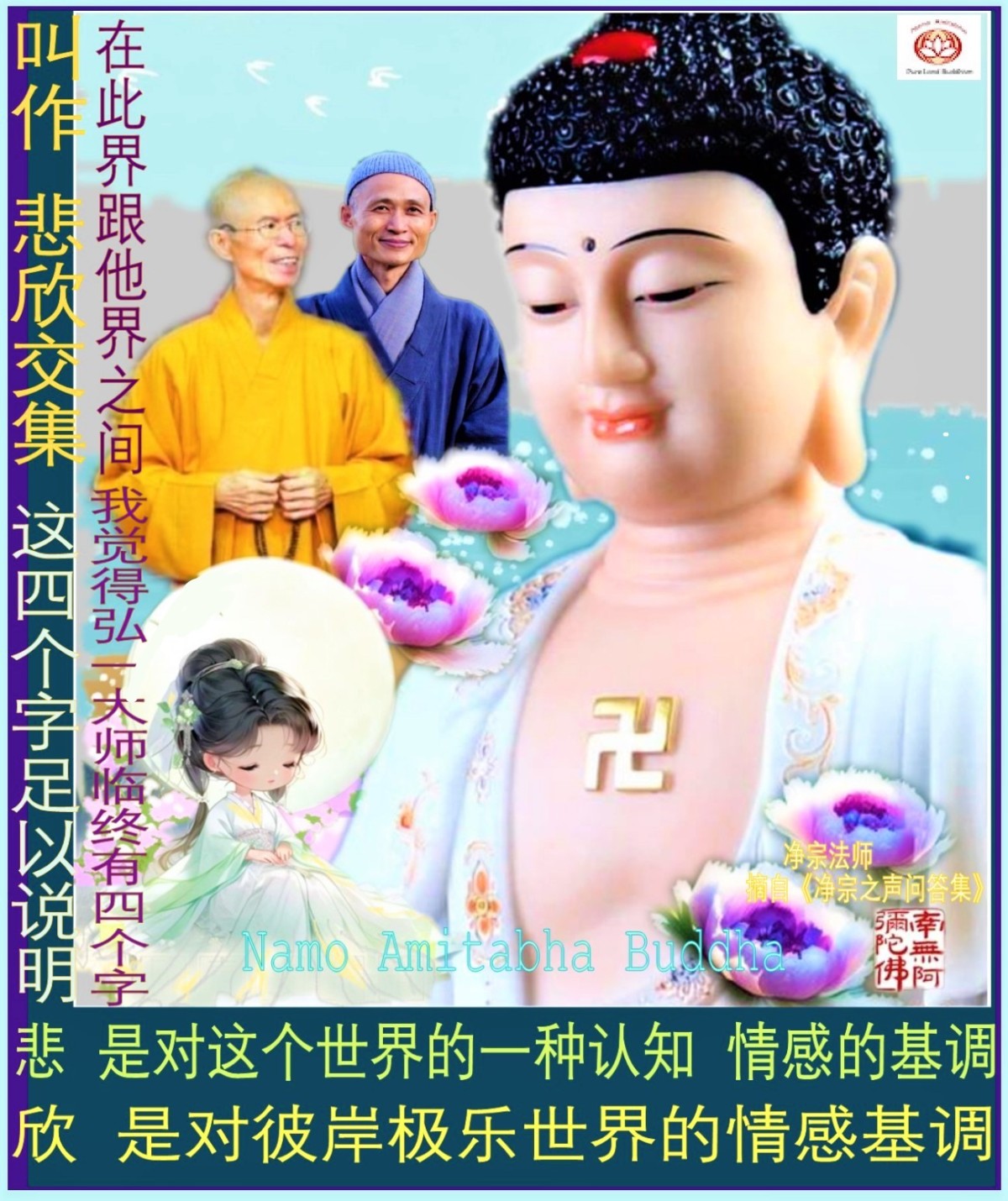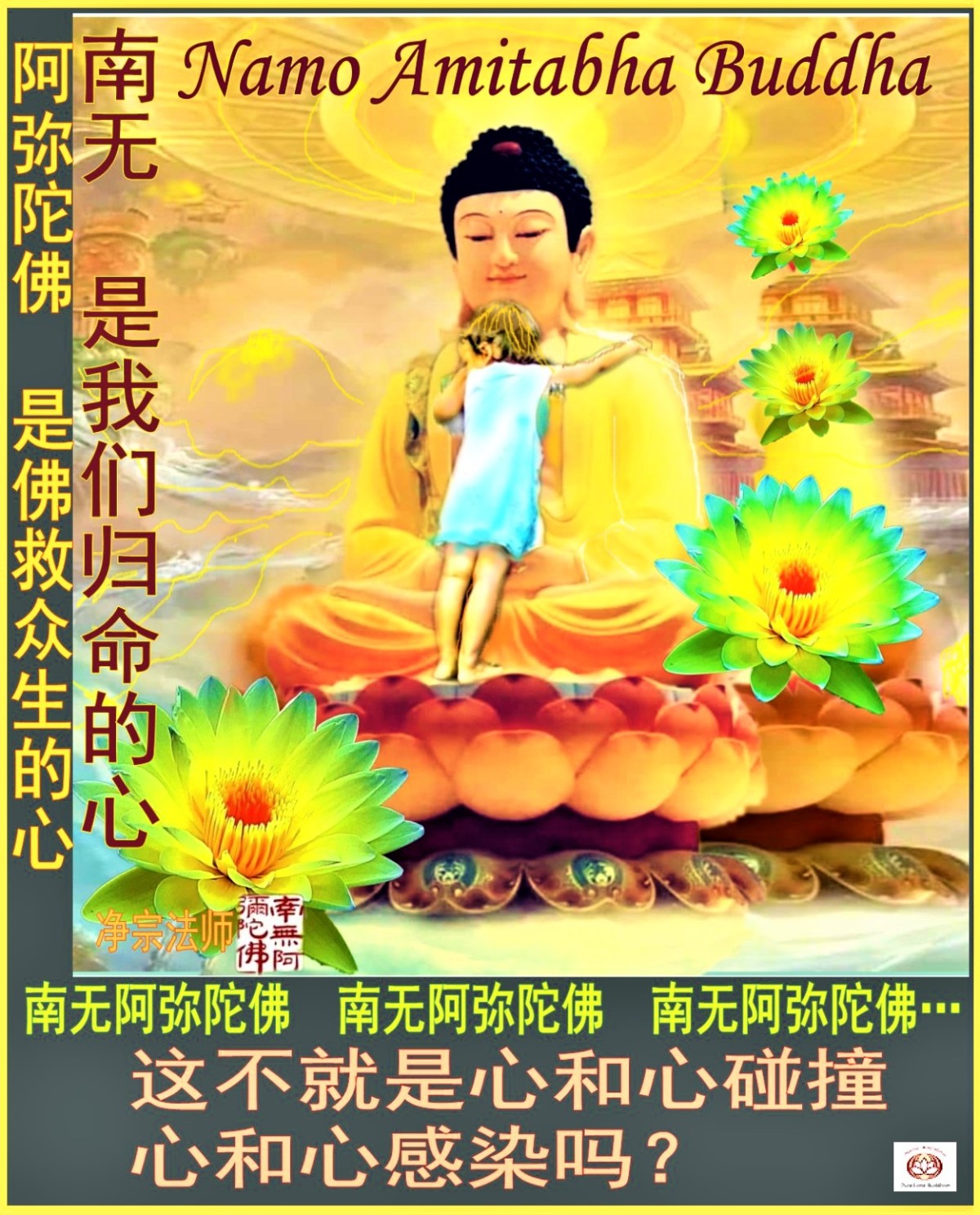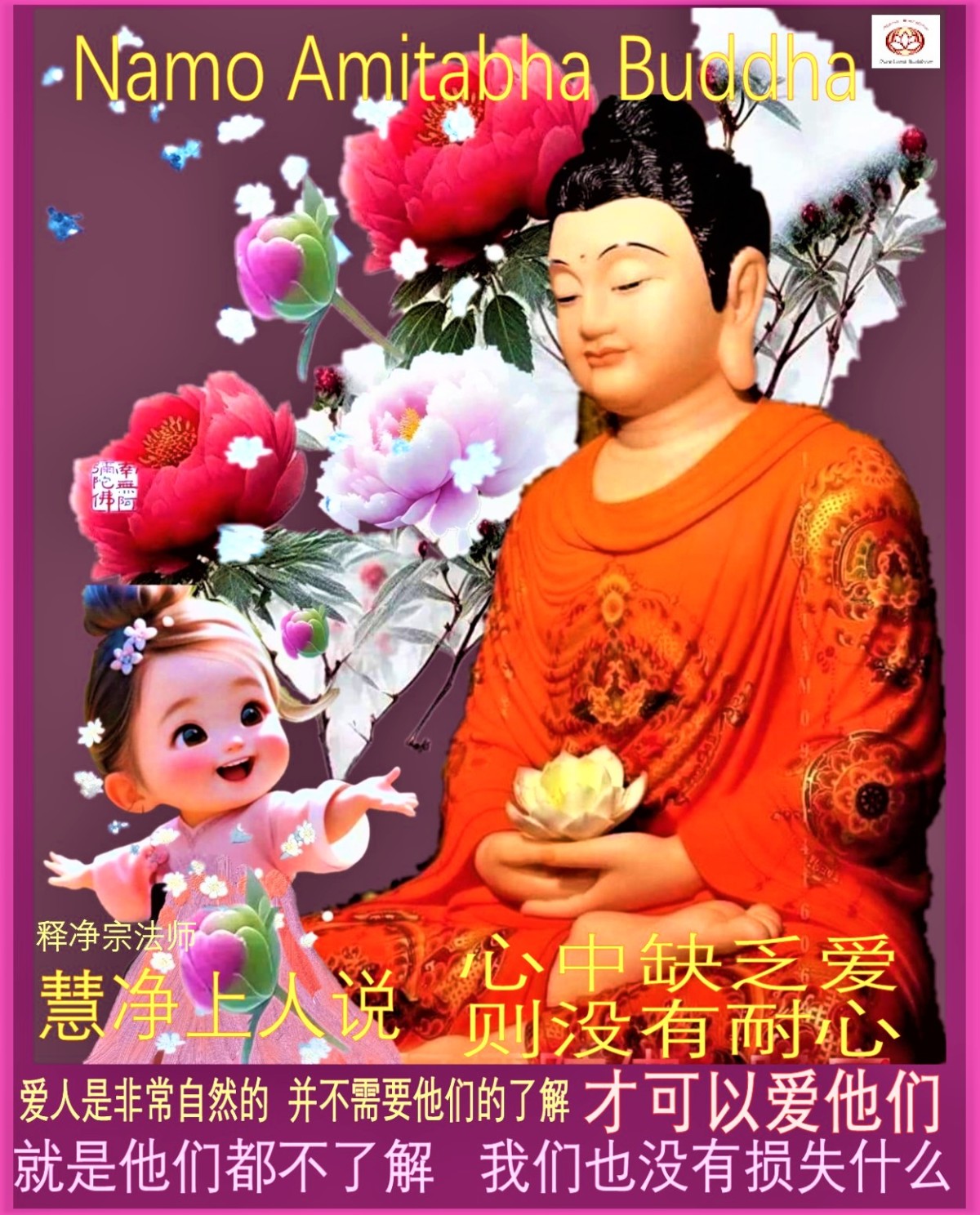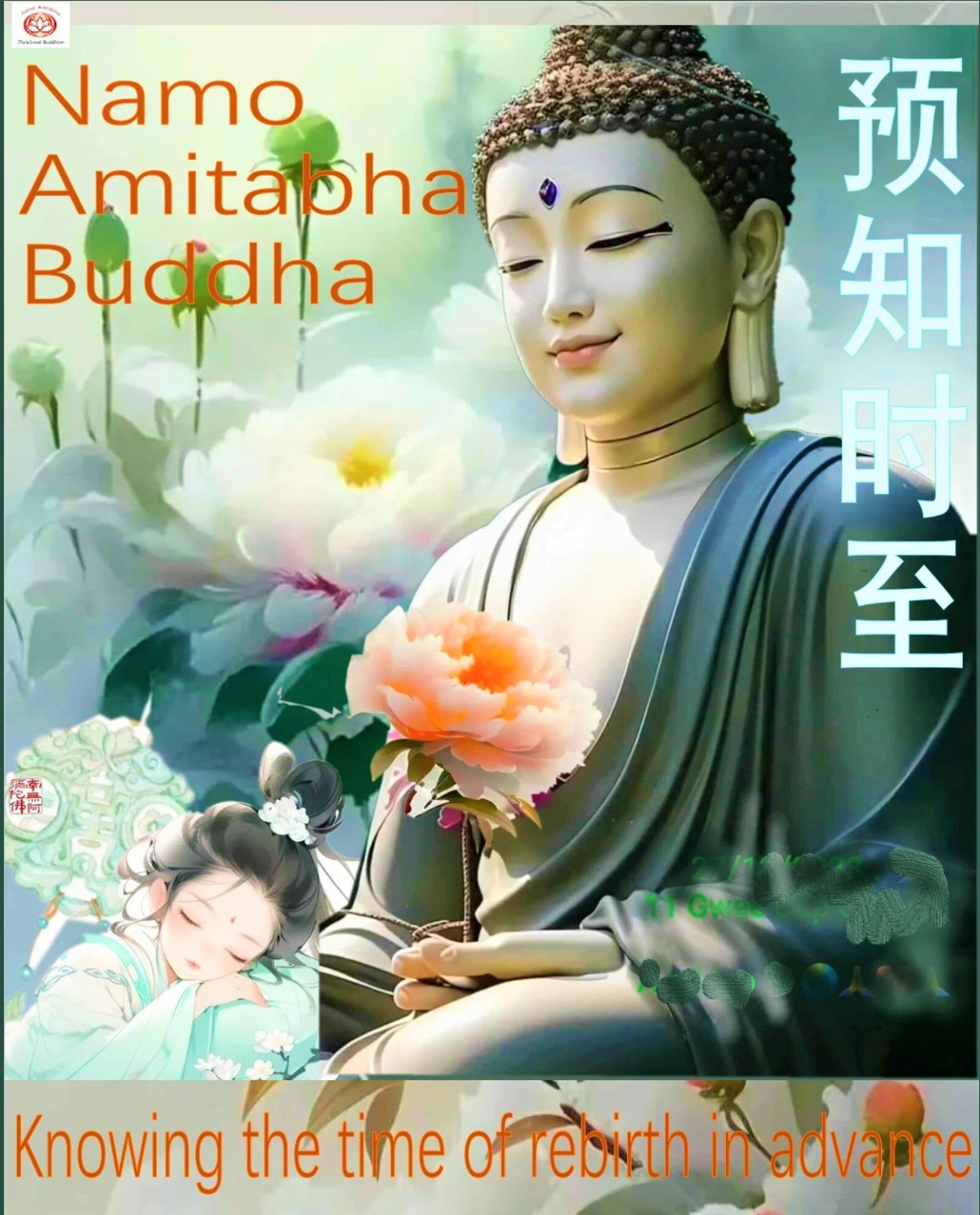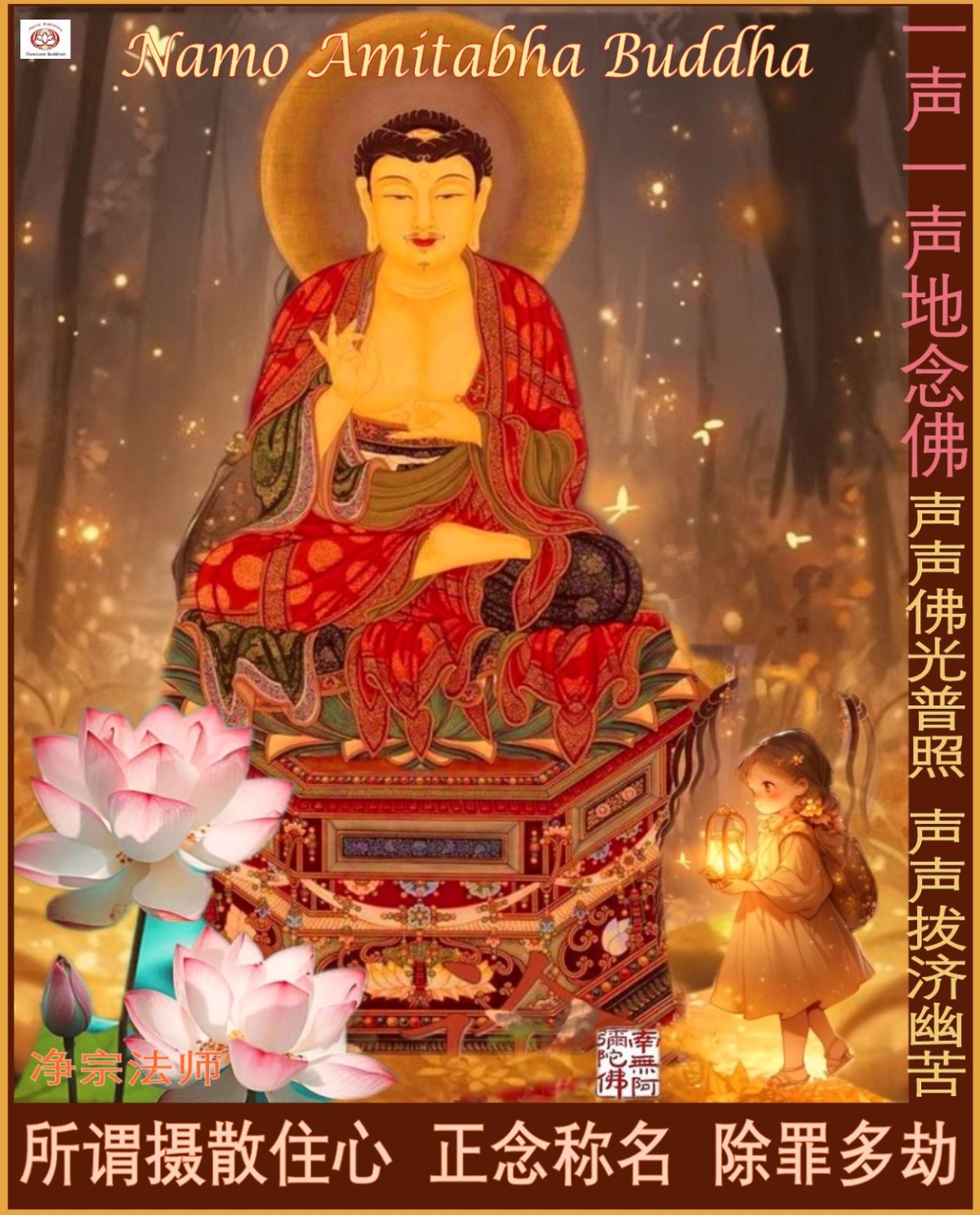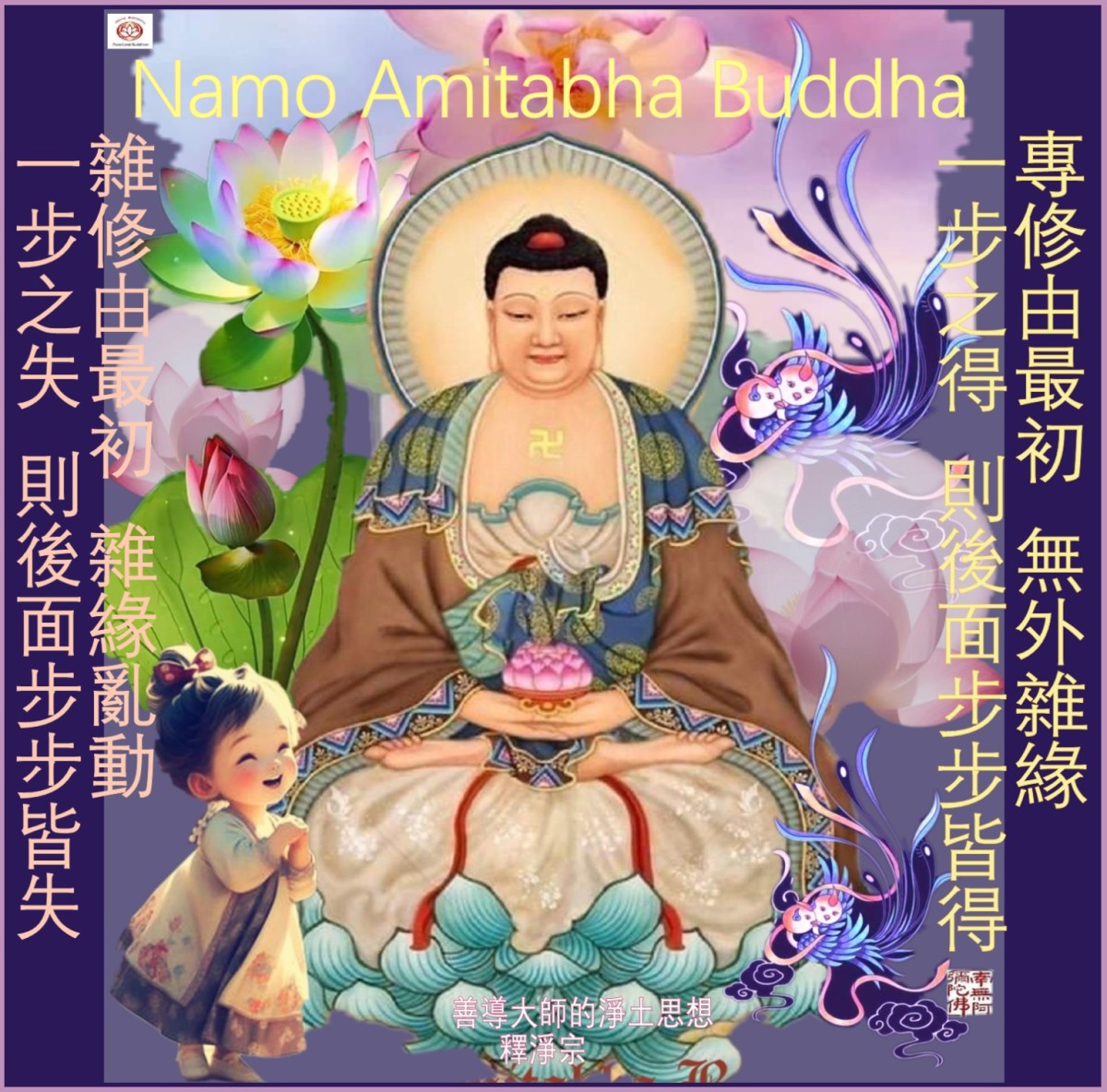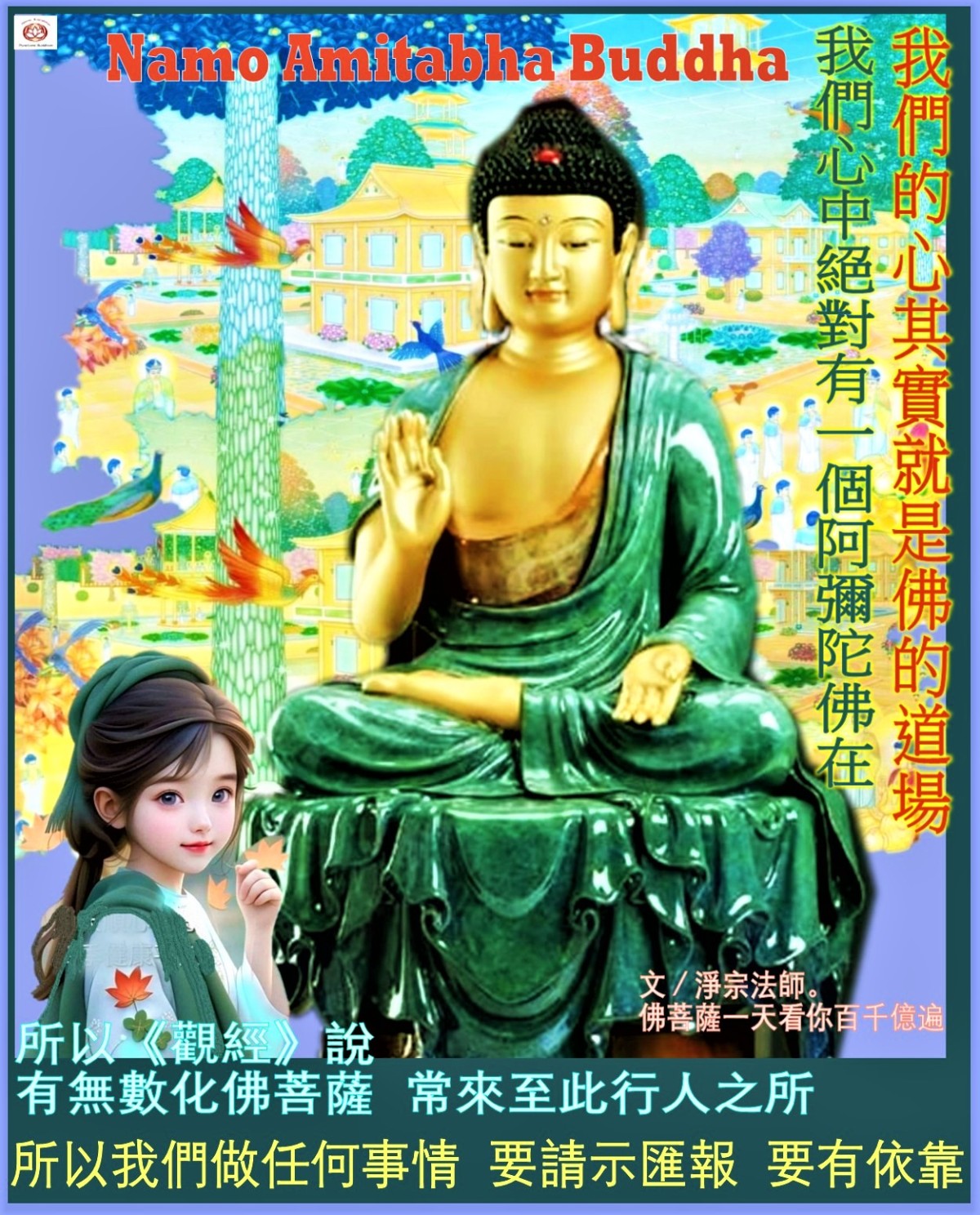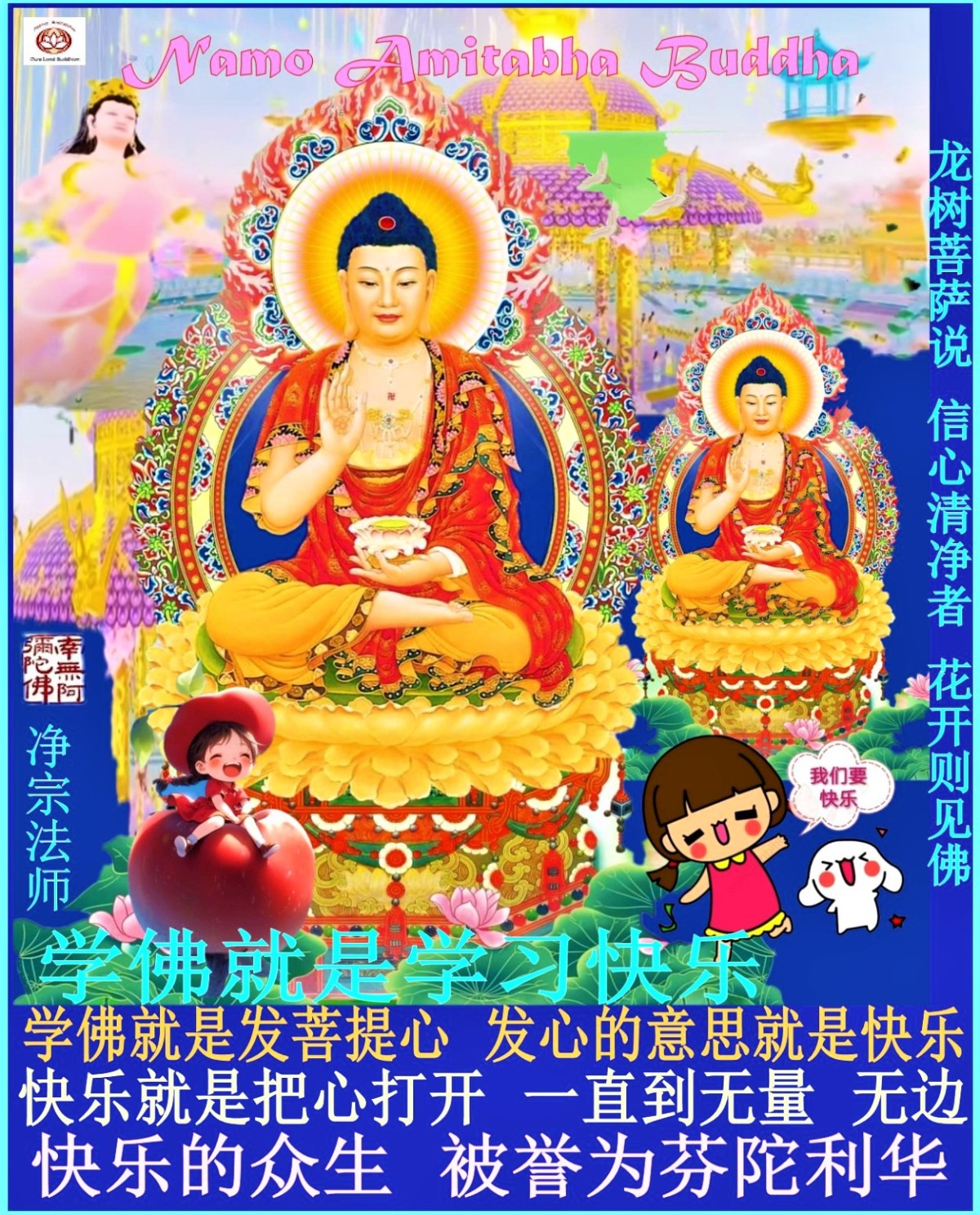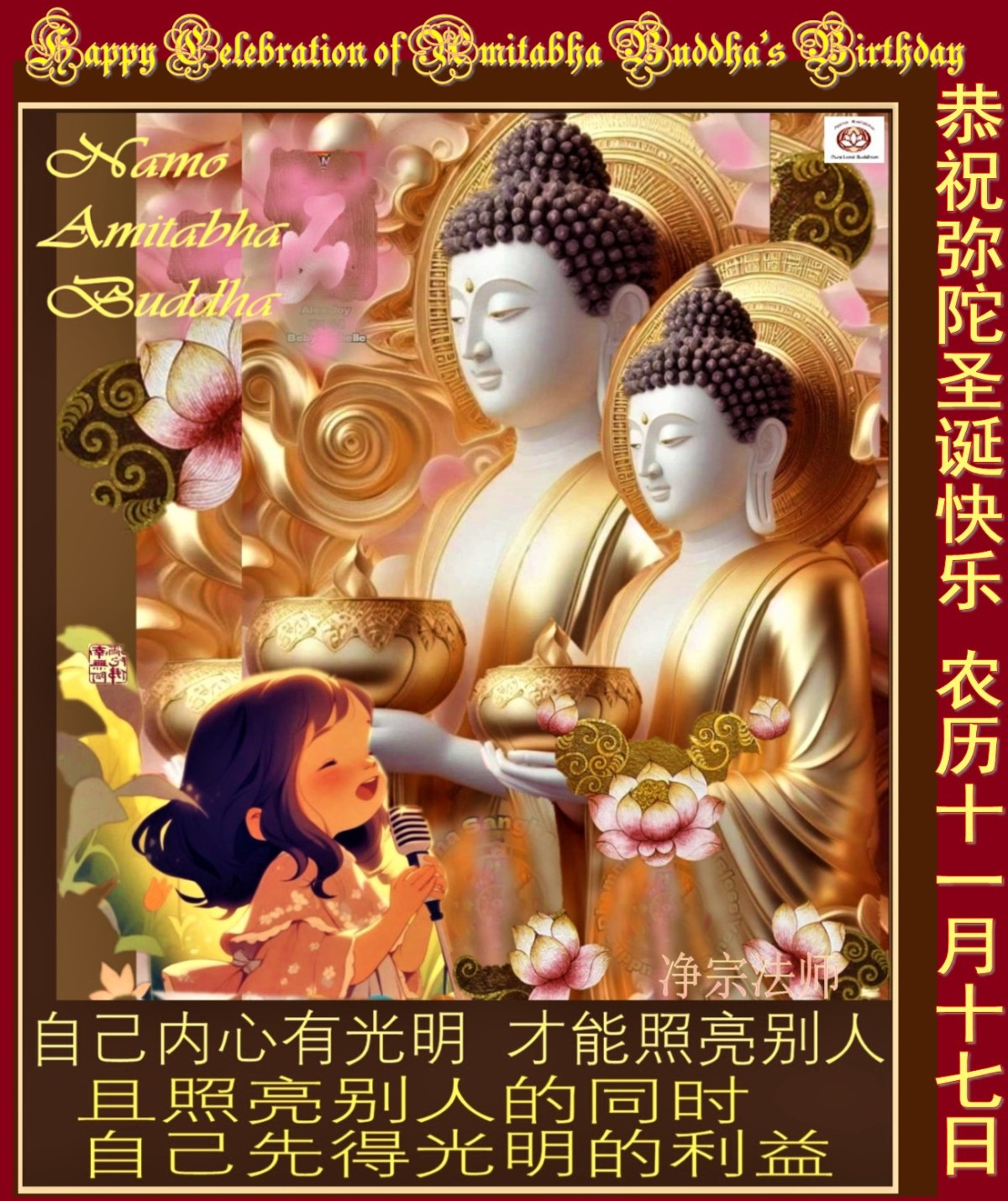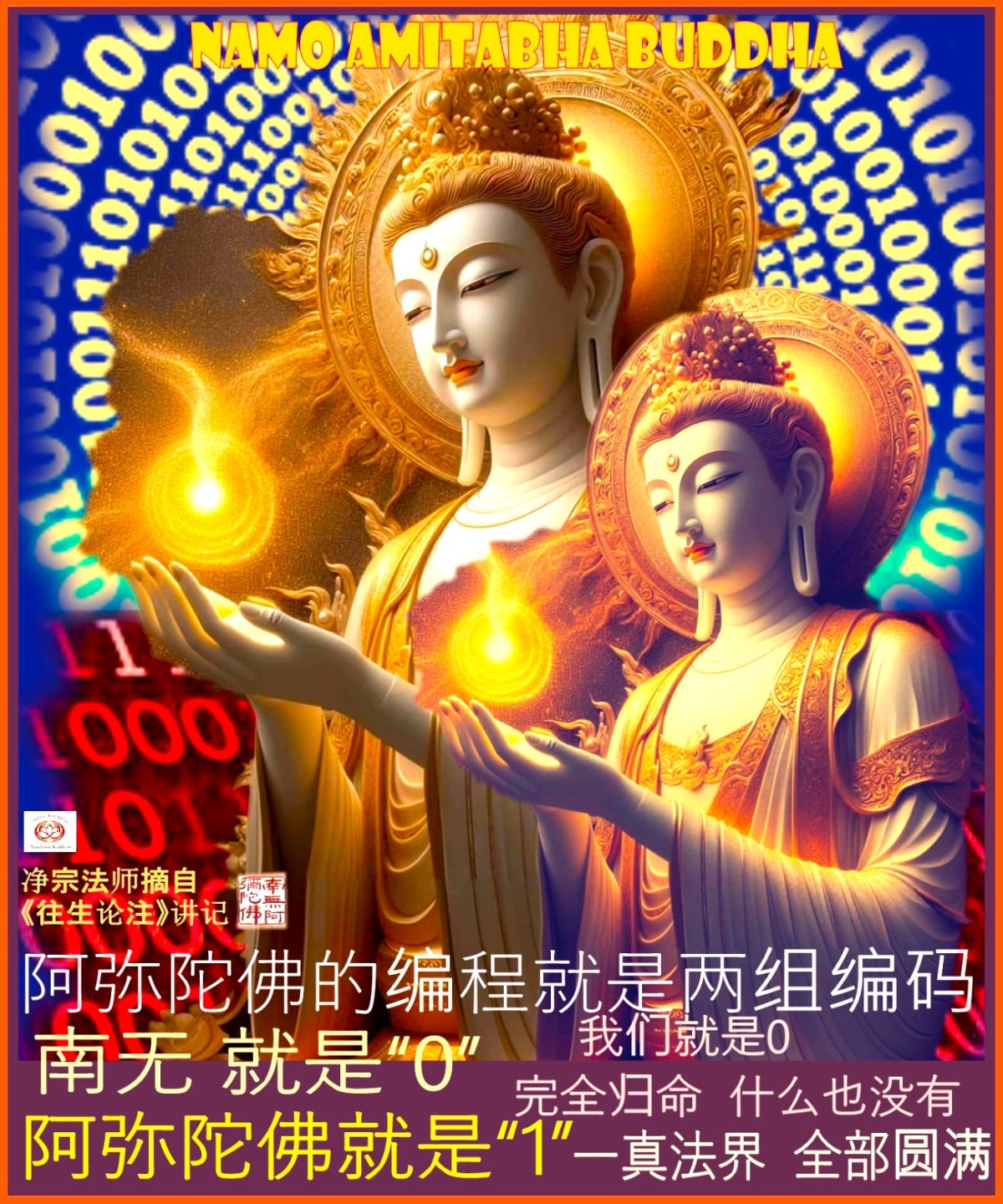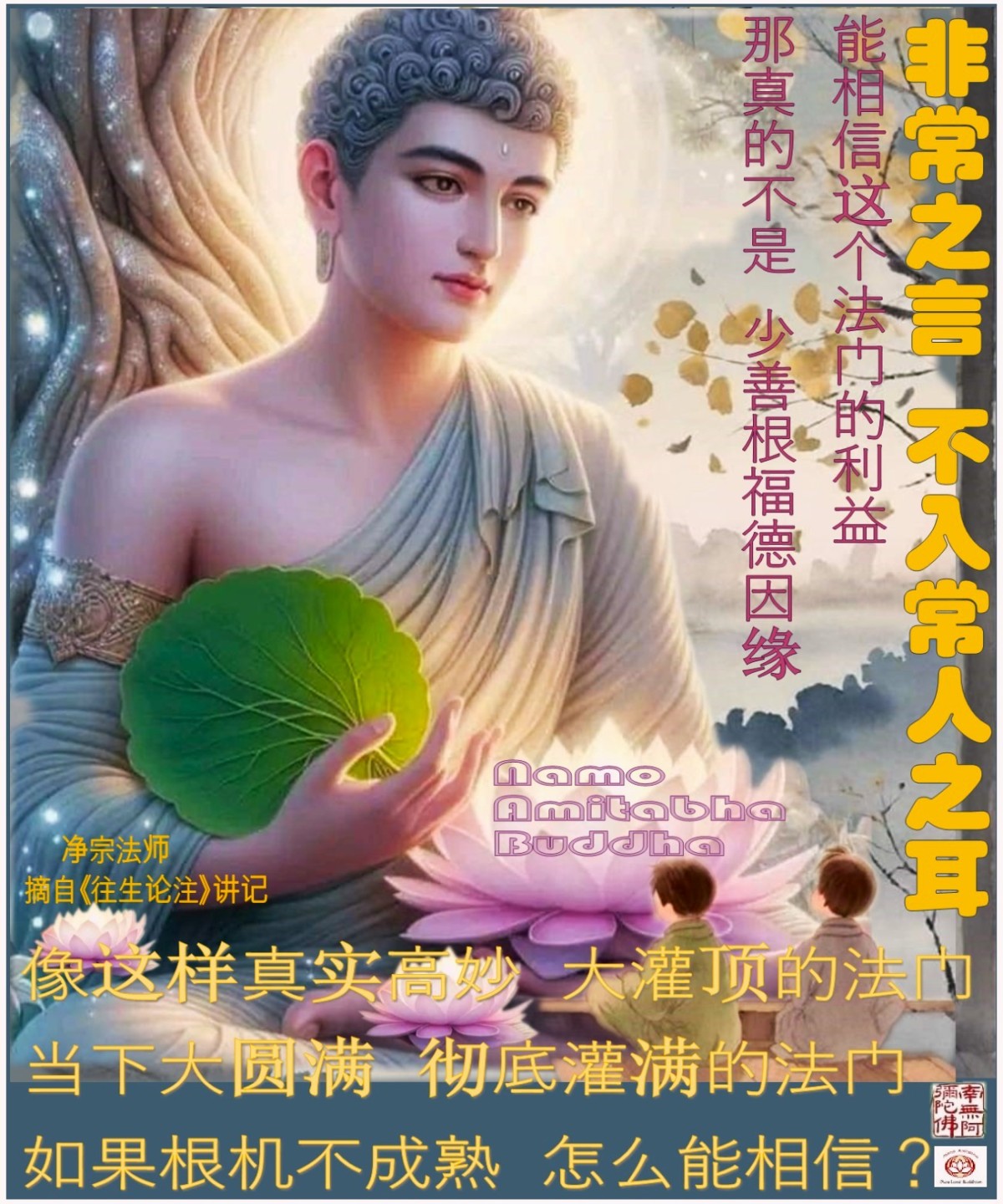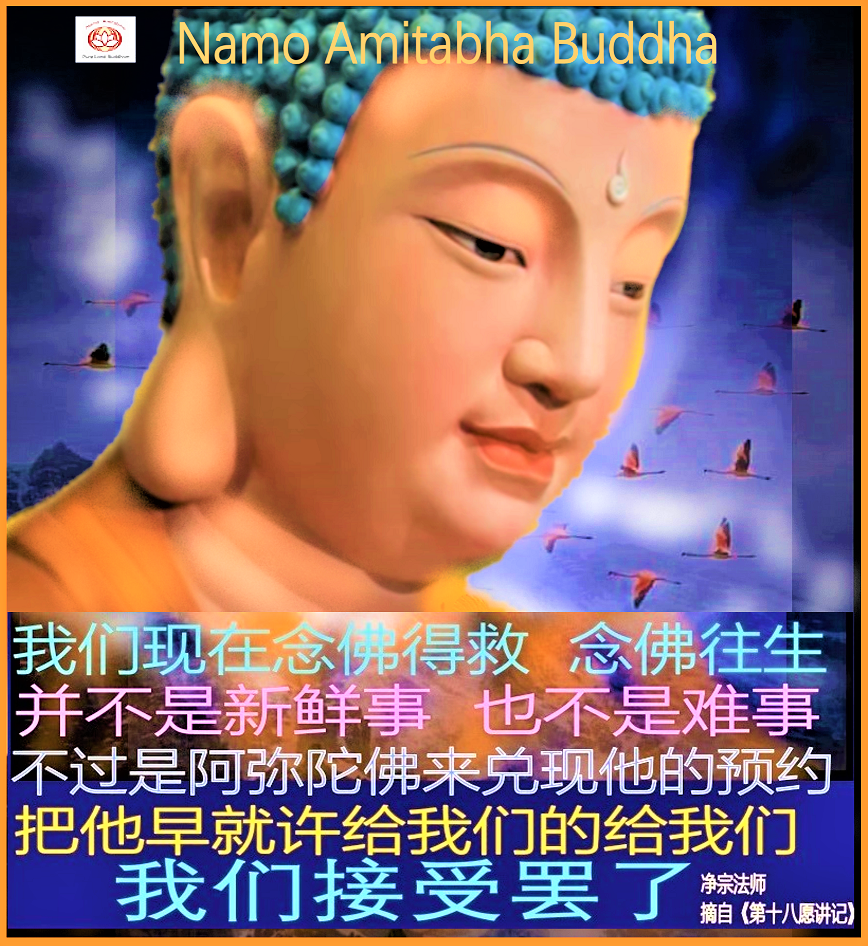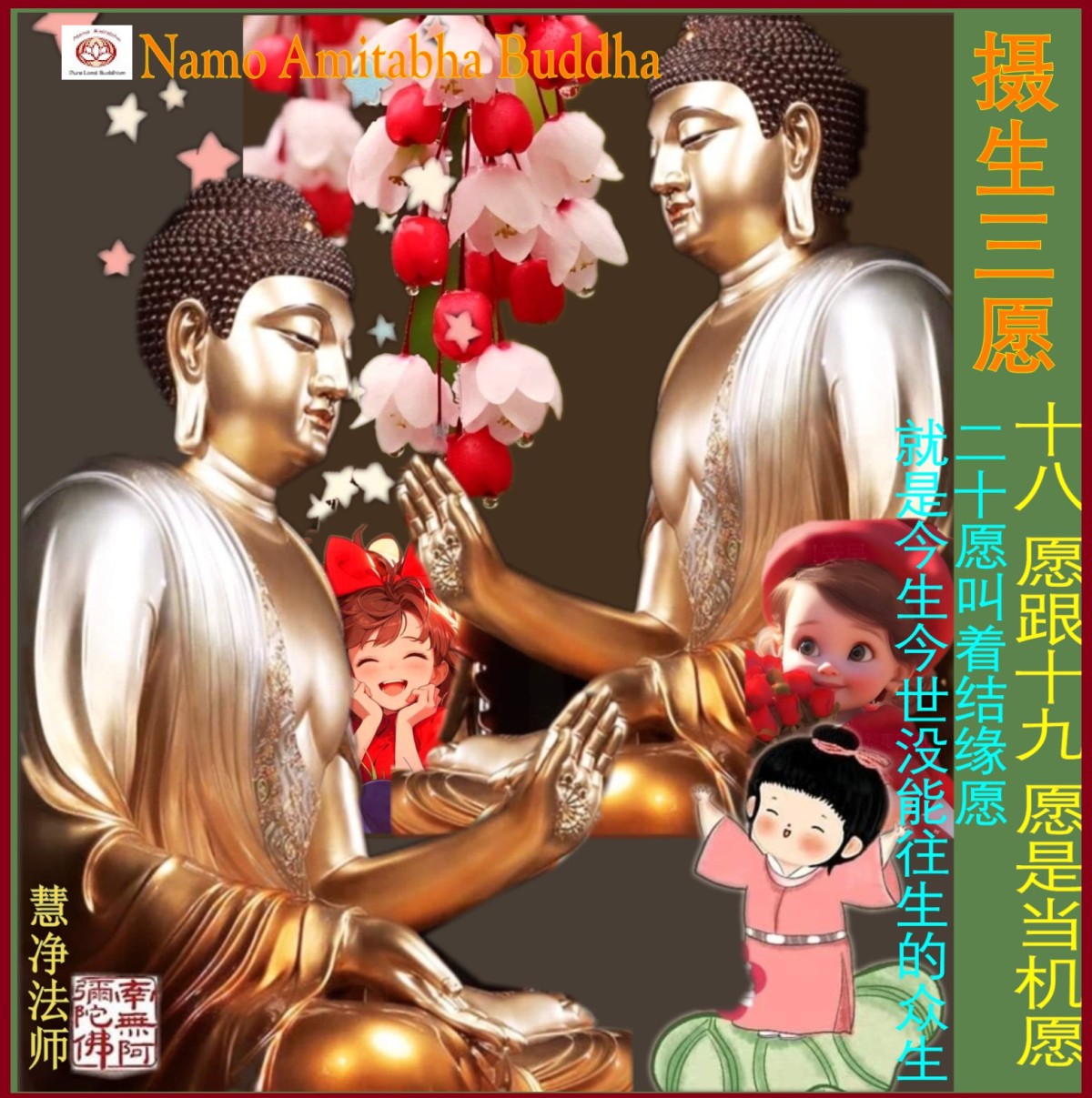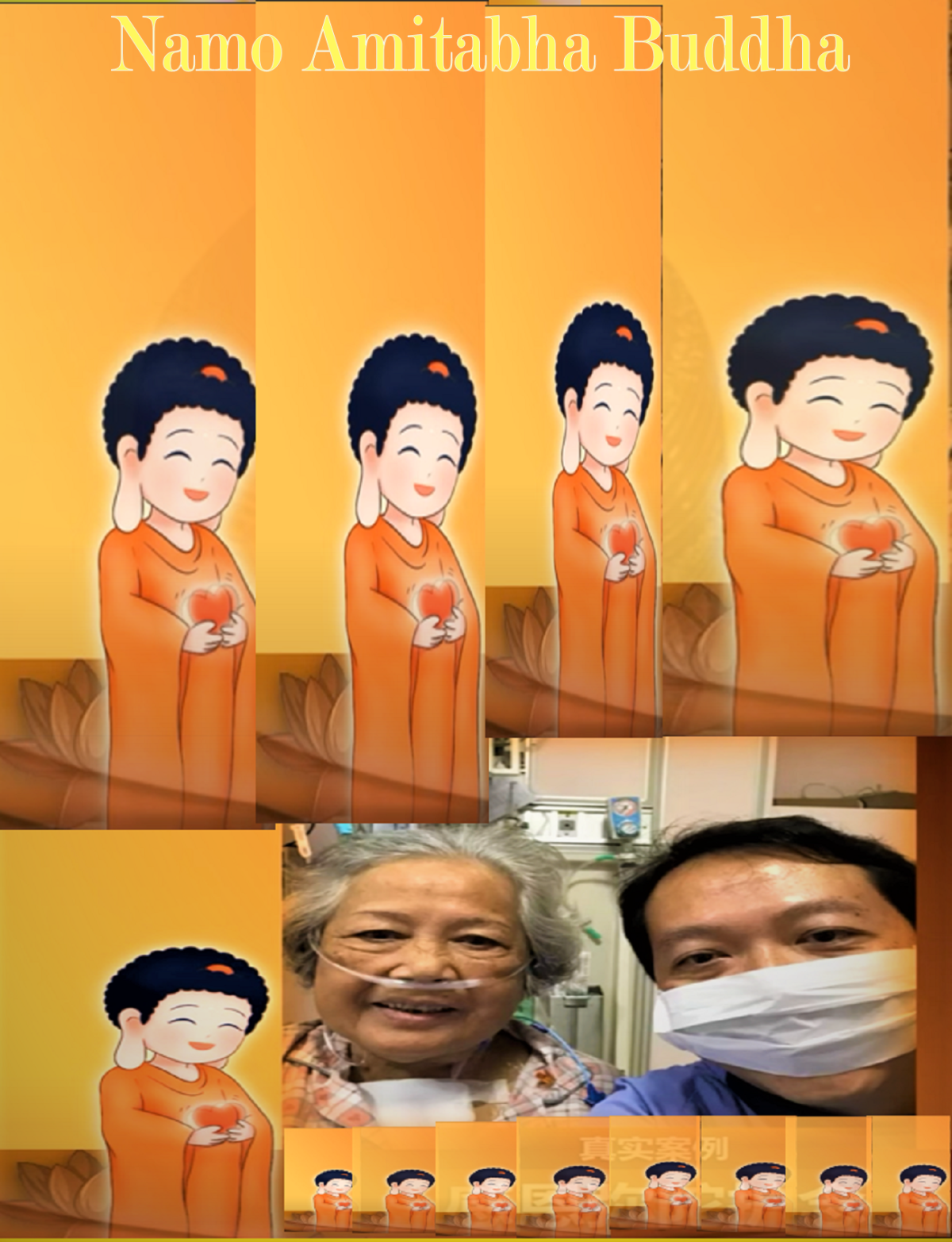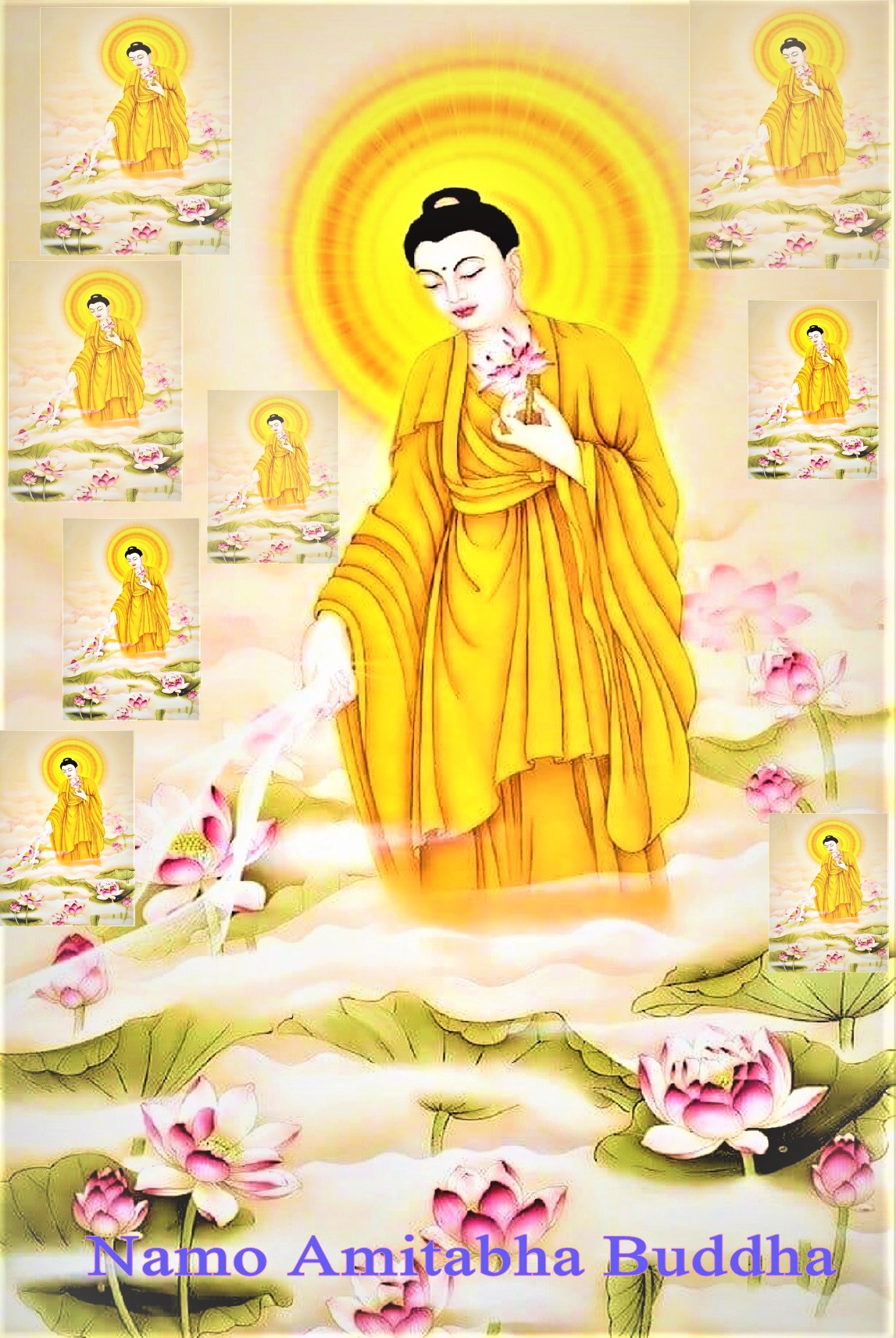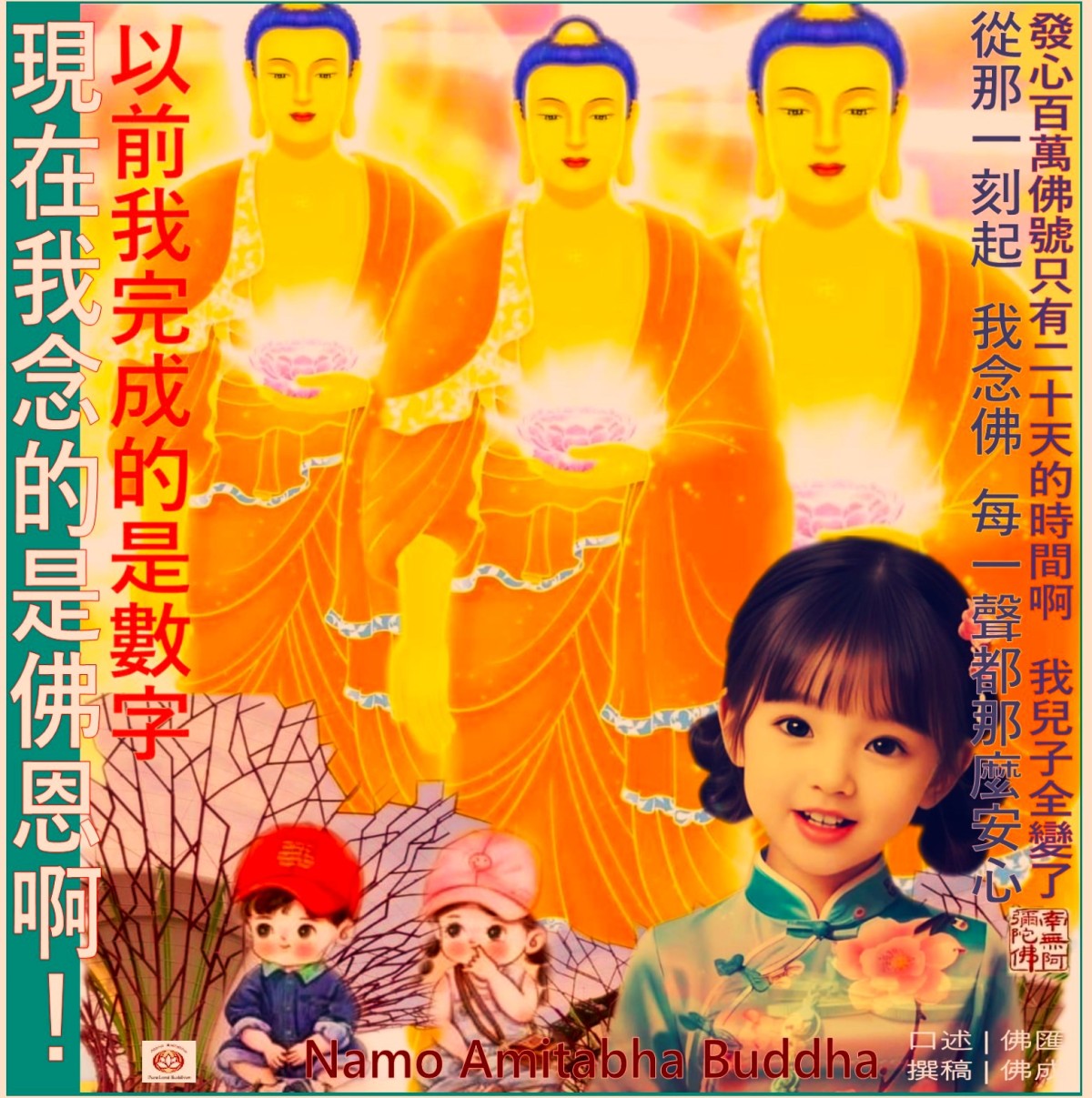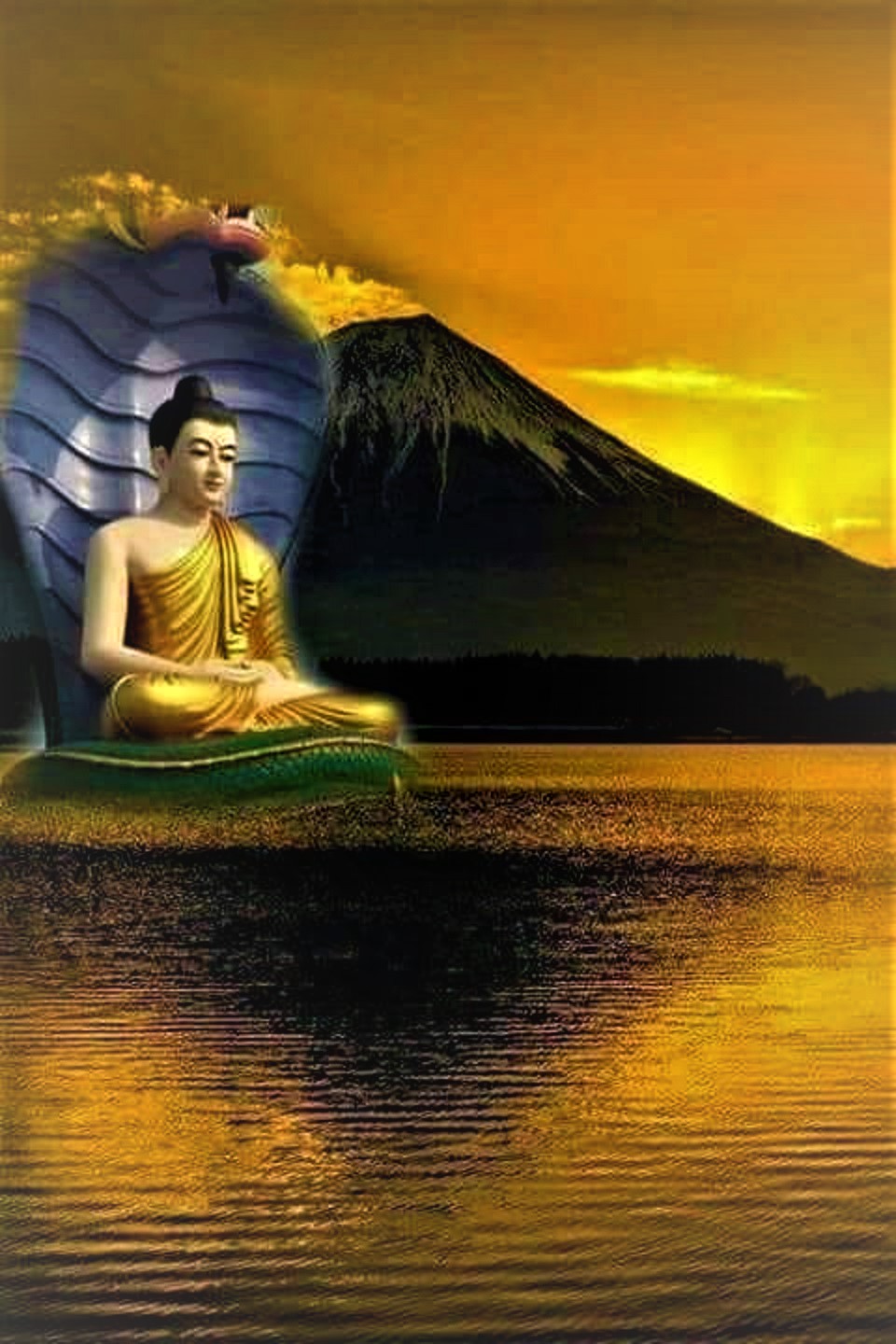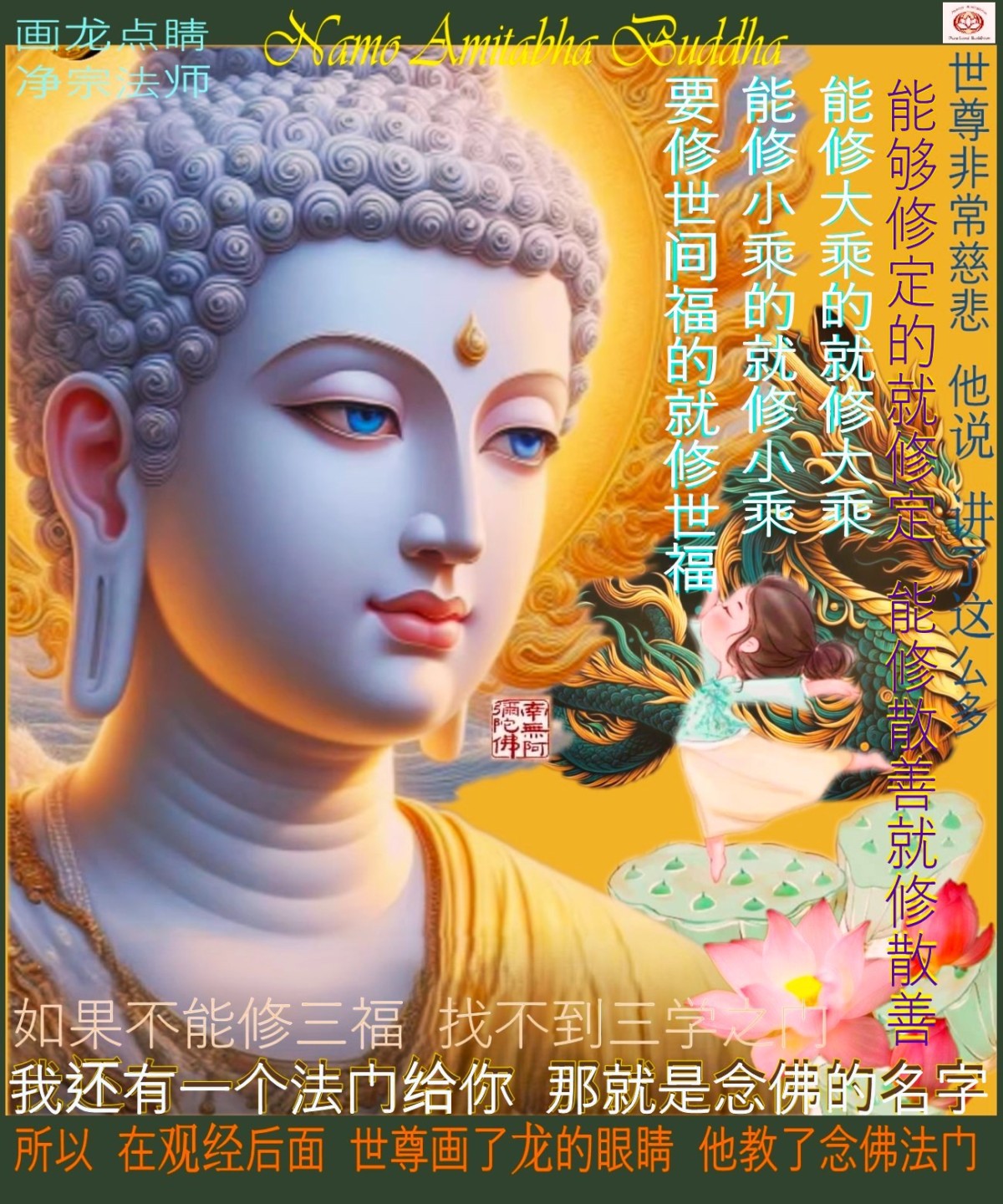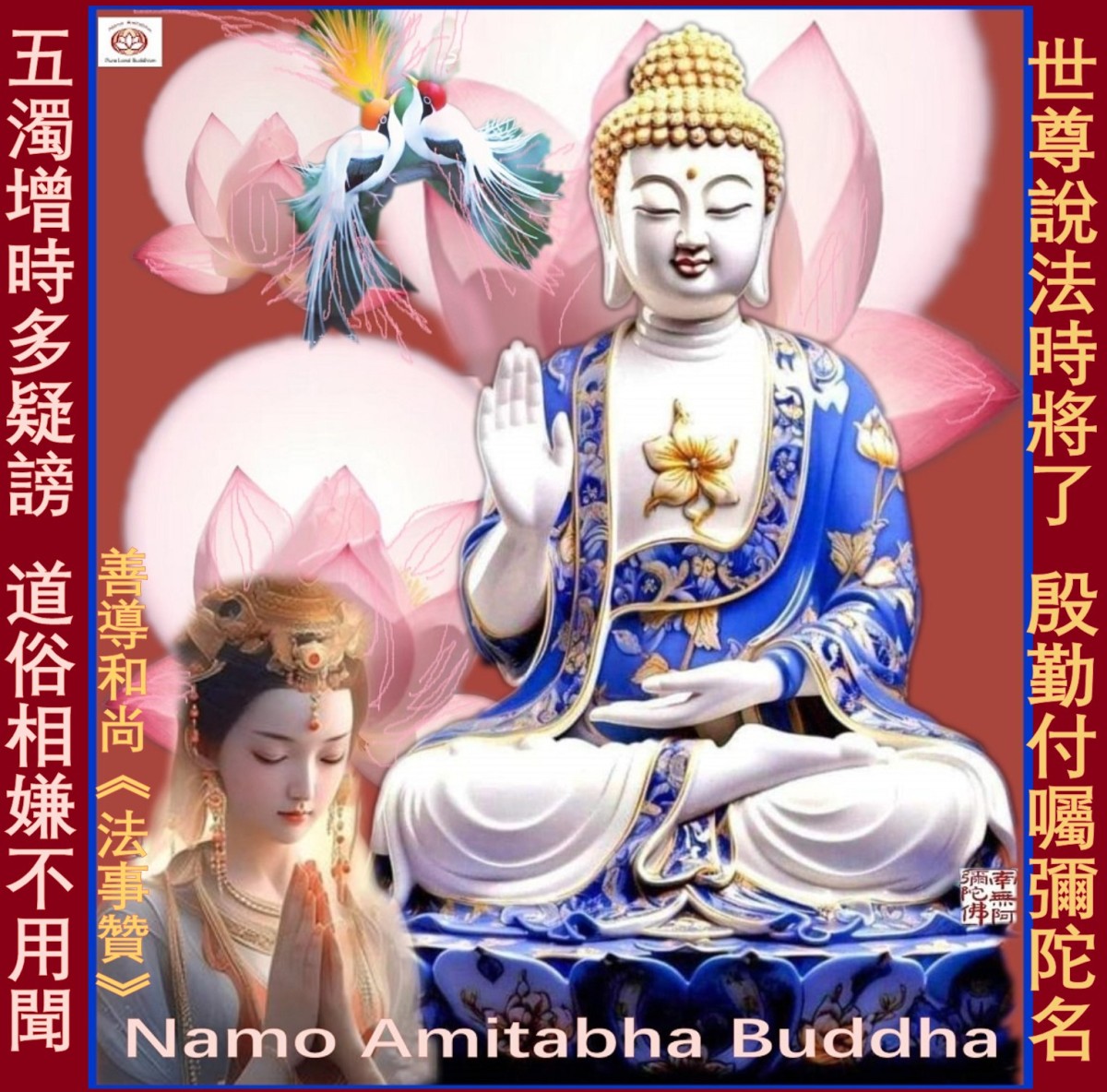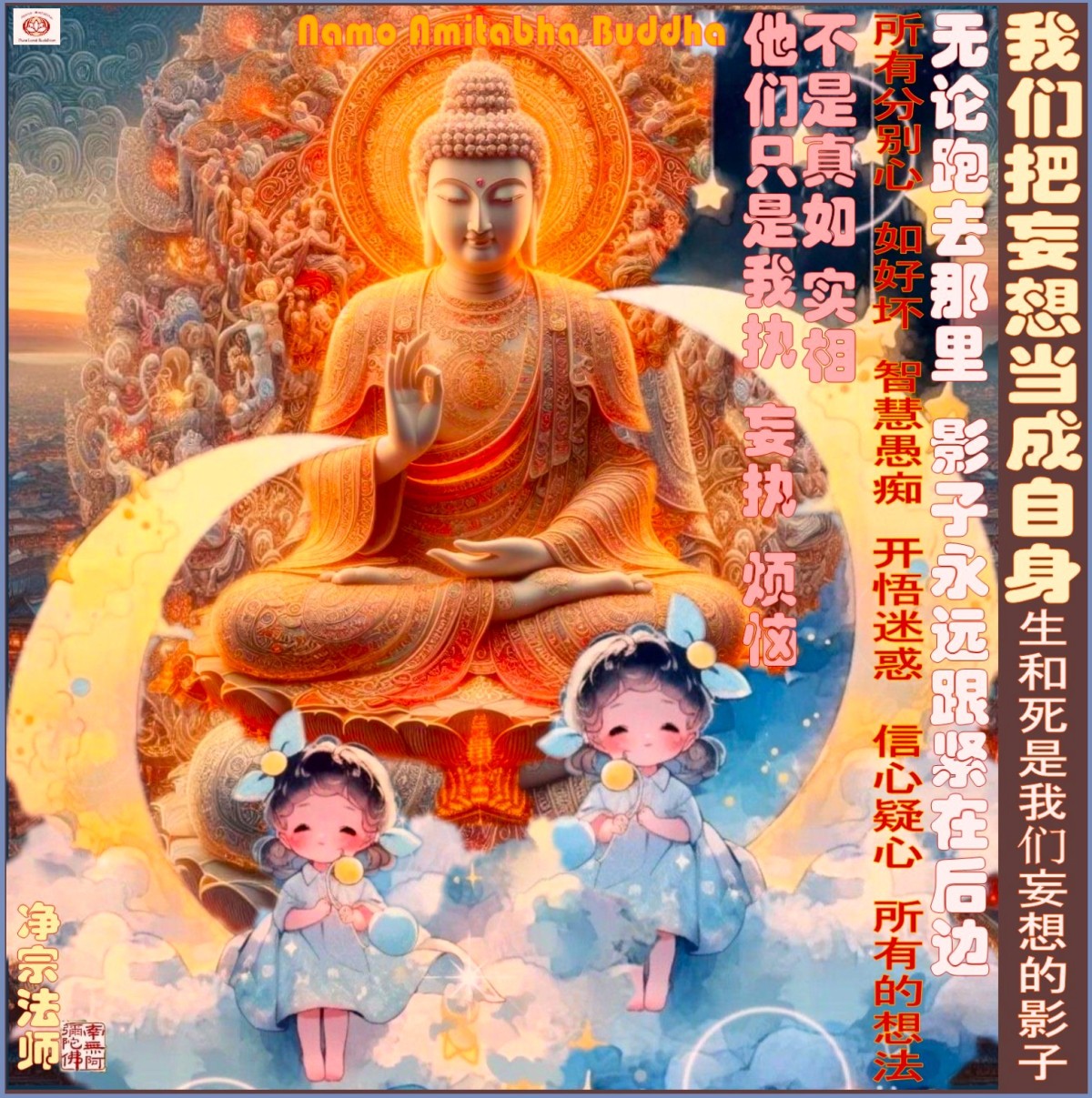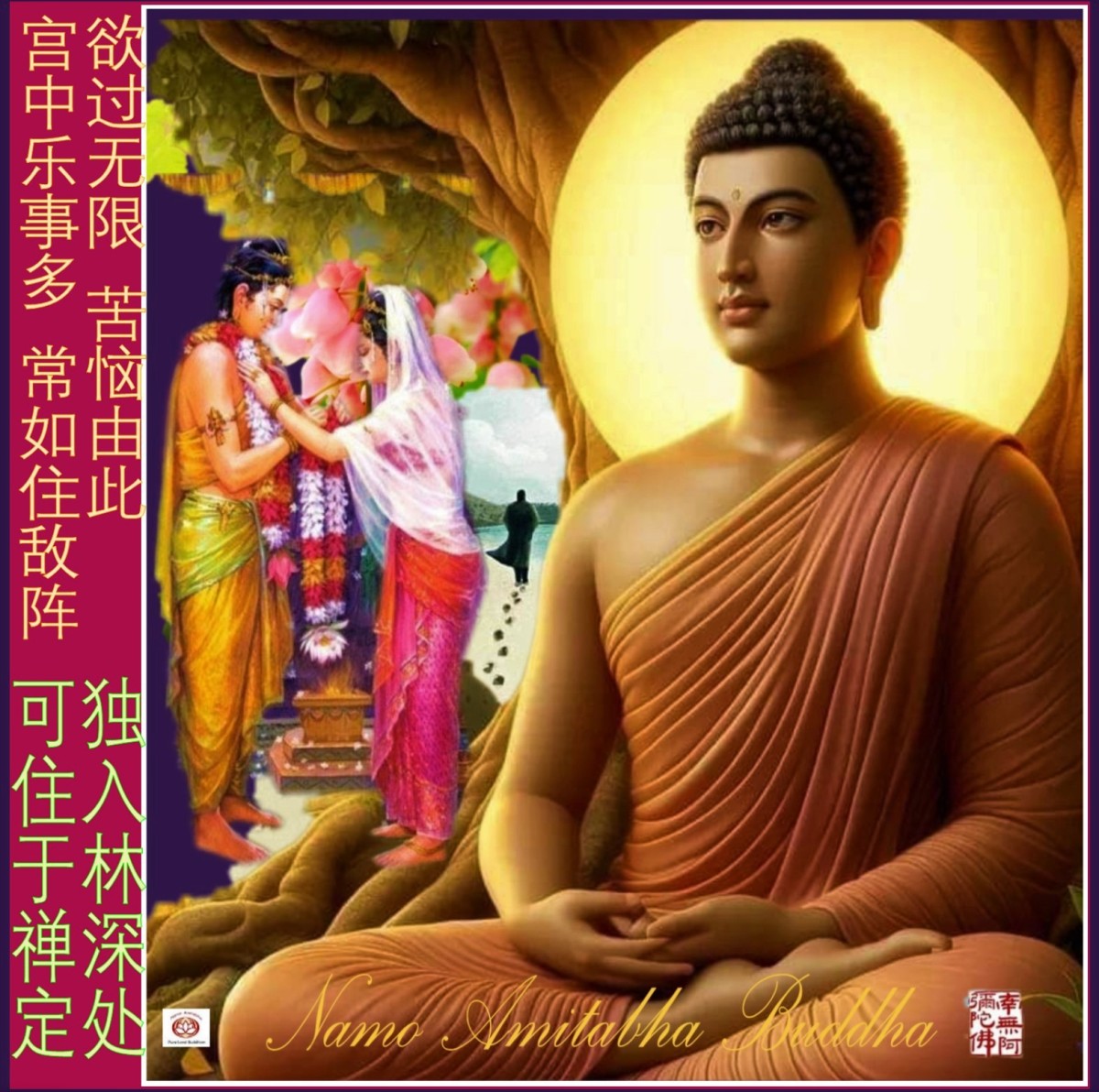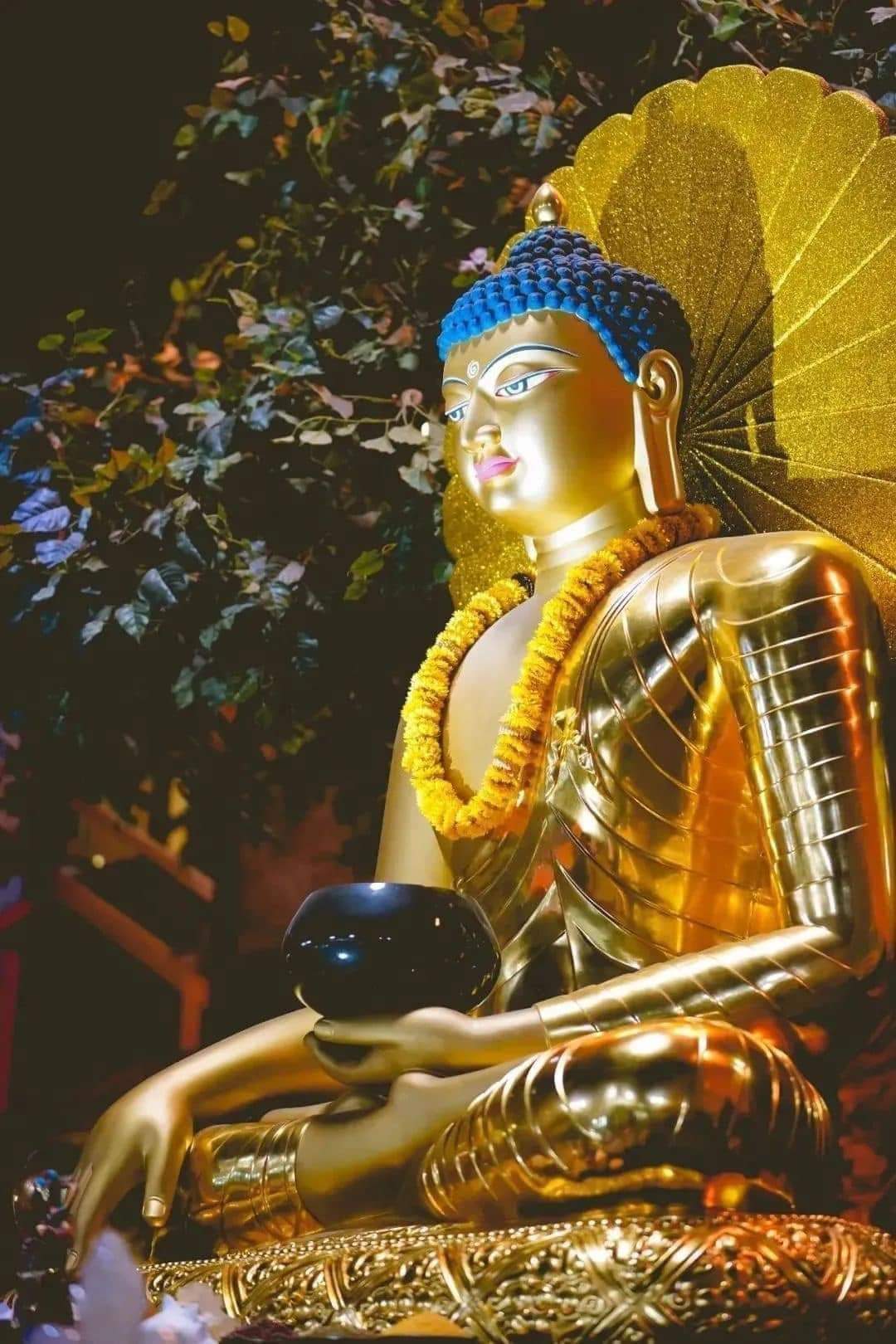(2) The gain and loss of being exclusive or mixed
(二)專雜得失
Great Master Shandao has mentioned the gain and loss in the exclusive practice and the mixed practices, in the Verses of praise and rites on attaining a rebirth. He teaches the four types of gain and the thirteen types of losses- the ‘4 benefits and 13 drawbacks.’ In general, the conclusion is still a gain and a loss. Those who recite Namo Amitabha Buddha exclusively will surely attain a rebirth and those who cultivate mixed practices lose the chance to attain a rebirth.
善導大師《往生禮讚》同樣說到專和雜的得失,講到專修有四種得,雜行有十三種失——「四得十三失」。總結起來,還是一得一失:專修念佛必得往生,雜修之人失去往生。
1.The four benefits in exclusive recitation of Amitabha Buddha
Here I will first discuss the benefits in exclusive practice.
If a man is able to recite continually as I have mentioned above, until the time he passes away, out of ten people, ten will attain a rebirth. A hundred people practise in this way, a hundred will attain a rebirth.
The former three phrases are the causes of his practice while the latter two phrases show the response of fruition.
1.專修四得
先說專修之得:
若能如上念念相續,畢命為期者,
十即十生,百即百生。
前三句是行因,後二句明感果。
‘as I have mentioned’: refers to the bringing forth of the three minds, the four practices and five mindfulness to recite Namo Amitabha Buddha exclusively.
「如上」:像前面所講的,發三心,修四修,行五念,一向專稱彌陀佛名。
‘recite continually until the time he passes away’: Once he has taken refuge in the buddha, he will always take refuge in the Buddha. Once he has recited Namo Amitabha, he will recite Namo Amitabha Buddha forever until his deathbed, without a change. Once he has brought the mind to take refuge in Amitabha Buddha, he will be taking refuge in Amitabha Buddha in every thought, until his deathbed. There is not one single mindfulness that he is not taking refuge in the Buddha. Once he has faith in the rescue of Amitabha Buddha, in every mindfulness, she believes and accepts the rescue of Amitabha Buddha until his deathbed. There is not a single thought that he disbelieves, not accepting the Buddha. In a single thought that he desires to attain a rebirth in the Pure Land of Amitabha Buddha, in every thought he seeks to be born until his deathbed. There is not a single thought that he refuses to seek a rebirth. In one single recitation of the Amitabha Buddha’s Name, he recites continually until his deathbed. There is not a single thought that he does not recite exclusively.
「念念相續,畢命為期」:一歸永歸,一念永念,直到命終,沒有改變。一念歸命阿彌陀佛,即念念歸命,直到命終,無有一念不歸命;一念信受彌陀 救度,即念念信受,直到命終,無有一念不信受;一念願生彌陀淨土,即念念願生,直到命終,無有一念 不願生;一念專稱彌陀佛名,即念念專稱,直到命終,無有一念不專稱。
Out of ten people, ten will attain a rebirth. A hundred people practise in this way, a hundred will attain a rebirth.’ If he recites Namo Amitabha Buddha exclusively in this manner, out of ten people, ten will attain a rebirth. Out of a hundred people, a hundred of them will attain a rebirth. Out of a thousand people, a thousand people will attain a rebirth. No one will be left out.
「十即十生,百即百生」:如果這樣專修念佛,十個,就十個往生;一百個,就一百個往生;一千個,就一千個往生:沒有一個不往生的。
Why is this so?
何以故?
This is because there are no other mixed conditions and he obtains the Right mindfulness. His practice is in accord with the Original Vows of the Buddha. He does not go against the Buddha’s teachings. He acts in accord with the Buddha’s words. Why does he behave in this way? There are four points.
無外雜緣得正念故;
與佛本願得相應故;
不違教故;
隨順佛語故。
為什麼會這樣呢?說了四點。
1.As there are no other mixed conditions, he obtains the Right mindfulness.
As he recites Namo Amitabha Buddha exclusively, there is no other mixed condition to disturb him. This will guarantee that he dwells in proper mindfulness solidly, continually. So, out of ten people who cultivate in this manner, ten will attain a rebirth. Out of a hundred people who practise in this way, a hundred will attain a rebirth. External is corresponding to internal, mixed is corresponding to proper, the conditions are corresponding to the causes. As we have eradicated the external mixed conditions, the internal proper causes are protected. Proper mindfulness is the proper cause. Once the proper cause is confirmed, there will certain be the fruition.
(1)無外雜緣得正念故
因為專修念佛,沒有外來種種雜緣的干擾,保證了內心正念堅固,正念相續,所以十即十生,百即百生。外與內相對,雜與正相對,緣與因相對。既除外雜緣,能護內正因,正念即是正因,正因決定,感果必定。
The four types of mixed conditions: The mixed practices are the conditions of practice for the mixed practitioners. The exhortation of mixed practices is the teaching condition. The mixed practitioners are the condition of their affinities. The place where they cultivate the mixed practices is the condition of their dwelling. Here, the four types of mixed conditions in the practice, in the teaching, in the people and in the dwellings are in a state of confusion. They come forth from outside and they can disturb our mind internally. This is known as the external mixed conditions.
雜緣有四種:雜行之行緣,勸修雜行之教緣,雜行人之人緣,修雜行處所之處緣。此行、教、人、處四種雜緣,交錯動亂,從外而來,能擾內心,稱外雜緣。
Now, we do not practise the mixed practices. We do not listen to the exhortation of the mixed practitioners. We do not stay close to the mixed practitioners. We stay apart from the dwelling of mixed practices. So, externally, there are no conditions of mixed practices. We will obtain Proper mindfulness. Some people thought that the absence of disturbance of external issues is known as ‘No mixed conditions externally.’ This is a misinterpretation.
今不修雜行之行,不聽雜行之勸,不親雜行之人,不近雜行場所,無外雜緣,即得正念。有人以為念佛時不能有任何事緣打擾才是「無外雜緣」,這是誤解。
(2) As the practice is in accord with the Buddha’s Original Vows
Amitabha Buddha’s Original Vows is thus stated, ‘Living beings in the ten directions who recite my name exclusively are born in my Pure Land.’ So, we should recite Namo Amitabha Buddha. This is in accord with the Original Vows of Amitabha Buddha. As we are in accord with Amitabha Buddha’s Original Vows, we will be gathered in by Amitabha Buddha’s bright illumination. We can rely totally on the strength of Amitabha Buddha’s Original Vows to attain a rebirth. Ten people practise in this way, ten will attain a rebirth. A hundred people practise in this way, a hundred of them will attain a rebirth.
(2)與佛本願得相應故
阿彌陀佛的本願說:「十方眾生,專念我的名號,往生我的淨土」,那我們就念佛,這樣就跟彌陀本願相應;與彌陀本願相應,就蒙受彌陀光明攝取,全乘彌 陀本願力,十即十生,百即百生。
(3) As he does not go against the Buddha’s teaching
We do not go against the earnest exhortation of Sakyamuni Buddha’s teachings in the three Pure Land Sutras as he has earnestly exhorted all the living beings, all the mundane men to act in accord with his teachings.
In the Sutra of Immeasurable Lifespan, Sakyamuni Buddha has exhorted us as follows, ‘People of the superior root potential should recite the Buddha of Immeasurable Lifespan exclusively. People of the medium root potential should also recite the Buddha of Immeasurable Lifespan exclusively. People of the inferior root potential should also recite the Buddha of Immeasurable Lifespan exclusively. It means people of the three roots nature should recite Namo Amitabha Buddha exclusively.’ When we recite Namo Amitabha Buddha exclusively, we are in accord with the exhortations of Sakyamuni Buddha.
In the Contemplation Sutra, Sakyamuni Buddha has thus exhorted us, ‘Even though I have taught the benefits of Samadhi door and the door of mixed practices, I Sakyamuni Buddha aims at exhorting you to recite the Buddha’s Name, Namo Amitabha Buddha exclusively!’ When we are reciting Namo Amitabha Buddha, we are in accord with the exhortation of Sakyamuni Buddha in the Contemplation Sutra.
In the Amitabha Sutra, Sakyamuni Buddha has thus exhorted us, ‘The mundane men in the evil world of five turbidity cannot attain a rebirth in his Nirvana realm of Ultimate Bliss as they are lacking in good roots, blessings and virtues. On hearing the Buddha’s Name Namo Amitabha Buddha, they should uphold the Buddha’s Name and recite Namo Amitabha Buddha exclusively. They will surely attain a rebirth!’ When we recite Namo Amitabha Buddha exclusively, we are in accord with the exhortation of Sakyamuni Buddha in Amitabha Sutra.
(3)不違教故
不違背釋迦牟尼佛在淨土三經中對凡夫眾生的懇切教導。
釋迦牟尼佛在《無量壽經》裡教導我們說:上等根機的人,要一向專念無量壽佛;中等根機的人,也要一向專念無量壽佛;下等根機的人,還是要一向專念無量壽佛——上中下三根都要一向專念。我們一向專念,隨順了釋迦牟尼佛的教導。
釋迦牟尼佛在《觀經》裡教導我們說:「雖說定散兩門之益,我釋迦佛的本意,是讓你一向專稱彌陀佛名!」那我們念佛,就隨順了釋迦牟尼佛在《觀經》裡的教導。
釋迦牟尼佛在《阿彌陀經》裡教導我們說:「五濁惡世的凡夫,少善根福德因緣不能往生彼極樂涅槃界。聞說阿彌陀佛,執持名號,專念彌陀,決定往生!」那我們專修念佛,就隨順了釋迦牟尼佛在《阿彌陀經》裡的勸導。
(4) As he acts in accord with the Buddha’s words
We should listen to the Buddha’s words, acting in accord with the Buddha’s teaching because the speech of the Buddha is genuine, truthful, without falsities. That is why ten people recite Namo Amitabha Buddha, ten will attain a rebirth. A hundred men recite Namo Amitabha Buddha, all of them will attain a rebirth. The Buddha’s words refer to the sincere words of authentication by the Buddhas in the six directions, in Amitabha Sutra. All the Buddhas extend the feature of a long and broad tongue and say, ‘All the living beings, you should believe and have faith in the inconceivable merits and virtues of Amitabha Buddha. You should cultivate Amitabha recitation exclusively. You will surely attain a rebirth! We the Buddhas come forth to bestow the authentication together. We will bestow the protection together.’ When we recite Namo Amitabha Buddha, not only that we are in accord with the Original Vows of Amitabha Buddha, we are also acting in accord with the teachings of Sakyamuni Buddha, acting in accord with the sincere authentication of the Buddhas in the ten directions. Hence, our mind is in response to the mind of all the Buddhas. We will receive the protection of all the Buddha from the six directions, equivalent to the Ganges sands as they have bestowed upon us the sincere authentication. That is why it is said, ten people recite Namo Amitabha Buddha, ten will attain a rebirth, a hundred recite Namo Amitabha Buddha, a hundred will attain a rebirth.
(4)隨順佛語故
聽佛的話,順佛的教,佛為真語者、實語者,決定不虛,所以十即十生,百即百生。「佛 語」是指《阿彌陀經》當中六方諸佛的證誠之語。諸佛都出廣長舌相說:「汝等眾生,當信是阿彌陀佛不可思議功德。專修念佛,決定往生!我等諸佛,齊來證明,共同護念。」那我們來念佛,不僅是順了阿彌陀佛的本願,也是順了釋迦牟尼佛的教導,也是順了十方諸佛的證誠。這樣,我們跟一切諸佛的心都很相應,蒙受六方恆河沙諸佛證誠護念,所以十即十生,百即百生。
In the first point, we say ‘As there are no other mixed conditions, he obtains the Right mindfulness’, as such he will certainly attain a rebirth. The second point: ‘As the practice is in accord with the Buddha’s Original Vows’, he will surely attain a rebirth. Then, what is the reason that we do not place ‘As the practice is in accord with the Buddha’s Original Vows’ as the first point? The Original Vows of Amitabha Buddha is the foundation of the Pure Land Teaching! This is because the mind of a mundane man is easily moved by external conditions. The conditions are very important. That is why it is necessary to have the first point, ‘As there are no other mixed conditions, he obtains the Right mindfulness’. Only then there is the second point ‘As the practice is in accord with the Buddha’s Original Vows’. This is the sequential relations of the two points.
上面第一點說「無外雜緣得正念」,所以必得往生;第二點說「與佛本願得相應」,所以必得往生。那麼,為什麼不把「與佛本願得相應」放在第一句呢?彌陀本願是最根本的啊!這是說明我們凡夫的心隨緣易動。緣很重要。先有第一點「無外雜緣得正念」,才有第二點「與佛本願得相應」,有這樣前後次第生起的關係。
Without the first point, it is for sure there is no second point. We should not cheat ourselves, saying, ‘I know the Original Vows of Amitabha Buddha already. I understand it and this means I am in response to the mind of the Buddha.’ After this, he goes out ‘to get close to the mixed conditions, happily.’ By doing so, he is naturally alienated to Amitabha Buddha. Later, he will act in accord with conditions and change, losing the exclusive recitation. So, when we are practising Amitabha recitation, we should firmly eradicate all the external conditions, to recite Namo Amitabha Buddha exclusively. As long as you can recite Namo Amitabha Buddha, naturally, you will ‘in accord with the Buddha’s Original Vows.’ This is in accord with the wonderful path in a hidden manner.
失去第一點,決定沒有第二點。不要講大話:「我知道阿彌陀佛本願了,聽懂道理了,我懂得就是相應了。」然後出去「樂近雜緣」,這樣自然就和阿彌陀佛疏遠了,最後隨緣改轉,失去專修。所以,應該在行持方面牢牢地摒去外緣,專修念佛。只要你專修念佛,自然就「與佛本願得相應」,暗合道妙。
In our surrounding, we often see those elders who are illiterate, who have no other talents except the recitation of Namo Amitabha Buddha. In this way, no other external conditions are able to affect such a lady because she has decided to hold on to Namo Amitabha Buddha tightly. Their attainment of a rebirth is most magnificent. While those who are so clever, who are educated, who can read the books, who have so many friends, are often pulled away by the mixed conditions and lose their right mindfulness. Finally, they die in delusion, pitifully.
現實當中,往往一些不識字的老太婆,一無所能,只會念佛,這樣一切外雜之緣動她不得,拼死抱定這句南無阿彌陀佛,往生很殊勝。而一些聰明人,能識字,會看書,交遊廣,往往被雜緣所牽,失去正念,死得糊里糊塗。
In Buddhism, we talk about causes and conditions. When the causes and conditions come together, there comes forth the fruitions. Comparatively, in the Door of the Sagely Path, self-effort is stressed in cultivation. Hence, they pay more attention to the causes. In the Pure Land Door, the rescue of the Buddha is to rely on the Buddha’s Power. So, the stress is on the conditions. In the Verses of Praise of the Dharma Work, Great Master Shandao has thus said,
佛教講因緣,因緣和合才有果。但比較起來,聖道門講自力修行,更重視因;淨土門靠佛力救度,更強調緣。善導大師《法事讚》說:
The road to return home in the West is pointed out especially, exclusively. This teaching is destroyed by others as such everything remains unchanged. This has often been happening throughout the long Kalpas. It is not only in this life that we are enlightened to this. But as we have not met with the good and strong conditions, we fall into transmigration. It is very difficult to be saved. Today and at this time, I am listening to this important Dharma. Until the time of my passing away, I am resolute in vows to attain a rebirth.
專專指授歸西路,為他破壞還如故。
曠劫以來常如此,非是今生始自悟。
正由不遇好強緣,致使輪迴難得度。
今日今時聞要法,畢命為期誓堅固。
2 The thirteen losses in the mixed practices
On the contrary, Great Master Shanadao has thus said, ‘If you desire to abandon exclusive practice and take part in the mixed Karma instead, out of a hundred men who seek a rebirth, it is very rare to find one or two who can attain a rebirth. Out of a thousand men, rarely can we find three to five people who can attain a rebirth.
2.雜行十三失
反過來,善導大師說:
若欲捨專修雜業者,
百時稀得一二,
千時稀得三五。
‘If’ means assuming. In the assumption, a man ‘desires’ means ‘he is thinking’. What is he thinking of? ‘He abandons the exclusive practice to cultivate the mixed practices.’ He left the exclusive recitation of Amitabha Buddha to practise mixed practices. Why is it known as ‘abandoning’? It means that he has heard about the exclusive recitation of Amitabha Buddha. Originally, he can choose to cultivate exclusively. But he abandons it as he does not choose to cultivate exclusively. He goes forth to mixed practices. Or in his mind, he has once thought about the exclusive recitation. Or that he even has cultivated exclusive recitation for a short while. But later all kinds of mixed conditions arise and this hinder him from the exclusive practice. He abandons the exclusive practice to cultivate the mixed practices. Or if he has never heard of the exclusive practice. He simply has no idea about the exclusive practice. He is always practising the mixed practices. For him, there is no such thing as abandon or not abandoning. Anyway, it is still the mixed practices. The consequence will be the same.
「若」是假設,假設有人;「欲」是想。想什麼呢?「捨專修雜」,捨掉專修,而修雜修。為什麼叫「捨」?就是說曾經聽到過專修,本來可以選擇專修,但是他捨掉,沒選專修,而去雜修;或者心裡雖一度想專修,甚至專修過一段時間,可是最後被種種雜緣破壞,就捨了專修,而修雜修。如果從來就沒聽說過專修,根本不知道什麼是專修,而是一向雜修,也就沒有什麼捨不捨。但總之都是雜修,結局一樣。
For those who do not know about exclusive recitation of Amitabha Buddha all these whiles they can be forgiven. But those who have the conditions to practise exclusive recitation refuse to cultivate exclusively, and prefer the mixed practices are making a great mistake. Because of such people, Great Master Shandao has decided to exhort them.
不過一向不知道專修的人,那是沒有辦法,情有可原;有緣專修而不專修,反而雜修,那就是太失誤了。善導大師正是就這種人而加以勸誡。
Why do they abandon exclusive recitation of Namo Amitabha Buddha? The first reason is they are the deluded ones. They are suspicious of the Buddha’s wisdom. They cannot believe in the exclusive recitation of the Buddha’s Name. Secondly, out of arrogance, they think they are very great. They feel that they have the ability to practise the Buddha’s Path. The exclusive recitation of Namo Amitabha Buddha is nothing to them as they are too arrogant. They treat Amitabha recitation as lowly.
為什麼會捨專修雜?一是愚癡心,疑惑佛智,對專稱名號信不過;二是驕慢心,自以為是,以為自己很能,專修念佛沒什麼了不起,把自己看高了,把念佛看低了。
Great Master Shandao has thus said, earnestly, ‘If you choose to abandon the exclusive Amitabha recitation to cultivate the mixed practices,’ what will the consequences be?
善導大師很懇切地講,「若欲捨專修雜業者」,得到的結局怎麼樣呢?
By practising the mixed practices to seek a rebirth, out of a hundred men, rarely can you find one or two who can attain a rebirth. Out of a thousand man, rarely can you find three to five men who can attain a rebirth. Very often people would ask, ‘What is the reason that many people desire to attain a rebirth yet very few can attain it?’ Here is the reason. They have abandoned the exclusive recitation to cultivate mixed practices. If they can renounce the mixed practices to cultivate exclusive recitation of Namo Amitabha Buddha, ‘Out of ten men, ten will attain a rebirth. Out of a hundred men, a hundred of them will attain a rebirth.’
修雜業求往生,一百個裡面稀有難得一兩個往生,一千個裡面稀有難得三五個往生。往往有人問:「怎麼願往生的人多,實際往生的人少呢?」原因就在這裡,捨專修雜。如果捨雜修專,「十即十生,百即百生」。
What are the reasons that the mixed practitioners will be difficult to attain a rebirth? Great Master Shandao has listed the thirteen reasons.
修雜為什麼難往生呢?善導大師講了十三點。
Why is this so?
Because of the chaotic mixed conditions, right mindfulness is lost.
Because this is not in accord with the Original Vows of the Buddha.
Because this is going against the teachings.
Because this is not in accord with the Buddha’s words.
Because mindfulness is often discontinued.
何以故?
乃由雜緣亂動失正念故;
與佛本願不相應故;
與教相違故;
不順佛語故;
繫念不相續故;
Because the thoughts on the practice is interrupted.
Because the transference of merits is insincere and ingenuine.
Because of the interruptions of various views and afflictions of greed and hatred.
Because he does not harbour a mind of regrets and repentance.
Besides, there is no continuity in his mind to repay the kindness of that Buddha.
Because of a mind of arrogance and humiliation, he practices Amitabha recitation which is more in accord with fame and benefits.
憶想間斷故;
迴願不殷重真實故;
貪瞋諸見煩惱來間斷故;
無有慚愧懺悔心故;
又不相續念報彼佛恩故;
心生輕慢,雖作業行,常與名利相應故;
Because he covers himself in differentiating self and others, he does not get closed to the good knowing advisers of the same practice.
Because he enjoys the company of the mixed conditions. This is hindering the proper practice of attaining a rebirth for him and others.
The four points in front are just the opposite of the four benefits in exclusive practice.
人我自覆,不親近同行善知識故;
樂近雜緣,自障障他往生正行故。
前面四點,跟專修四得正好相反。
1.Because of the chaotic mixed conditions, right mindfulness is lost.
‘Mixed conditions’ refer to the practice is mixed practices, the teaching is on mixed practices, the people cultivate mixed practices, the place is for mixed practices. All these mixed conditions are in chaotic conditions. As such the mind and resolution are not exclusive. Such a man will lose his right mindfulness. Right mindfulness is the cause. Once we have lost right mindfulness, the cause is incomplete and we lose the fruitions. The great benefit of attaining a rebirth is lost.
(1)雜緣亂動失正念故
「雜緣」,雜行之行、雜行之教、雜行之人、雜行場所,這些雜緣交錯動亂,讓心志不能專一,失去正念。正念為因,既然失去了正念,因虧果失,往生大利就失掉了。
2.Because this is not in accord with the Original Vows of the Buddha.
The practice of mixed practices is not in accord with the Original Vows of Amitabha Buddha. Such a man is not gathered in by the bright illumination of Amitabha Buddha. For example, Amitabha Buddha rescues us with his ship of Great Vows, the six syllables Name so that we can travel across the oceans. As long as we want to go up his ship of Vows, he is able to rescue us to cross the great seas of births and deaths. The problem is we refuse to go up Amitabha Buddha’s Ship of Great Vows. How are we going to cross the oceans?
Even though you might possess such great ability, that you are of the supreme roots with sharp wisdom, you are not in accord with the Original Vows of Amitabha Buddha. You do not receive the bright illumination of Amitabha Buddha. How are you going to attain a rebirth?
(2)與佛本願不相應故
雜行雜修,與阿彌陀佛的本願不相應,不蒙受阿彌陀佛的光明攝取。就好像過海一樣,阿彌陀佛用六字名號大願船來救度我們,我們只要上他的願船,他就救度我們過生死大海。結果我們不上阿彌陀佛大願船,那怎麼能過海呢?
你縱有天大的本領,縱是上根利智,跟彌陀本願不相應,不受彌陀光明照攝,你怎麼能往生呢?
3. Because this is going against the teachings.
Not only that he is discordant to Amitabha Buddha’s Original Vows, he is also not acting in accordance to Sakyamuni Buddha’s teaching. Sakyamuni Buddha understands the root potential of living beings and he teaches the Dharma in accord with the principles and potentials. He told us if we desire to seek a rebirth in the Pure Land, we must recite Namo Amitabha Buddha exclusively! He has told us about this repeatedly. ‘It does not matter whether you are of the supreme roots, the medium roots or the inferior roots, everyone should recite Namo Amitabha Buddha exclusively!’
The explanation given by Great Master Shandao on ‘the passage of attaining of a rebirth by the three groups of people’ is as follows:
(3)與教相違故
不僅和阿彌陀佛本願不相應,也和釋迦牟尼佛的教導相違背。釋迦牟尼佛明瞭我們眾生的根機,說法契理契機,告訴我們想要求生淨土,就要一向專念!一而再、再而三地告訴我們:不論上根、中根、下根,都要一向專念!
善導大師解釋《無量壽經》的「三輩往生文」說:
The Buddha says that all living beings are of different root nature. Some are of the superior root nature while others are medium and inferior in their root nature. According to their root nature, the Buddha exhorts them to recite the Buddha’s Name of Immeasurable Lifespan. At their death -bed, the Buddha and the Sagely assemblies will naturally come forth by themselves to welcome him. Everyone can attain a rebirth.
佛說一切眾生根性不同,有上中下,
隨其根性,佛皆勸專念無量壽佛名;
其人命欲終時,
佛與聖眾自來迎接,盡得往生。
It does not matter what kind of root nature we are the Buddha has exhorted us to recite Namo Amitabha Buddha exclusively. If you desire to be born in the Western Land, the Buddha has thus said, ‘This is the Great road of exclusive cultivation as you will arrive there safely, directly. Everyone can practise Amitabha recitation. The other cultivations are the mixed small paths which are full of danger and obstacles. Out of hundreds of thousand men only one to two can practise in this way. So, it does not matter who you are. As long as you want to attain a rebirth, you should cultivate this Great path of exclusiveness in Amitabha recitation.
If you do not listen to the Buddha, that you choose to tread the mixed practices, mixed cultivation, the dangerous paths, naturally it is very difficult for you to attain a rebirth.
無論什麼根機,佛都勸我們一向專念彌陀名號。
欲生西方,佛說:這是專修大道,平安直達,人人可行;那是雜修小徑,重重險阻,百千人中稀有一二人可行。不論何人,真願往生,當行專修大道。
不聽佛言,非要走雜行雜修險路,往生自然困難。
4.Because this is not in accord with the Buddha’s words.
In Amitabha Sutra, all the Buddhas equivalent to the Ganges sands in the six directions have bestowed the sincere authentication to protect and care for the Amitabha reciters who practise exclusively. If you choose to practise the mix practices, you are not in accord with the Buddha’s wish. You will not be able to reap the care and protection of all the Buddhas who have bestowed upon us the sincere authentication. Naturally your attainment of a rebirth is difficult.
(4)不順佛語故
《阿彌陀經》中,六方恆河沙諸佛都證誠護念專修念佛之人。雜行雜修,等於跟諸佛唱反調,就不蒙受諸佛的證誠和護念,自難往生。
5.Because mindfulness is with no continuity.
The content after the fifth point is not listed by Great Master Shandao when he was teaching the ‘four benefits of exclusive recitation.’ But exclusiveness is opposite to mixed practices. The loss of mixed practices is the gain of the exclusive practices. Theoretically, this should be the case. So, we will still discuss them in comparison. By doing so, everyone can understand better.
(5)繫念不相續故
第五點以下的內容,善導大師在前面講「專修四得」時沒有列,但專雜相對,雜修之失正是專修之得,道理上是必然有的,所以我們還是對比著說明,讓大家容易理解。
The practitioner of the mixed practices also recites Amitabha Buddha. He also seeks to attain a rebirth in the World of Ultimate Bliss. But there are interruptions in his mindfulness to attain a rebirth. So, it is difficult for him to attain a rebirth.
雜行雜修的人,雖然也念阿彌陀佛,心繫極樂往生,但是他「繫念不相續」,所以難往生。
The exclusive cultivator of Amitabha recitation is mindful of Namo Amitabha Buddha continually. Surely, he will attain a rebirth. ‘is mindful of’ is very clear in appearance. ‘Mindful’ means that the mind is tied up to the Buddha’s Name. We tie up this mind to a certain object. This is known as being mindful of. When we recite Namo Amitabha Buddha and vow to be born in the Pure Land, it is like tying up our mind with the rope of six syllables Buddha’s Name. We tie up our mind to the Pure Land of Ultimate Bliss, to Amitabha Buddha’s form. The rope of the six syllables Buddha’s Name is made from the immeasurable lights and immeasurable lifespan of Amitabha Buddha. The rope is very firm and solid, with gentle tenacity. Exclusive recitation of Namo Amitabha Buddha means to tie up our heart with Amitabha Buddha tightly. It is a dead knot which cannot be opened. In this way we are mindful of Amitabha Buddha continually.
專修念佛,繫念相續,必得往生。繫念,很形象,念是心念,繫是捆繫;把心念捆繫在某一目標上,稱為繫念。念佛願生,如同用六字名號的繩,把我們的心綁在極樂淨土、阿彌陀佛身上。六字名號的繩,材料是阿彌陀佛的無量光、無量壽,很堅固,很柔韌。專修專念,等於把我們的心牢牢地與阿彌陀佛捆在了一起,是死扣,解也解不開:繫念相續。
A man who cultivates mixed practices is mindful of Amitabha Buddha once in a while. When he is practising the mixed practices, his mind is not tied to Amitabha Buddha’s Pure Land of Ultimate Bliss. Instead, it is tied to the mixed practices. That is why it is described as ‘mindfulness with interruptions.’ The mixed practitioner is mindful of Amitabha Buddha once in a while. It is a live knot, not a dead knot. At times he does not even tie it up. For him, the mixed practices are the dead knot. They are tied up to the five desires, the six dusts with death knots.
雜行雜修只是偶爾心繫阿彌陀佛,當修雜行的時候,心就沒有繫在阿彌陀佛極樂淨土了,而是繫在雜行方面,所以說「繫念不相續」。雜行之人偶爾心繫阿彌陀佛,是活扣,不是死扣,甚至沒有繫扣,反而和雜行是死扣,和五欲六塵是死扣。
Attaining a rebirth is a great matter in life. If we do not tie up our mind to Amitabha Buddha, how are we going to attain a rebirth? Surely Amitabha Buddha has the power to pull us up from the mud of births and deaths. If we tie up our mind to our mixed practices, is it possible to pull ourselves up from the mud to the shore? What I am afraid is that the more you struggle, the deeper you will sink down. As the mixed practitioners are not mindful of Amitabha Buddha continually, so, his attainment of a rebirth is uncertain. Before passing away, if he can be mindful of the Buddha, he will attain a rebirth. At the death bed, if he is unmindful of the Buddha he will fall. That is why the mixed practitioners stress that the last mindfulness should be on the Buddha recitation. Otherwise, they cannot attain a rebirth. This is because they are not mindful of the Buddha continually when they are still living.
往生大事,不心繫阿彌陀佛,怎麼能達成?只要心繫阿彌陀佛,阿彌陀佛決定有能力把我們從生死泥沼裡拔出來;心繫自己的雜行雜修,有可能把自己從泥沼中拉上岸嗎?恐怕越掙扎陷得越深。因為雜行繫念阿彌陀佛不相續,所以往生不定:命終時正當繫念佛號,則往生;命終時沒有繫念佛號,則墮落。故雜行之人強調臨終一念必須在佛號上,否則不能往生,因為平生繫念不相續。
If we are cultivating the exclusive recitation of Amitabha Buddha, we will spend our life in Amitabha recitation. Even at our death bed we are unable to recite Namo Amitabha Buddha, we will attain a rebirth certainly as we have been mindful of the Buddha continually.
專修念佛,一生皆繫在佛號上,即使臨終一念沒能念出佛號,也必定往生,因為繫念相續。
There are two types of ‘continuity’. One of them is the mind is mindful of the Buddha continually. Secondly, the practice is a continual practice. In this section we are talking of mindfulness, stressing on the mind. In the next section, we are talking about the thoughts on the practice. When the mind is mindful of the Buddha means we give up our life to Amitabha Buddha. Once we have given up our life, we will do so forever. Once we have faith in the Buddha, the faith remains the same forever. Once we are mindful of the Buddha, we are always mindful of the Buddha, until the last moment of our life. We will not retreat from our mindfulness. Once we have brought forth this mind, it will go on naturally. This is the same for everyone. But the practice might be different in accord with the root potential. But as long as he recites Namo Amitabha Buddha exclusively, sincerely without abandoning the practice, all these practices are known as continually.
「相續」有兩種,一是心相續,二是行相續。本條「繫念」主要說心,下條「憶想」即是說行。心相續,也就是歸命阿彌陀佛,一歸永歸,一信永信,一念永念,畢命為期,絕無退轉。此心一發起,自然相續。這在任何人都一樣。行則各有根機不同,但只要專修念佛,殷勤不捨,通通叫作相續。
Great Master Honen has three explanations on ‘continually’.
法然上人解釋「相續」,有三種。
Firstly, according to the explanation of Master Shandao, the recitation of ten thousand times is considered reciting continually. But we should not recite so fast the ten thousand times and then recite no more. So, ten thousand times should be recited throughout one day and one night.
第一:
依善導和尚之釋,一萬以上皆是相續。
然,不可快速念完一萬遍,之後空然過日;
雖一萬遍,亦應一日一夜之所作。
In the ‘Dharma Door of Opinions’, Great Master Shandao has exhorted us to recite Namo Amitabha Buddha exclusively. He has given the examples of reciting at least ten thousand times a day. According to this suggestion, Based on this teaching, Great Master Honen has thus explained: Within one day, we recite Namo Amitabha Buddha ten thousand times. This is known as ‘the continual recitation of Namo Amitabha Buddha’ The recitation of ten thousand times is not to be finished swiftly in one session. After that you use the time to play poker, to roam the streets. This is not known as a continual recitation. The ten thousand times should be distributed evenly from morning till night. This is one explanation. Let us consider this way of practice. But as people do not recite at the same speed, so, we cannot use the number as a standard of reference. That is why we have the next explanation:
善導大師《觀念法門》勸專念彌陀佛名,最少舉一萬聲為例,法然上人據此說:一天念佛一萬遍,叫作「念念相續」。不過 這一萬遍不是一口氣念完,然後去打撲克、逛大街,那不叫相續。這一萬遍要平均分佈,從早到晚地念佛。這是一種,大家來衡量。
但各人念佛快慢不一,不能全以數字為準,所以下面說第二:
Generally speaking, if in one session of eating food, we can recite Namo Amitabha Buddha three times, this is also known as the continual recitation of Namo Amitabha Buddha.
It means in one session of taking food, we recite Namo Amitabha Buddha three times. It means we recite the Buddha’s Name within seven to eight minutes. This is also known as ‘continuity in Amitabha recitation.’
總之,一食之間三次之念佛,
是念佛相續。
如果一頓飯的時間,能念三次佛,大概七八分鐘便念到佛,也叫「念念相續」。
But this still cannot be taken as a fixed standard of practice. So, the third explanation is given:
可是這也不能作為定準,所以說第三:
As the root nature of living beings are different, there is no one fixed standard. If you are very earnest to seek a rebirth, you will naturally recite Namo Amitabha Buddha continually.
The root nature of living beings is varied. So, we cannot group them in one category. As long as you are very earnest to seek a rebirth, naturally you will recite Namo Amitabha Buddha in every mindfulness. This means the mind of seeking a rebirth is in continuity. This will naturally lead him to recite Namo Amitabha Buddha continually. ‘I am very sure that I am going to be born in the Western World of Ultimate Bliss! After finishing my work, I will recite instantly. On encountering the various states and conditions, they will remind me of the World of Ultimate Bliss.’ This is as described, ‘May I be busy or free, I will recite Namo Amitabha Buddha. On encountering a smooth situation or a hard situation, I will not forget about the attainment of a rebirth in the Western Land.’ This is known as the ‘Continual recitation of Namo Amitabha Buddha.’ Generally speaking, as long as you are sincere in reciting Namo Amitabha Buddha exclusively with a genuine mind, that you cultivate exclusively, you will continue to recite Namo Amitabha Buddha, naturally.
然,眾生根性不同,故非一準。
若願生心切,自然相續。
眾生根機不等,不能一概而論。只要你願生心懇切,自然念念相續。也就是心相續,自然引發行相續。「我就是要求生西方極樂世界!事辦完了,佛號就起來了,遇境逢緣都想到極樂世界」,所謂「隨忙隨閑,不離彌陀名號;順境逆境,不忘往生西方」,這是「念念相續」。總之,只要存心真誠,專修念佛,自然相續。
6.Because the thoughts on the practice is interrupted.
In the former point, mindfulness refers to the joy of seeking a rebirth as the mind is tied up to the supreme states of Ultimate Bliss, the mind is tied up to the rescue of Amitabha Buddha. This is to have the peace of mind. Now we are talking about the thoughts, the thinking mind. This belongs to the mind karma that brings forth the practice.
(6)憶想間斷故
前面繫念是欣求心,心繫極樂勝境,心繫彌陀救度,屬於安心。此處憶想,即憶念、思想,屬於起行之意業。
This point comes forth from the former fifth point. As the mind and practice give mutual support to each other to enhance the practice, the mind can lead the practice and the practice is able to support the mind. This is as mentioned by Great Master Shandao, ‘The five Doors are practised continually to support the three causes.’ The five doors refer to the five mindfulness or the five proper practices. This is known as the practice. The ‘three causes’ refers to the three minds as mentioned in the Contemplation Sutra. As the mindfulness is not continual, we need to rely on the thoughts to think about our practice continually as an aid to enhance our practice. But for those who are cultivating mixed practices, their mind is being led outside the Pure Land of Amitabha Buddha. That is why their thoughts on Amitabha Buddha are interrupted. This is the reason why they are difficult to attain a rebirth.
這一點從前面第五點而來,因為心與行相互增上,心能引發行,行也能助成心。如善導大師說「五門相續助三因」,「五門」即是五念或五正行,是行;「三因」即是《觀經》所說三心。既然繫念心不相續,就要靠憶想行不間斷來補助加強。可是雜修之人,心被雜行牽向彌陀淨土之外,致使憶想阿彌陀佛有間斷,因此往生困難。
Amitabha reciters who recite exclusively will be thinking of the Buddha without interruption.
專修念佛之人,憶想不間斷。
‘interruptions’ means there is a gap, a halt in the practice. ‘interruptions’ means no continuity. Interruptions is the coarse appearance. ‘Continuing’ is not so prominent. Let us take the example of an underground river. Observing it from the surface of the earth, it can be seen at times and seems to disappear at times. This is known as interruptions. But the water of the underground flows continues to flow on, without any severance. So, the former point about the ‘peace of mind’, we say no continuity. But in this point, we talk about the practice, we say there is the interruptions. It is difficult to see the peace of mind as it is hidden. The appearance of practice is coarser so it can be seen.
「間斷」即間隔、中斷。間斷也是不相續,但間斷比較粗顯,相續相對隱密。比如地下河,從地表看,雖時現時不現,為間斷,但地下水流相續不斷。所以前條就「安心」說不相續;本條就「起行」說間斷,安心隱密難知,起行粗顯可見故。
With interruptions, this is to hinder the rescue of Amitabha Buddha. It is difficult to attain a rebirth. Take the analogy of a piece of pure metal. It is a good conductor. But if the metal is mixed with soil, rubber, the current is being obstructed. It cannot pass through. The function of electricity is obstructed and it cannot function well. If in the pipelines of hot water supply is filled with all kinds of gases. Though the hot water supply is on twenty-four hours a day, the heat is interrupted by the gases in between. As such the hot water supply is disrupted. The sending of hot water is not fluent. So, the water is still very cold. The Buddha’s Name Namo Amitabha Buddha is the unobstructed conductor which is powered by Amitabha Buddha’s Vows. If we cultivate Amitabha recitation exclusively, the power of Amitabha Buddha’s Vows will go to the living beings mind directly. Amitabha Buddha’s bright illumination will gather them in without abandoning. But if you cultivate all kinds of mixed practices, this is to become a malfunction conductor. You cannot receive the illumination of Amitabha Buddha. The power of Amitabha Buddha’s Vows is disrupted.
有間斷,即障礙彌陀救度,往生困難。比如純然一塊金屬,導電很好,可是中間夾了泥土、橡膠,電流受阻,不能通過,障礙電力發揮。又如水暖管道中有許多氣體,雖一天二十四小時供暖,熱量被中間氣體間隔阻斷,傳輸不暢,還是很冷。南無阿彌陀佛名號,為阿彌陀佛願力之無礙導體,專修念佛,彌陀願力直達眾生之心,彌陀光明攝取不捨;種種雜行即是不良導體,彌陀光明不能照攝,彌 陀願力不能通達。
7. Because the transference of merits is insincere and ingenuine.
(7)迴願不殷重真實故
According to the Contemplation Sutra, we can attain a rebirth because we are perfected with the three minds. The three minds refer to: 1 The sincere mind which is the genuine mind. 2 The profound mind which is replete with the deep and sincere faith. 3 The mind of transference of merits and the bringing forth of Vows means the genuine, resolute mind which vows for a rebirth. Great Master Shandao has said it would be impossible to attain a rebirth with the lacking of one mind.
根據《觀經》,往生必須具足三心,三心即:一、至誠心,即真實心;二、深心,即深切殷重之信心;三、迴向發願心,即真實決定願生之心。善導大師說,若少一心,即不得生。
‘Transference of merits and the bringing forth of vows’ is transferring merits to vow for a rebirth in the Western World of Ultimate Bliss. The mixed practitioner also wants to attain a rebirth. Though he wants to attain a rebirth, he is lacking in sincerity. He is not genuine in mind. The lacking of sincerity means he is lacking in the profound mind. His mind is ingenuine means he is lacking in sincerity. With the lacking of these two minds, he cannot accomplish the mind of transference of merits and vows to attain a rebirth. As he is lacking in these three minds, he cannot attain a rebirth for sure.
「迴願」就是迴向、發願求生西方極樂世界。雜行雜修之人當然也願意往生;他雖然願意往生,但是不殷重,不真實。不殷重,是少深心;不真實,少至誠心。少此二心,迴願心也不成就。這樣三心皆缺,當然不能往生。
Those who cultivate Amitabha recitation exclusively, who have brought forth the genuine and sincere mind to transfer the merits to vow for the attainment of a rebirth in the Pure Land will surely attain a rebirth.
專修念佛,迴向發願往生淨土之心殷重真實,則決定往生。
How do we know that the mixed practitioners’ transference of merits and vows to attain a rebirth are insincere and ingenuine while the exclusive Amitabha reciters are sincere and genuine in the transference of merits and vows to attain a rebirth? This is because a mixed practitioner has the peace of mind to seek a rebirth in the World of Ultimate Bliss but his practice’ is led to other places outside the Pure Land of Amitabha Buddha. His peace of mind and practice are in discordance. So, even though he has transferred the merits, has brought forth the vows, they are insincere, ingenuine. If you are sincere and genuine in mind, your mind and practice should be in accordance. It is impossible for you to have the mind and practice in discordance, going against each other in conflicts.
怎麼曉得雜修的人迴願不殷重真實,而專修念佛就迴願殷重真實呢?因為雜行雜修的人在「安心」方面是願生極樂,可是在「起行」方面又牽到彌陀淨土之外,安心與起行相違背,所以雖然迴向發願,卻不殷重真實。心若殷重真實,必然心行一致,不可能心行相違背、相抵觸、相衝突。
The exclusive practitioner will have his peace of mind and practice on Amitabha Buddha’s Pure Land. His mind and practice are in accordance and they enhance each other. So, the transference of merits and vows to attain a rebirth are sincere and genuine. A man who truly wants to attain a rebirth in the Western World of Ultimate Bliss will always hope to recite Namo Amitabha Buddha, in every mindfulness, continually, with no interruptions. He will surely not interfere his practise with other Dharma Doors.
專修之人,安心、起行都在彌陀淨土,心行相順,相互增上,所以迴願也殷重真實。一個真心願意往生西方極樂世界的人,總是希望稱念南無阿彌陀佛,念念相續不間斷,不會用其他法門來夾雜、干擾。
Since there are other practices to interfere Amitabha recitation, that he spends a portion of his time in this Dharma Door, another portion of his time in another practice, only a little time is spent on Amitabha recitation. This shows that he is insincere.
既然還有其他行持來夾雜、干擾,還能把修行時間分一撥給這個法門、分一撥給那個修持,阿彌陀佛只剩一點點,說明心不殷重。
For a sincere man, he will spend all his time to recite Namo Amitabha Buddha. ‘As long as I have time, I will recite Namo Amitabha Buddha. As long as I can practise, I will cultivate in order to arrive at the World of Ultimate Bliss.’ This shows that he has a sincere mind with no side thoughts.
心果真殷重,就會把所有的時間全用來念佛,「只要有時間,我就念阿彌陀佛;只要有修持,我就圍繞極樂世界」,這樣才代表這顆心很殷重,沒有分心。
8.Because of the interruptions of afflictions of various views, greed and hatred.
(8)貪瞋諸見煩惱來間斷故
‘Greed’ is loving desire while ‘hatred’ is anger. Various views refer to all kinds of deviant views, rights and wrongs of self and others, self- attachment, self-views and others. They are not the right understanding nor the right views.
The mixed practitioner needs to transfer the merits they have cultivated to seek a rebirth in the World of Ultimate Bliss. But his cultivation is interrupted and severed by his afflictions of greed, anger and wrong views. The merits and virtues are not accomplished. That is why it is very difficult for him to attain a rebirth.
「貪」是貪愛,「瞋」是瞋恨,「諸見」是種種的邪見,人我是非、我執我見等等,不是正知正見。
雜行雜修的人,要迴向自己的修行求生極樂世界,但其修行被貪瞋諸見煩惱間隔阻斷,功德不能成就,所以很難往生。
An Amitabha reciter who practises exclusively are also afflicted with greed and anger. But they cannot obstruct the merits and virtues of the Buddha’s Name, Namo Amitabha Buddha. So, they do not become the obstacles. Great Master Shandao has told us the famous analogy of ‘the White Path between the two Rivers’, in his Primal teachings on the Contemplation Sutra. The river which flows to the south is a fiery river, with the fire burning ferociously. The river which flows northward is the turbulent water waves. Between the two rivers, there is a white path which is extended from the eastern shore to the western shore. The width of the path is about four to five inches. The burning flames often burn up on to the white path. The waves often overflow the white path and it is sunken in the flood. The white path represents the six syllables Name of rescue of Amitabha Buddha. The water refers to our greedy loving desire in our heart. The fire represents our anger and hatred. Even though living beings are heavy in greed and hatred, which resemble the two rivers of water and fire, the six syllables Name of Namo Amitabha Buddha which is the white path cannot be burnt or destroyed by the water and fire from the two rivers. The Buddha’s Name cannot be interrupted or severed. So, an exclusive Amitabha reciter who is still a mundane man cannot be hindered by his afflicted greed and hatred. Everyone should not worry about this, ‘What to do if I am still afflicted?’ As I have said: Your afflictions will be taken care by the Buddha. You just recite Namo Amitabha Buddha. You will surely attain a rebirth!
專修念佛的人,雖然也有貪瞋煩惱,但不能阻斷南無阿彌陀佛名號功德,所以不成妨礙。善導大師在《觀經疏》中有一則著名的「二河白道喻」:有一條河,往南是火河,火勢很猛烈;往北是水河,波濤很洶湧。在這水火二河中間,從東岸到西岸有一條白道,只有四五寸寬。火舌經常吐出來燒這條白道,波浪也經常淹沒這條白道。白道代表阿彌陀佛六字名號的救度,水代表我們內心的貪愛,火代表我們的瞋恨。雖然眾生貪瞋熾盛,如同水火二河,但是阿彌陀佛六字名號的白道在水火二河當中不被燒壞,不被間斷。所以,專修念佛的人雖然還是貪瞋煩惱的凡夫,但是沒有妨礙。大家不必擔心「我有煩惱怎麼辦?」還是那句話:你有煩惱佛來辦!只要念佛,必定往生!
If you are to cultivate on your own, relying on the good deeds you have cultivated and transfer them to seek a rebirth, they will be burnt down by the fire, swept away by the water. When a thought of anger arises, it burns down the forests of merits and virtues. ‘The fire which burns down the forests f merits and virtues’ burns away the ingenuine merits and virtues. The genuine merits and virtues cannot be burnt away. If the merits and virtues of Amitabha Buddha can be burnt away, there is no World of Ultimate Bliss. But if he practises the mixed practices, his merits and virtues might be interrupted. But if he has managed to sever the afflictions of greed, hatred and delusion in his mind, then there is no interruption. The problem with us is we cannot arrive at such a state.
如果是自己修行,靠自己所修之善迴向往生,就會被火燒掉,被水淹掉。一念瞋心起,火燒功德林,這個「火燒功德林」,燒掉的是不真實的功德,真實功德是燒不掉的。阿彌陀佛的功德如果能被燒掉的話,那極樂世界就不存在了。如果雜行雜修,就能被間斷。除非心中滅除了貪瞋癡煩惱,那就不間斷了,但是我們達不到。
So, for the sake of the mundane men who are down with greed, hatred and delusion, they must recite Namo Amitabha Buddha in order to arrive at the certainty to attain a rebirth as they can recite with no interruptions. Those who practise the mixed practices are uncertain of their rebirth as there are the interruptions. For example, when we are boiling the water. Once we have ignited the mundane fire, there comes the flames. Then, the flames are put into extinction when we pour in the water, cover it with earth. These interruptions will go on continually. The water cannot be boiled forever. But once we use the spiritual fire, it can burn up everything. There are no hindrances. There is nothing the spiritual fire cannot boil, cannot cook, cannot be dissolved. The merits and virtues of mixed practices resemble the mundane fire. It is often put into extinction by the water and earth which resembles the afflictions of greed, hatred, delusion and various views. The merits and virtues of Amitabha recitation resemble the spiritual fire. It cannot be put into extinction by the afflictions of greed, hatred, delusion and the various views.
所以,對貪瞋煩惱的凡夫來講,稱念彌陀名號才能決定往生,不間斷故;雜行雜修往生不定,有間斷故。比如燒水,一用凡火,火苗才起,即被水澆土壓,總是間斷,水永遠也燒不開。一用神火,任何東西入即被燒,不能障滅,沒有燒不開、煮不熟、化不了的。雜行功德如同凡火,常被貪瞋諸見煩惱之水土熄滅。念佛功德如同神火,一切貪瞋諸見煩惱不能熄滅。
The former point is about the ingenuity of the mind of transference of merits and virtues for the mixed practitioners. While the present point is about the ingenuity of the practices which are cultivated by the mixed practitioners.
前一條是說雜行之人能迴之心不真實,這一條是說雜行之人所修之行不真實。
In the Commentary on the Shastra of Attaining a rebirth, Great Master told us the two types of merits and virtues: One of them is known as ‘the ingenuine merits and virtues’ while another one is ‘the genuine merits and virtues.’ What is meant by ingenuine merits and virtues? They are the good deeds of man and devas which are cultivated by the mundane men with a mind of leakage. The mundane men are not certified to the Genuine mark of all Dharma. Whatever that we do carry the fake nature, the confused nature, the turning nature. They are ingenuine. What is meant by ‘genuine merits and virtues’? The Bodhisattvas are certified and enlightened to the Genuine Mark of all the Dharma. The merits and virtues which are accomplished are the pure karma as they come forth from the pure mind. This is known as the ‘genuine merits and virtues.’
曇鸞大師在《往生論註》中說功德有兩種:一種叫「不實功德」,一種叫「真實功德」。什麼是「不實功德」?凡夫以有漏心所作的人天諸善。凡夫沒有證得諸法實相,我們所作的一切,都有虛偽性、顛倒性、輪轉性,是不真實的。什麼是「真實功德」?菩薩證悟諸法實相,從清淨心而起的清淨之業所成就的功德,叫「真實功德」。
The six syllables name is accomplished by Dharmakara Bodhisattva who has brought forth the karmic strength of Great Vows to accomplish the six syllables Name of Amitabha Buddha is without any dust or defilements. There is no arising, no doing as the Name comes forth relying on the Dharma Nature, in accord with the Double Truths. The Name is able to lead living beings on, so that all the afflicted living beings are able to attain a rebirth in the Pure Land, entering the states of ultimate purity. This is known as the ‘Genuine Merits and Virtues.’
法藏菩薩大願業力所成就的六字名號,沒有任何塵染,無起無作,依法性,順二諦,能夠牽引眾生,令一切苦惱眾生往生淨土,進入畢竟清淨的境界:這叫「真實功德」。
Why is it difficult for a mixed practitioner to attain a rebirth? The practices which he has transferred to attain a rebirth are known as the ‘practices with are mixed with poisons.’ They are engulfed in the poisonous element of greed, hatred and delusion. Even though they are the wholesome dharma, but they are not the genuine purity. With the practices which are mixed with poisons, if he desires to attain a rebirth in Amitabha Buddha’s reward Land which is pure with no leakage, without defilement, a state which is neither born nor become extinct, it is an impossible matter. The cause and effect are not in accordance. Great Master Shandao has thus said,
‘If he desires to transfer the merits of mixed poisonous practices to seek a rebirth in the Pure Land of that Buddha, it is an impossible task.’
雜行的人為什麼難往生?他所迴向的這個行,稱為「雜毒之行」,夾雜了貪瞋癡的毒素,雖然是善法,但不是純善。以此雜毒之行,想到阿彌陀佛清淨、無漏、無染的報土,不生不滅的境界,那是不可能的,因果不相吻合。善導大師說:
欲迴此雜毒之行,
求生彼佛淨土者,
此必不可也。
The exclusive recitation of Namo Amitabha Buddha is a cultivation which accrues the Genuine merits and virtues. This is because we are reciting Name of the Buddha, Namo Amitabha Buddha. Amitabha Buddha has transferred the merits and virtues which are accomplished by Him at the fruition ground to us. This is the genuineness at its authentic. As it is said, ‘The Name is the Mani Pearl of Unsurpassed Purity.’
專修念佛所修行的功德就是真實功德,因為我們念的是這句南無阿彌陀佛名號。阿彌陀佛把果地所成就的功德迴施給我們,這是真實裡面的最極真實,所謂「無上清淨摩尼寶珠名號」。
Great Master Shandao has thus said, ‘Namo’ is giving up one’s Life while ‘Amitabha Buddha’s is our practice.
This is truly wonderful! This is like sitting on a ship. An old limping lady cannot walk properly. Yet once she is sitting on the ship, the journey of the ship is her journey. The ship is able to travel on in winds and waves. This means that we can travel in winds and waves. The ship is sailing at eighty sea-miles per hour. It means we are able to travel eighty sea-miles per hour.’ Once we are sailing on the big ship of Amitabha Buddha’s six syllables name, Amitabha Buddha has the strength to eradicate afflictions. It means we the Amitabha reciters also possess that power. This is because we are relying on Amitabha Buddha!
善導大師說:「南無」就是歸命,「阿彌陀佛」就是我們的行。
這個妙啊!就好像坐船一樣,一個跛腳老太,走路一崴一崴的,但是,她一坐上船之後,船的行就是她的行。「船能乘風破浪,我就能乘風破浪;船能一小時八十海里,我就能一小時八十海里。」我們乘上阿彌陀佛的六字名號大願船,阿彌陀佛有破除煩惱的力量,我們就有那個力量——我們靠著阿彌陀佛嘛!
If we are cultivating on our own, let us not to talk about the immeasurable affliction, the limitless afflictions. Even one minor affliction will turn us upside down. But if we recite Namo Amitabha Buddha, the afflicted wind and waves of greed and hatred might be so strong. Yet they are impossible to interrupt the sails of the Great Vows ship, the six syllables Name of Amitabha Buddha.
如果我們自己修行,不要說無量無邊的煩惱,一個小煩惱就把我們打翻了;如果我們念阿彌陀佛呢,貪瞋煩惱的風浪再大,也不能間斷六字名號大願船的航行。
9.Because he is not ashamed and is without a mind of repentance.
(9)無有慚愧懺悔心故
Great Master Shandao has said, ‘Why is it very difficult for the mixed practitioners to attain a rebirth? This is because he does not harbour a shameful mind, a mind of repentance. ‘ashamed’ means he is remorseful of his offences. ‘repentance’ means to eradicate and put the sins into extinction. Without a shameful mind of repentance, no merits nor virtues can be accomplished.
善導大師說:雜行雜修的人為什麼很難往生呢?因為他沒有慚愧懺悔心。
慚愧是恥於罪過,懺悔是滅除罪過。人無慚愧懺悔,一切功德不能成就。
The basic presupposition for us to be shameful, to seek repentance is to realize our faults, our incompetence. If we do not even realize these, naturally we are unable to feel shameful, nor to seek repentance.
The mixed practitioners cultivate the ingenuine merits and virtues. These are the goodness mixed with poisons. But he does not realize this. He treats the ingenuine merits and virtues as the genuine merits and virtues. He would say, ‘I want to attain a rebirth relying on my merits and virtues.’ This is known as a shameless mind. Besides, he has the greedy mind and hateful mind. He does not realize the mixed practices is strengthless in overcoming the afflictions of greed and hatred. This is known as not harbouring the mind of repentance.
慚愧、懺悔基本前提是認識到自己的過失、不足,如果連這些都認識不到,自然談不上慚愧懺悔。
雜行雜修的人所修的是不真實的功德,是雜毒之善,他認識不到,把不真實的功德看作是真實功德,「我要靠我的功德去往生」,這就叫作沒有慚愧心了。同時,他有貪心和瞋恨心,他體會不到雜行雜修是沒有力量超越貪瞋煩惱的,這就叫作沒有懺悔心了。
If we truly realize that we are the mundane men who is full of greed and hatred, that we cannot accomplish the path with our mixed practices, we will surely abandon the mixed practices and tread the path of Amitabha recitation. Since we are unable to let go of the mixed practices, it means that we have wrongly treat our practice with leakage to be the genuine practice. This means we are lacking the genuine repentance.
果然體會到自己是一個貪瞋具足的凡夫,雜行雜修肯定不能成就,肯定會放棄雜行而轉入念佛。既然連雜行雜修都不能放棄,說明錯把自己的有漏有為的修行當作是真實功德,這是缺乏慚愧心,也缺乏真實懺悔心。
Repentance relying on self -effort and repentance relying on the Buddha’s power
Two types of repentance: 1 phenomenon repentance,2 Noumenon repentance
‘Phenomenon repentance’ is repentance facing special rites with specific rituals. For example, while facing the Buddhas and Bodhisattvas or the multitude, we say out our offences, we bow to seek repentance and so on.
自力懺悔‧佛力懺悔
懺悔有兩種:一事懺,二理懺。
「事懺」是在事相上來懺悔,借助一定的對境,通過一定的儀軌,比如對佛菩薩或大眾表白禮懺等等。
In the ‘Nomenon repentance’, it requires the opening up of wisdom without leakage, the enlightenment of the noumenon state of Genuine Thus. As it is said, ‘All the karma resembles the snow, the dews. They become extinct in the sun -light of wisdom.’ The genuine Prajna wisdom arises in our mind just like the sun. All the dews and snow disappear naturally. The Noumenon repentance cannot be achieved by most of us the mundane men.
「理懺」就是開發無漏智慧,悟得真如理體,所謂「眾業如霜露,慧日能消除」。生起真實的般若智慧,就像太陽升起來,霜露自然就沒有了。理懺不是我們一般人所能做到的。
In the Verses of Praise on the Rites of Attaining rebirth, Great Master told us the three types of phenomenon repentance:
There are three kinds of phenomenon repentance. If we can achieve these three types of repentance, our sinful karma can also be eradicated. Otherwise, it will remain with us as though without repentance.
1 In the superior grade repentance, our heart is filled with sadness as we truly see that we are the evil men with limitless sins. We truly want to sever our evils thoroughly. This type of emotions is revealed on our body when all the hair pores on our body start to bleed. Even our eyes are bleeding. This is known as the superior grade repentance.
2 In the medium grade repentance, even though the hair pores are not bleeding, the eyes are bleeding. The whole body is extremely hot, with sweats welling up from the hair pores.
3 In the inferior grade repentance, our eyes are not bleeding but we cry. Our body is very hot just like the burning fire. This happens because we are seeking repentance sorrowfully from our heart. ‘Because of our sincerity, such symptoms are revealed exteriorly.’
善導大師在《往生禮讚》裡說到:事懺有三品,如果能夠達到這三種,罪業都可以懺淨。不然,就像沒懺悔一樣。
(1)上品懺悔。悲從內心而出,真實地體會到過惡無邊,而願意徹底斷除。這樣的心情引發在身體方面,渾身毛孔流血,眼中出血,這樣的懺悔叫上品。
(2)中品懺悔。雖然不能毛孔出血,但也是眼睛流血,渾身赤熱,毛孔流汗。
(3)下品懺悔。眼睛雖然不能流血,也能流淚,渾身赤熱,像火燒一樣。因為我們真的內心很悲切地懺悔,一定會「誠於中而發於外」。
If we simply recite these verses once, ‘Whatever evil karmas I have committed in the past arose from my greed, hatred and delusion, since the time of infinity…..’ it is just putting on a show as the mind is not seeking repentance genuinely. Such an act is ineffective.
「往昔所造諸惡業,皆由無始貪瞋癡……」我們只是把這幾句話念了一遍,飄飄渺渺的,心都不在真實懺悔,這樣沒有效果。
Great Master Shandao has thus said, ‘If an Amitabha reciter can thoroughly penetrate his mind, realizing that ‘I am the mundane man with sinful karma. I have no conditions to leave the triple realm. I want to give myself up to Amitabha Buddha totally.’ If he can recite Namo Amitabha Buddha in this way, this is known as ‘penetrating the genuine mind.’ He truly wants to rely on Amitabha Buddha, thoroughly taking refuge in the Buddha as his reliance. Even though he does not bleed, that he does not cry nor sweat, the effect is still the same. This is also known as achieving the genuine repentance.
善導大師就講:如果念佛的人能「真心徹到」,就是體悟到「我是一個沒有出離之緣的罪業凡夫,我徹底歸命阿彌陀佛」,這樣念佛叫「真心徹到」 ,真實地仰靠阿彌陀佛,徹底投靠,雖然不能流血、流淚、流汗,效果也一樣,也是達到了真實懺悔。
As such, in repentance, there are these two types, namely self-effort and other’s power. By relying on your own effort to seek repentance with a sorrowful heart, you must at least arrive at one of the three grades of repentance, at the phenomenon level. The repentance relying on other’s power is ‘I cannot do this. I have to rely on Amitabha Buddha.’
所以,懺悔也有他力和自力。如果自力發悲切心,事相上必須三品懺悔當中至少做到一品;他力就是「我沒辦法做到,我就完全靠倒阿彌陀佛」。
In the Verses of praise on Pratyutpanna Samadhi, Great Master Shandao has thus said,
‘In every recitation of Namo Amitabha Buddha, I am seeking repentance constantly.’
In every mindfulness of Namo Amitabha Buddha, we recite the Buddha’s Name. Our sinful karma is put into extinction because of the inconceivable strength of the Buddha’s Name.
善導大師《般舟讚》就講:
念念稱名常懺悔。
念念稱念南無阿彌陀佛名號,以這句名號不可思議的力量滅除我們的罪業。
Why should we seek repentance? Seeking repentance enables us to put our sins into extinction. This is the function of seeking repentance. But if after the repentance, our sins are still there. This is equivalent to no repentance. In the Contemplation Sutra, it is thus stated,
‘We recite Namo Amitabha Buddha ten times. Because of the recitation of the Buddha’s Name, eight billion Kalpas of sinful births and deaths are eradicated, in every recitation.
This is known as the Buddha’s power. With the strength of the Buddha our sinful karma is eradicated naturally. We are purified.
為什麼要懺悔呢?懺悔具有滅罪的功能。若是懺悔之後罪沒有滅掉,等於沒有懺悔。《觀經》說:
具足十念,稱南無阿彌陀佛。
稱佛名故,
於念念中,除八十億劫生死之罪。
這叫佛力,以佛力自然懺悔清淨,消除罪業。
The mixed practitioners are known as people who are shameless, who do not have the mind of repentance. They are attached to the merits and virtues which are with leakages and feel so great about themselves. In fact, what they are lacking is the mind of shame and repentance.
The exclusive Amitabha reciter knows this, ‘I am of the inferior potential, the evil man. I have to rely on Amitabha Buddha totally. In body and mind. I surrender myself to the Buddha Amitabha.’ This is known as the genuine mind of shame and repentance. By relying on the Buddha’s Name this is called the genuine repentance. The whole heart goes forth to the Buddha. This is to subdue one’s arrogance. This is known as genuinely remorseful.
雜行雜修的人,稱之為「無有慚愧懺悔心」,執著有漏有為的功德,自恃功高,缺乏真實懺悔和慚愧。
專修念佛的人,知道「我是一個劣機、惡機,我仰投阿彌陀佛,全身心仰靠阿彌陀佛」,這就有真實慚愧懺悔心。靠阿彌陀佛名號才是真實懺悔;內心全部歸投阿彌陀佛,折服我慢,這才是真實慚愧。
10.Besides, he does not think to repay the kindness of that Buddha continually.
(10)又不相續念報彼佛恩故
Amitabha Buddha bestows upon us his Kindness of Rescue. An exclusive Amitabha reciter knows that he is a mundane man with sinful karma, that he has no condition to leave the triple realm. He can only rely totally on the rescue of Amitabha Buddha. That is why he is willing to recite Namo Amitabha Buddha exclusively. In every mindfulness, he is full of gratitude towards the Buddha. In every mindfulness, he is thinking of the Buddha’s kindness and he wishes to thank the Buddha’s kindness. The mixed practitioner does not recite Namo Amitabha Buddha exclusively. He does not realize that he is a sinful mundane man who is strengthless in cultivation, who does not have the conditions to leave the triple realm. As such, he cannot feel the kind and compassionate rescue of the Buddha. There is a gap, an obstacle between him and the Buddha. As such he does not understand the kindness of the Buddha and he is unable to recite Namo Amitabha Buddha in every mindfulness, seeking to repay the Buddha’s kindness. This is like a sick man who has realized his acute illness, that he will die soon. Now, the doctor has managed to save him, he will naturally fill with gratitude, hoping to repay the kindness. If he feels that he is only down with a minor cold, he will not be very grateful even if the doctor has managed to cure him.
阿彌陀佛對我們有救度之恩。專修之人知道自己是罪業凡夫,無有出離之緣,只有完全靠倒阿彌陀佛的救度,才會心心念念專念彌陀佛名,心心念念知恩、念恩,欲報謝佛恩。雜行之人不專念彌陀名號,他沒有感悟到自己是一個沒有修持力量、沒有出離之緣的罪業凡夫。這樣,他內心對佛的慈悲救度就沒有領受,就有隔閡,就不會念念相續知恩報恩。就好像一個病人,如果知道自己病入膏肓,就要死了,醫生把他救活了,自然會感恩,常欲報答。如果認為自己只是一個小小感冒,醫生把他治好了,他也不會感恩。
If you think that you are still powerful, you will say, ‘Amitabha Buddha is only lending a hand. The main point is that I must rely on myself.’ So, how can he feel the virtuous kindness of Amitabha Buddha? So, it is said, ‘He does not think to repay the kindness of that Buddha continually.’
如果認為自己還有力量,「阿彌陀佛你不過是搭了一把手,主要還是靠我自己」,怎麼會感受到阿彌陀佛的恩德呢?所以說「不相續念報彼佛恩」。
In the Verses of praise on Pratyutpanna Samadhi, Great Master Shandao has thus said, ‘Be diligent and cultivate Amitabha recitation by all means. You should always harbour a mind of shame, a mind of gratitude towards the Buddha’s Kindness.’
We recite, ‘Namo Amitabha Buddha, Namo Amitabha Buddha…’ In every recitation, we know this, ‘I am the mundane man with sinful karma. I can only rely on you, the Elder Amitabha Buddha to save me.’ Once we have let go of this self-effort, our mind becomes soft and pliant. If we think that we can do this and that, we will become arrogant, hard, neither soft nor gentle.
善導大師在《般舟讚》中說:
努力努力,勤而行之,
常懷慚愧,仰謝佛恩。
我們「南無阿彌陀佛,南無阿彌陀佛……」念念之間都知道「我是一個罪業凡夫,我只有靠阿彌陀佛您老人家救命了!」人心一旦放下,就會柔軟;人心一旦提起來、高慢,就會剛強、不柔軟。
11. Because of a mind of arrogance and humiliation, he practices Amitabha recitation more in accord with fame and benefits.
‘humiliation’ means to look down on others. ‘arrogance’ means being proud, thinking so great about oneself.
‘humiliation’ refers to these two situations: 1. He looks down on the Pure Land of Ultimate Bliss. 2 He looks down on Amitabha recitation. The mixed practitioners do not understand the World of Ultimate Bliss is the Noumena realm of Nirvana. Such a wonderful and lofty state of a Reward Land cannot be achieved by a mundane man who relies on his own cultivation. But he feels that if he is hardworking enough, diligent enough, he can arrive at that state. This truly shows that he is looking down on the Pure World. Besides, he looks down on the Dharma Door of exclusive practice of Amitabha recitation. He feels that it is too easy. He does not want to cultivate in this way. Is not this humiliating? He feels that the Ultimate, unsurpassed six syllables Name of Namo Amitabha Buddha as being too simple. As such, he looks down on the Name. This is known as ‘humiliation.’
(11)心生輕慢,雖作業行,常與名利相應故
「輕」就是輕視,小看他人;「慢」是傲慢,高看自我。
輕,有兩點:一是輕於極樂淨土,二是輕於念佛。雜行之人不知道極樂世界是無為涅槃界,是凡夫靠自力修行根本無法達到的高妙報土,以為是自己努力努力就可以達到的境界,這顯然是看輕了。同時,他對專修念佛的法門很輕視,以為太簡單了,不願意行持,這不是輕嗎?對於至極無上的南無阿彌陀佛六字名號,他覺得很簡單,輕視,小瞧,這叫「輕」。
Arrogance also carries the following two points: 1. Arrogance arises in oneself. He feels that ‘I can cultivate.’ This is thinking so great about oneself. 2. Looking down on others. He feels that he is much better than others. He looks down on Amitabha reciters who cultivate exclusively. He thinks this way, ‘They do not want to cultivate. They only want to take a shortcuts’ and so on. This is known as arrogance. The mixed practitioners have such arrogance.
慢,也有兩點:一是自生我慢,認為「我能修行」,這是把自己看大了。二是慢於他人,認為自己比他人優越,看不起專修念佛的人,認為他們「自己不修行,只想走捷徑」等等,這叫「慢」。雜行的人就有這種輕慢。
Amitabha reciters of exclusive recitation are not arrogant. An exclusive Amitabha reciter knows this, ‘I am a mundane man with sinful karma. I can only recite Namo Amitabha Buddha. What is there to be proud of?’ He can only recite Namo Amitabha Buddha. He does not look for fame and benefits.
He keeps a low profile. He does not look down on the Buddha’s Name. Instead, he treasures it so much. This is as the Great Master Yin Guang has said, ‘Treasure this one practice of Amitabha recitation as I take the name Namo Amitabha Buddha as the primary essence of my life.’
專修念佛的人沒有。專修念佛的人知道「我就是一個罪業凡夫,只配念這句佛號,有什麼好傲慢的?」只配念佛,也沒什麼好名、好利。
這樣低調,對這句名號不僅不會輕慢,反而會無比珍重,像印光大師所言:
寶此持名一行。
將此一句佛號,當做本命元辰。
‘Treating the Buddha’s Name as my precious gem, the root core of my life. I love and treasure this Name so much.’ While looking at others, they are all Great Bodhisattvas. ‘Maybe you can uphold the precepts, cultivating concentration and wisdom. Maybe you can also cultivate the six paramitas, the myriad practices. Maybe you can achieve enlightenment. For myself, I cannot cultivate them. I can only hold on to Namo Amitabha Buddha. Namo Amitabha Buddha, Namo Amitabha Buddha, Namo Amitabha Buddha…’ He does not admire others’ practice as he treasures the Buddha’s Name only. There is no way for him to become arrogant. How to be arrogant? He has no practice at all, so, what is there for him to be proud of? He has no way to uphold the precepts purely. He has no concentration as he is full of false thoughts. His mind is in total darkness of ignorance so he has no wisdom. He is incomparable to others as he has nothing to be proud of. He has only this Buddha’s Name. As such there is no way for him to be arrogant.
「把這句名號當作我的寶貝,當作我生命的根本,非常珍愛」。我們看人家,都是大菩薩,「你大概可以修行戒定慧,你大概可以修六度萬行,你大概可以開悟;我呢,沒有辦法,什麼都修不了,只有抓住這句南無阿彌陀佛。南無阿彌陀佛,南無阿彌陀佛,南無阿彌陀佛……」沒有心思羡慕別人,內心對這句名號很珍重。想傲慢也傲慢不起來。怎麼會傲慢呢?什麼都不會,傲慢什麼?持戒,不能清淨;禪定,妄想紛飛;智慧,一片黑暗,心中無明。講起來都不如人,只有這句名號,這就不會心生輕慢。
‘Even though he also practises the karmic conduct but they are often in accord with fame and benefits. Great Master Shandao has thus described the mixed practitioners: They also practise the path, cultivating the Karma but these practices are often connected to fame and benefits. They are in response to name and benefits. For a cultivator of the path, if he is always in response to the name and fame, we can say the mind is decaying. Why do I say ‘in response to name and benefits’? This is to show that, ‘I am very knowledgeable, very talented. I can cultivate and I am better than you.’ Some people want to practise mixed practices because his practice is not in response to the liberation of oneself from births and deaths, not in response to seek a rebirth. His cultivation is in response to fame and benefits. ‘Only with the mixed practices can I show my superiority, my great tolerance. Only then I will be known by others and become famous. If I only recite Namo Amitabha Buddha, my tolerance is not revealed and I cannot reap fame and benefits.
「雖作業行,常與名利相應故」:雜行雜修的人,善導大師就說:雖然也在那裡起行修業,但是,總是和名利相關,和名利相應。一個修道的人,如果和名利相應,可以說心就腐敗了,腐爛了。為什麼叫「和名利相應」呢?顯示「我博學多能,我能修行,我超過你」。有的人之所以願意修雜業,他不是和了生死、求往生相應,而是和名利相應。「因為修雜才能顯出高下,顯出我的能耐,人家才能知道我,才能招來名利。如果同樣都是念佛,就顯不出我的能耐,也就招不來名利」。
An exclusive Amitabha reciter is willing to keep a low profile, to be known as deluded and mundane. Only then, I can recite Namo Amitabha Buddha sincerely and this is in response to attaining a rebirth. ‘I know I am a mundane man. I am an inferior and deluded man. I can only recite Namo Amitabha Buddha.’
專修念佛呢,自甘凡愚,老實念佛,恆與往生相應。「我就知道我是一個凡夫,我是一個下愚的人,我只配念這句南無阿彌陀佛」。
12. Because he covers himself in the differentiation of self and others, he does not stay close to the good knowing advisers of the same practice.
(12)人我自覆,不親近同行善知識故
‘Self and others’ means the right and wrong of self and others, ‘you are wrong, I am right’ and others. ‘covers’ means covering up our original mind on the Path, falling into the argument of right and wrong of self and others, fame and benefits, high and low. If he often gets involved in the matter concerning fame and benefit, there is right and wrong for sure. If everyone does not bother much about name and money, there will be no fights over right and wrong, self and others.
「人我」即是人我是非、「你錯我對」等等;「自覆」,就是覆蓋了自己本來的道心,在那裡爭人我是非、名利高下。常與名利相應,肯定有人我是非。大家都淡泊名利,就沒有人我是非了。
‘close’ means the mind is close to one another without obstacles. ‘near’ means staying together wherever we go. ‘good knowing advisers of the same practice’ refers to the teachers and friends who seek the same liberation, who seek to attain a rebirth, who cultivate the same practice of Amitabha recitation.
「親」是心無間隔。「近」是隨處不離。「同行善知識」就是同求解脫、同願往生、同修念佛的師友。
The practitioners of mixed cultivation often get involved in fame and benefits. His mind is buried in the right and wrong of self and others. As such his Buddha nature, his mind to practise the path is covered up. The important matters of liberating oneself from births and deaths, the resolution to seek a rebirth are put aside. He is not on the same frequency with people who have exhorted him to recite Namo Amitabha Buddha honestly. He is tired and bored with such an adviser. He does not like him and prefer to stay away. In this way, his mind is often hindered by right and wrong of self and others. As he stays away from the Good Knowing Advisers of the same practice, it is difficult for him to attain a rebirth.
雜行雜修之人,常與名利相應,心埋人我是非,以致覆蓋了自己的佛性道心,把了生脫死、決志往生這件大事擺在旁邊。對勸他老實念佛往生的人,磁場不相應,覺得沒有吸引力,心無好感,不願靠近。這樣,內心被人我是非覆障,外又遠離同行善知識,往生也就談不上了。
Of course, the exclusive practitioners also harbour the views of self and others. I do not say they are free from such views as they are still the mundane men. But this will not cover up his mind and will not obstruct him from seeking a rebirth. In fact, after such happening, he will reflect on himself and this will greatly enhance him to seek a rebirth. ‘I am a sinful, evil mundane man. I have no conditions to leave transmigration at all. I am sunken in the seas of transmigration throughout the long Kalpas. I have committed immeasurable, limitless evil conditions with living beings. I am wrong! If this were to continue, then, it is not good. I should recite more Namo Amitabha Buddha! Namo Amitabha Buddha, Namo Amitabha Buddha…’ The exclusive Amitabha reciters come together to discuss Amitabha recitation, the seeking of a rebirth, are always filled with Dharma Bliss. This means practitioners of the same Dharma Door are close to each other. The Dharma affinities are more supreme than the mundane affinities.
專修念佛的人當然也有人我之見,不是說沒有,因為還是凡夫嘛。不過,不會障覆自心,不會妨礙他求往生,反而事過境遷,會作退一步想,更加激發往生心。「我是罪惡生死凡夫,無有出離之緣,曠劫以來常沒常流轉,跟無量無邊眾生結下了無量無邊的惡緣,都是我不對!這樣下去,不是辦法。我還是好好念佛吧!南無阿彌陀佛,南無阿彌陀佛……」專修念佛的人,大家在一起座談,講到念佛了,講到往生了,都是法喜充滿,這就是同門相親,法情勝於俗情。
13. Because he enjoys the company of the mixed conditions, the proper practice in attaining a rebirth for himself and others is hindered.
(13)樂近雜緣,自障障他往生正行故
Birds of the same feathers flock together. Men will stay in their group. A man who cultivates mixed practices loves the place for mixed practices. He enjoys the company of mixed practitioners, talking about the mixed issues, practising the mixed cultivation. They influence each other and they hinder themselves. Besides, they also obstruct others from the proper practice of attaining a rebirth. They are in danger in the matter of seeking a rebirth.
物以類聚,人以群分。雜修的人喜歡雜修處所,接近同樣雜行的人,說雜行事,修雜行行,彼此互相影響,既障礙自己,又障礙他人往生正行。這樣,往生就很危險。
An exclusive Amitabha reciter will stay away from these mixed conditions. He will not take part in such gatherings. This is because the mind of a mundane man sways easily. If he takes part in such assemblies and is in contact with the mixed conditions, he might have a change of mind in his practice. All the good knowing advisers of the various sects also have their speciality in their Dharma Door. They will often use the principles of their sect to answer the questions on the Pure Land Door. This might destroy our faith. It is better to stay away from them. Do not ‘be closed to the mixed conditions.’
專修念佛的人,遠離這些雜緣,不去湊熱鬧。因為凡夫的心容易動搖,這些場合去多了,接觸雜緣多了,難免見異思遷。各宗善知識都有他們本身的修持法門,往往用自宗教理回答有關淨土的問題,會破壞我們的信心。所以,還是少去為好,不要「樂近雜緣」。
‘When there is no mixed conditions’, we will ‘reap proper mindfulness.’ ‘If you love to get near to the mixed conditions’, ‘you are hindering yourself and others.’
「無外雜緣」才能「得正念」,「樂近雜緣」就「自障障他」。
In the thirteen losses of the mixed practices, the four former losses are the roots. The first one is the loss in causes of one’s cultivation. The second, third and fourth are the losses on the enhanced conditions of the Buddha’s strength. The latter nine losses are additional explanation on the four losses in front. They are taught to break down your mind of fluke and all kinds of argument thoroughly.
雜行十三失,以前四失為本。第一為自修因之失,二、三、四為佛力增上緣之失。後面九條是對前四失的補充說明,以徹底破除僥倖心理及種種辯解。
Some people who practise the mixed practices do not agree on hearing the four losses. He might argue, ‘Even though I am a mixed practitioner, but I aim to attain a rebirth in general. My mind is thinking about the World of Ultimate Bliss. Why do you say I cannot attain a rebirth?’ Answer, ‘Even though you are thinking of the World of Ultimate Bliss, there is no continuity in your mind.’
有雜行之人雖聞前四失,但心不信服,以為「雖是雜修,但總願往生,心繫極樂,何以不得往生?」答以「雖繫念而不相續故」。
Then he might argue with a fluke mind, ‘Even though there is no continuity in mindfulness, still I am thinking about Amitabha Buddha’s Pure Land of Ultimate Bliss. How can I not attain a rebirth?’ Answer, ‘Though you are thinking but many interruptions often come forth.’
又僥倖說「縱然繫念不相續,但也有憶想阿彌陀佛極樂淨土,豈不得往生?」答以「雖憶想而常間斷故」。
Again, he might ask with a fluke mind, ‘Though my mindfulness is with no continuity, my thoughts are interrupted, but in the Contemplation Sutra, it is thus stated: That with the transference of mixed practices, one who vows to attain a rebirth can also attain a rebirth. How can you say a mixed practitioner will not be able to attain a rebirth for sure?’ Answer, ‘Even though he transfers the merits and vow to attain a rebirth but he is insincere and ingenuine.’
又僥倖說「縱然繫念不相續、憶想間斷,而《觀經》隨修雜行迴願皆得往生,豈能說雜行之人定然不得往生?」答以「雖迴願而不殷重真實故」。
Then, he argues this way, ‘If they are the deluded evil men who are lazy, who play around in their practice, you can say they are insincere, ingenuine. But if he is a worthy good man who is diligent, who has put in all his effort in body and mind diligently, just as though his head is on fire. Is not this to be considered genuine?’ Answer, ‘He is interrupted by greed, anger, and all kinds of views. So, this is not known as genuine karma.’
又辯解說「若愚惡懈怠之輩,玩忽稀鬆之行,可說不殷重真實;假如賢善精進,苦勵身心,急走急作,如救頭燃,豈不真實?」答以「貪瞋諸見煩惱來間斷故,不名真實之業」。
Then, he argues this way, ‘Even though he is interrupted by the afflictions of greed and anger, he can still seek repentance when they arise. Will he be purified then?’ Answer, ‘Without a mind of shame to seek repentance, he is unable to accomplish repentance by his effort. Besides, he does not give rise to a mind to repay the kindness of that Buddha continually, he cannot accomplish the repentance relying on the Buddha’s power.’
又辯解說「縱然貪瞋煩惱來間斷,豈不可隨犯隨懺,還得清淨?」答以「無有慚愧懺悔心故,自力懺悔不成就;又不相續念報彼佛恩故,佛力懺悔不成就」。
Then, he argues, ‘Even though the practitioner of the mixed practices has such faults, anyway, he is still cultivating the path ultimately. Do you mean they are all useless?’ Answer, ‘Even though he is cultivating the karmic conduct, they are often connected to fame and benefits. There are no benefits on the path of liberation ultimately.’
又辯解說「雜行雜修縱有如上缺失,但畢竟有所修行,豈皆無益?」答以「雖作業行,常與名利相應故,於解脫道畢竟無有利益」。
‘So, do you mean the mixed practitioners are unable to attain a rebirth ultimately?’ Answer, ‘If they want to attain a rebirth, they must put down the self. With a humble and modest mind they must get close to the Good Knowing Advisers who are cultivating Amitabha recitation exclusively and study from them. The problem is the mixed practitioner is often covered up by self and others. He refuses to stay close to the Good Knowing Advisers of Amitabha recitation. Instead, he prefers the company of mixed conditions. As such, he is creating an obstacle for himself and others to practise the proper practice of Attaining a rebirth. Once he is a mixed practitioner, it is very difficult for him to attain a rebirth. It is a hopeless case.’
「然則雜行雜修之人,竟然都無往生可能嗎?」答以「欲得往生,須是放下自我,以謙卑之心親近請益專修念佛善知識。然雜行之人又因人我自覆,不親近念佛善知識,反而樂近雜緣,以致自障障他往生正行。可說一旦落於雜行,往生希望實在太渺茫」。
The thirteen losses of the mixed practices are interconnected in sequence, from the first to the last. The basic element is the same, that is they are the mundane men with sinful karma. But their encounters are varied in conditions, so some will go up, while other will sink down. That is why firstly, we have clarified that the confused mixed conditions lead us to lose right mindfulness. Since we have lost the proper mindfulness in Amitabha recitation, from the angle of the teachings, this is not in accordance with the Original Vows of Amitabha Buddha. This is going against the teaching of Sakyamuni Buddha. This is discordant to the sincere words of authentication of all the Buddhas. From the angle of the practice, there is no continuity in his mindfulness. His thoughts on the practice are often interrupted and severed. Even though he can seek to transfer the merits to attain a rebirth, his transference of merits and vows to attain a rebirth are insincere, ingenuine.
此雜行十三失,次第相扣,首尾相接。謂罪業凡夫本質是同,偏由遇緣不同,升沉迥異,故先明雜緣亂動失正念。既失念佛正念,約教即與彌陀本願不相應,違釋迦佛教,不順諸佛證誠之語;論行即繫念不相續,憶想常間斷。雖可迴向得生,而又迴願不殷重真實。
The mind is ingenuine means that it is afflicted with greed, hatred and all kinds of views. Insincere means he is shameless without a mind of seeking repentance. An exclusive Amitabha reciter is also afflicted by greed, hatred, and he might be unable to bring forth a mind of great shame and regrets. But as he is mindful of the kind strength of the Buddha, so there is no obstruction for him. The mixed practitioner is at a loss as he often loses the mind to repay the kindness of the Buddha. There is no continuity in his mind to repay the kindness of the Buddha. Since he is not mindful of the kind strength of the Buddha, he is depending on his self-effort. That is why he is very arrogant. With no humility he is prone to a mind of fame and benefits. With such a mind of arrogance, he is covered up by self and others. As he does not get close to the Good Knowing Advisers of Amitabha recitation, he will go forth to all kinds of mixed conditions and leading others to practise mixed practices, abandoning exclusive practice of Amitabha recitation. He obstructs himself and others by abandoning the powerful conditions of renunciation. As he obstructs himself and others, the mixed conditions become messy and he loses right mindfulness. In this way, the evil natures are repeated and recycles. He ends up in the seas of sufferings, forever.
不真實者,謂由貪瞋諸見煩惱故。不殷重者,由無慚愧懺悔心故。專修念佛之人,雖同樣不免貪瞋煩惱,亦非生大慚愧,而由念佛恩力,故得無障;而雜行之人又失於不相續念報佛恩。既不念佛恩力,徒勵自力,故生輕慢名利心。慢心高故,人我自覆,不親近專修念佛善知識,反好趨附種種雜緣,亦引人趨雜離專,自障障他出離強緣。自障障他故,又成雜緣亂動失正念,乃至惡性循環,永沉苦海。
There are thirteen gains and losses in the exclusive practice and the mixed practices. Ultimately, the main difference lies in the first step, ‘having no external mixed conditions’ and ‘the mixed conditions are in a confused state.’
專雜雖說十三得失,究竟由最初一步是「無外雜緣」還是「雜緣亂動」而見差別。
Exclusive Amitabha recitation reaps the first benefit of ‘having no external mixed conditions’ and in every step after that he is benefitted. The mixed practitioner takes the first wrong step of ‘mixed conditions are in a confused state’, which is then followed all the wrong steps.
專修由最初「無外雜緣」一步之得,則後面步步皆得。雜修由最初「雜緣亂動」一步之失,則後面步步皆失。
As it is said, ‘In cultivation, there is no other way. We only have to know the path. Once we recognize the road, births and deaths are put into extinction.’ In another saying, ‘Taking one wrong step, every step that follows are wrong.’ For an Amitabha reciter of the Pure Land Sect, this first step of cultivation, the most important first step is to abandon all the disturbance of the external confused conditions. He will only take part in the way place which practises the exclusive recitations of Namo Amitabha Buddha. He will exclusively get close and stay near to the exclusive Amitabha reciters. He will listen to the teachings which teach the exclusive recitation of Namo Amitabha Buddha. This is the honest way he cultivates the path of Amitabha recitation. This is the most important gate for the Amitabha reciter as this is the secret to ensure the attainment of a rebirth.
所謂「修行無別修,只要識路頭;路頭若識得,生死一齊休。」又說:「一步錯,步步錯。」對於淨土行人來說,這個修行的路頭、關鍵的第一步,就在於摒棄一切外雜之緣的干擾,專門參訪專修念佛場所,專門親近專修念佛之人,專門聽聞專修念佛之教,踏踏實實專修念佛。此是行人至要關口,往生成辦秘術。
3.Out of ten practitioners, ten will attain a rebirth… Not even one practitioner attains a rebirth among one thousand Amitabha reciters.
3.十即十生‧千中無一
After the Great Master has finished teaching these thirteen points, he again gives the following evidence as he has witnessed. He said, ‘Why is this so? I have seen with my eyes, listen with my ears these days that the Amitabha reciters in the ten direction, may they be the monks or the laymen, their understanding and practice are very different. Some are exclusive practitioners while others are mixed cultivators. But as long as they practise exclusively, out of ten practitioners, ten will attain a rebirth. Those who practise the mixed practices, out of a thousand men, not even one can attain a rebirth.
善導大師在講完這十三點以後,接著又用他所見到的事實來證明,說:
何以故?
余比日自見聞:
諸方道俗,解行不同,專雜有異。
但使專意作者,十即十生;
修雜不至心者,千中無一。
‘This is what I have observed recently, that I have heard this personally. The left home brothers and the laymen everywhere harbour different understanding of the Pure Land Dharma Door. Even the ways of practice are different. Some cultivate exclusively while others cultivate in a mixed way. As long as a man can recite Namo Amitabha Buddha exclusively, wholeheartedly, out of ten people, ten will attain a rebirth. No one is left out. But those who practise the mixed practices, out of a thousand men, no one attains a rebirth.’
「我近來親自所見到的,親自所聽到的,四處遠近,出家在家,他們對淨土法門的理解不同,修行方法也不同。有的人專修,有的人就雜修了。但只要是專修念佛、一心一意念佛的,十個就十個往生,沒有一個遺漏在外。只要是雜行雜修的,一千個裡面沒有一個往生的。」
This is what the Great Master Shandao has witnessed and heard personally. Nowadays, what we have seen are exactly the same as Great Master Shandao has seen. This is as spoken by Great Master Yin Guang, the teaching of exclusive practice and mixed practices as taught by the Lofty Monk Shandao are the sincere words of the golden mouth. Even with the passing by of thousands of years, the case remains the same. Indeed, we must be alert with such situations.
這是善導大師親自見聞的。我們今天所見到的,和善導大師當初所見到的一模一樣。正像印光大師所講的,善導和尚所示專雜二修,乃金口誠言,千古不易之鐵案:這實在值得我們每一個人警覺。
But there is a slight difference in the presentation. As we have mentioned before, for the mixed practitioners, it is thus described, ‘Among a hundred men, it is very rare to find one or two who can attain a rebirth. Among one thousand men, rarely can we find three or five people who can attain a rebirth.’ Even though it is very difficult to attain a rebirth, yet there is a possibility. But here we are told ‘out of a thousand men, no one attain a rebirth.’ So, it is said that no one can attain a rebirth. Actually, for the mixed cultivators, is it difficult to attain a rebirth or they cannot attain a rebirth? We should say the mixed practitioners will be very difficult to attain a rebirth. In fact, they nearly cannot attain a rebirth. Here it is thus said, ‘those who practise mixed practices, who are insincere.’ ‘Who are insincere’ means that the mind is ingenuine, as described before, ‘Their transference of merits and vows to attain a rebirth is insincere, ingenuine.’
不過這裡有一點點不同,前面說到雜行之人「百時稀得一二,千時稀得三五」,雖然往生很難,但總還有一線可能,可這裡說「千中無一」,成了沒有一個往生的。雜行之人到底是難往生還是不能往生呢?應該說雜行雜修很難往生,難到幾乎不能往生。這裡說「修雜不至心」,「不至心」就是不真心,就是前面講的「迴願不殷重真實」。
For the mixed practitioners, their peace of mind is not in accord with their practices. Out of a thousand people, we cannot find three or five people who genuinely want to attain a rebirth. That is why Great Master Shandao has presented the situations in two ways. At the beginning, he says that among a thousand mixed practitioners, three to five might attain a rebirth. This refers to those who have brought forth the sincere mind. Later, he takes away these words and says that out of a thousand practitioners, not even one can attain a rebirth. This means that the mixed practitioners cannot bring forth the genuine mind. So, they cannot attain a rebirth.
雜行雜修的人,因為安心與起行相違背,一千個裡面難得三五個真心的,所以善導大師用了兩種表述方式:先與之而言,雜行千人或有三五往生者,說的是發真心者;後奪而言之,千人之中無一往生者,是說雜行之人都發不起真心,所以不能往生。
No matter how, mixed practices are the path of danger. They face great danger as not even one out of one thousand people can attain a rebirth. While those who cultivate exclusively are very secured as no one is left out. There is no danger at all.
雜,不管怎樣,這條路有風險,而且風險太大,千中無一。而專是千穩萬當,萬不漏一,絕對沒有任何風險。
Great Master gives such a detailed teaching on the gain and loss of exclusive practice and mixed practices because he takes a great pity on people like us who are very arrogant, who are very deluded. He wants us to make a decision on the confirmed method to attain a rebirth. With his teaching on the comparison of gain and loss in the exclusive practice and mixed practices, he wants us to abandon the mixed karma, to choose the exclusive practice. If you have read until here and you are still unwilling to abandon the mixed practices to cultivate exclusively, you still abandon exclusive practise to follow the mixed practices, I can only say that you are yet to open your eyes of wisdom. You have failed to appreciate the kindness and compassion of the Great Master Shandao who is the transformation Body of Amitabha Buddha. You fail to appreciate the Kindness and Compassion of Amitabha Buddha’s Original Vows of Rescue. It means that your root potential is still not ripe.
善導大師如此詳細地為我們講述專雜得失,是憐憫我們驕慢心重、愚癡心重,是要給我們抉擇出決定往生的方法。專雜的得失比較,是為了讓我們捨雜業,選專修。如果看到這裡還不願意捨雜修專,還是捨專修雜,那只能說確實智慧眼未開,有負彌陀化身善導大師的一番慈悲,有負阿彌陀佛本願救度的慈悲,也說明根機還是沒有成熟。
The end of chapter 5
